The Complete Freelance Web Developer Guide: How to Make Money Through Freelance Programming Jobs

It’s common for developers to go the freelance route. This is true for many who have just finished freeCodeCamp and are thinking of working for themselves as opposed to working for “the man.” It is also true for many who have developer jobs but are considering going out on their own.
The idea of freelancing is also appealing to those who would like to make extra money even though they’re already working a dev job.
Regardless of the reason you’re striking out on your own, it’s important that you go about it correctly. Going about things “the right way” can help you look like the person pictured above.
While doing things the “wrong” way can leave you counting pennies.
I’m assuming you would rather look like the former and not the latter. If you have decided to go out on your own, and you are not opposed to prosperity, then this guide will help serve as a road map for how to get your new business running. It will also serve as a guide as to how to manage things once you’re off the ground.
If you’re someone who absorbs information more by reading, like me, then read on. For those who prefer a discussion based format, I’ve prepared this video:
This guide is geared towards those who have already decided to go the freelance/self-employed route. If you’re debating whether you wish to work for yourself, then you may wish to read the first section of my article on making money as a freelance developer .
For those who have already decided that it’s time to strike out on their own, let’s get to it.
This guide, for obvious reasons, is quite long. This road map provides a layout of what we’ll be discussing:
- Three essential rules for making money as a freelancer ( jump to section )
- Funding your new venture
- Deciding what niche you’re going to serve
- Determining what services to offer & pricing
- Structuring your new business
- A “to do” list for planning your new business
- The importance of “starting out right”
- Administrative items to complete
- Marketing items to complete
- A “to do” list for getting your business started
- The need to get clients in the short-term, while focusing on the long-term
- How to sell yourself to clients
- Getting clients in the short-term
- Building a brand for the long-term
- A “to do” list for getting your marketing started
- Administrative & financial management
- Managing your development/substantive work
- A “to do” list for making sure you properly manage your business day to day
When reading this guide, just hit a “back to top” link and you’ll be brought back to the road map. So, without further delay:

There are three essential rules for making money has a freelance developer ( back to top )
The first step in making money as a freelance developer requires an understanding of how to make money in general. Trying to make money without understanding these fundamental things will go about as well as playing monopoly against an expert without having an understanding of the game’s rules.
The three rules for making money are:
- Understanding that the amount of money (or lack thereof) that you earn will be in direct proportion to the level of value which you provide to others.
- Understanding that making money requires putting time into high value activities.
- Understanding that you have a full-time job as soon as you strike out on your own, regardless of whether you actually have any clients.
Let’s look at each of these in turn.
Developers must understand that making money means providing value to others
Most people starting a business for the first time are used to working traditional jobs. Such jobs often mean getting paid for one’s time. When you go into a job that pays “x” per hour, for example, then you get paid “x” regardless of what you actually produced in that hour.
When you’re providing dev services to a client, however, all the client is going to care about is how much value they receive out of it. If, for example, you’re building a website or app for a small business then what the business is willing to pay is going to depend on the value they expect to receive from the website or app in the future.
The price the customer is willing to pay is not based on the time you put in (as is the case in hourly jobs). Instead it’s based on the increase in value that your customer will receive.
So, to put it bluntly, making money means understanding that your services are about providing value to others and not about putting in time.
It’s also important to understand that value will always be based on the customer’s perceptions and not yours. Too often developers see a website built on one type of framework as “better” than something that looks and functions the same, but is built on another framework.
The bottom line, however, is that if each meets the customer’s needs just as well as the other, then the one which provides the most value to the client is that which costs less.
Think of it like this - suppose a customer can get a website built by someone using a CMS for $2,500. You propose building something with Bootstrap for $3,500. You think yours would be better because you’re using “real code” and not a CMS like WordPress or Joomla.
At the end of the day, however, both websites visually look the same and one does just as good a job of bringing in business as the other. This means that your “better” website didn’t provide more value to the customer, it just cost more. Of course, the customer would not be happy with such an arrangement.
Want to make money? Then start thinking in terms of how you can provide what the customer perceives as value.
Developers must understand that making money means putting time into high value activities
The heading for this section may seem like something you would say “duh” to, but you would be surprised. I see many, many, many, many (many) instances in which small businesses or solo operations are putting time into efforts which really don’t matter very much at the end of the day.
Think of it like this. Many small operations make really good money engaging in activity “x.” They then think that they want to grow their business by beginning to offer service “y” in addition to x. When service y doesn’t work out, they then scrap the idea on move on to service “z.”
This strategy, unfortunately, is a bit insane. If activity x is making money then, instead of spreading resources across activities, just do more of x. In other words, pick your highest value activity and do more of it! This is why Mark Cuban has been quoted as saying that “diversification is for idiots.”
Let’s look at two examples of what I mean by this.
Suppose you can build a relatively simple website, with certain functionality, for small businesses and charge $3,000 for this service. Creating such a site takes you twenty hours (meaning you make $150 per hour of input).
Now suppose you can build larger scale ecommerce products for around $7,500 to $10,000 a pop, but only earn $130 per hour of input due to the projects being more complex.
It’s easy to look at these projects and think the latter is worth more money. The former, however, pays more per unit of input. This means you should be focusing on getting more of those $3,000 projects and try to make such projects your primary business.
To put it simply, identify the projects which pay the most per unit of input and to the extent possible, focus solely on getting as many of those projects as possible.
Freelance developers must understand that they now have a full-time job
I’ve talked to a lot of start-ups and entrepreneurs who don’t understand that they got a full-time job as soon as they struck out on their own. This is true even if they don’t have a single customer. I strongly, strongly, strongly (strongly) believe that this is one of the main reasons why many small businesses fail.
Let’s look at why I say you have a full-time job as soon as you start up.
Suppose Joe Developer starts up his new freelance dev operation. He puts up a website advertising his services and maybe pays for a little bit of advertising. He gets the occasional customer here and there. He completes projects for these customers on a timely basis but never really does much else to grow his business. He probably only puts about twenty hours a week into the operation during the course of the year.
At the end of the year he wonders why his business is stuck in first gear. Joe then shuts down his operation thinking that his phone “didn’t ring enough” from customers and that his advertising was ineffective. Joe blames “bad advertising” for why his business failed.
What Joe failed to understand was that he had a full-time job once he started up. His business failed because he only worked part-time (twenty hours a week) at it.
It’s really quite simple. People don’t get paid for not working. This goes for business owners as well. Once you start up, consider yourself as having a full-time, minimum of forty hours per week, commitment.
What this means is that if your coding and admin work only takes up twenty hours a week, then you are now required to put the other twenty hours a week into hustling up new business. So Joe spent twenty hours a week coding, and should have spent the other twenty hours a week going to networking events or some other marketing activity. If he had put in his time, he would have gotten more business.
Once you start up, just remember one simple rule. You now have a full-time job. To the extent that you don’t have coding projects to put in time on, you are now obligated to spend the rest of your working time trying to hustle up more business.
Do you want to be successful? If so then it’s simple. Understand that you have to provide value to your clients and that you should be focusing on the value providing activities which yield the highest amount of money per unit of input. Finally, put the time into your new business. Those three rules are key to making money in any new enterprise.
Planning your new freelance development business ( back to top )
Once you’ve decided to start up it’s then important to plan out your business. I can’t stress enough how crucial this is. Too many entrepreneurs just open up shop and start haphazardly engaging in activities out of the hope that such activities will yield a profit.
Well, no disrespect to such fine folk, but starting a business without a plan is a lot like getting in your car, driving around aimlessly, and acting surprised when you don’t wind up in a place you’d like to be.
So let’s look at what you need to for the “planning” phase of your new venture.
There are several steps involved in getting your new endeavor off of the ground. We’ll look at each of them in turn. These steps include:
- Funding your new operation.
- Deciding what niche you’re going to serve.
- Deciding on the services you will offer, as well as pricing.
- Structuring your business.
Let’s dive in.
Freelance developers will need to fund their new business
After reading the heading to this section, you may be saying “what funding?” This is understandable as most think freelancing requires little more than their laptop.
Well…...wrong. There are going to be expenses associated with your new venture. Especially if you want to…you know...make money. Such expenses can include renting server space, buying liability insurance for the business, fees for professionals (such as attorneys and accountants), and more.
The good news is that it takes very little money to start up in today’s world. The amounts necessary will seem especially small once you start generating some revenue. With all of that said, let’s look at a few rules around funding your initial operations.
The number one rule to remember with your finances is that, contrary to what many people in tech-related businesses think, it is not OK to lose money! This point was driven home really well in the book Profit First , which I strongly suggest reading.
While many small companies are willing to lose money for the sake of growing quickly, I cannot stress enough that this is actually a really bad idea.
The reasons that this is a bad idea would be a) lengthy and b) the subject of another article. The biggest point to take away for now is that you should be profitable on Day One and in each month thereafter.
The easiest way to ensure that you start out profitably, and stay that way, is to remember to avoid debt when you’re starting up as a solo.
Unfortunately, way too many people start a business (of any type, not just coding) and start putting initial expenses on credit cards. They may also take out some type of personal loan to get started.
But ensuring that you are profitable from Day One, and that you stay that way, is simple as long as you avoid debt. Why do I say this? Because if you’re avoiding debt then you can’t spend more than you take in. So, by definition the worst you can do is break even.
Growing your operations then comes from reinvesting your profits. As you make money, reinvest in the business for growth. This leads to greater profits. Keep repeating the process and next thing you know the business is doing really well without ever having borrowed any money.
Freelance developers must decide which niche they are going to serve
There are a few things to address in regards to deciding what niche you’re going to serve. The first is an explanation of why you need a “niche” in the first place. The second is how to go about choosing that niche.
As I’ll explain below, focusing on a particular subset of customers, and not saying “I’ll take whatever walks in the door” leads to higher profits and a more scaleable business. Second, picking that niche is a lot easier than many people think. So let’s have a discussion.
When striking out on your own it’s crucial that you focus on a few particular types/classes of customers instead of trying to be a general purpose coder for every type of business.
The reason for this is simple: if you’re always building different types of products then you put yourself in the role of constantly learning new frameworks and familiarizing yourself with whatever third-party applications the customer may want to integrate into the product.
While I understand that it is fun to learn new things (I like to consider myself a constant learner), this is not the way to run a business.
The reason for this is simple - it’s scale. If you build products for a particular type of company then you will certainly have to learn something new for each customer, but this learning curve will be nowhere as extreme. This leads to greater profits on your end. Let’s look at what I mean.
My primary business tends to focus on building and maintaining websites for law firms, as well as individual app development which allows an attorney’s practice to run more smoothly.
Since many law firms have similar needs I can generally re-use the same code base. Since I charge a flat rate for dev services, I’m collecting my full fee without always having to build a product from the ground up.
If, by contrast, I offered these same types of services to every type of business which existed, I would lose the ability to scale up the use of existing code. Do you want to grow your profits? If the answer is “yes” then find a niche and focus on it.
One other point about choosing a niche is that you wind up providing a much, much, much (much) higher level of service to your customers. Because I have extensive experience in serving a narrow class of companies, I’m able to anticipate their needs and offer solutions they may not otherwise have thought of.
Also, since I’m not completely starting a new codebase all the time, the client does not have to be overly worried about bugs. So, in other words, I am able to provide a better product and better service by focusing on a niche.
Unfortunately, many startup developers decide to take whatever work “comes in the door.” This is very bad for their long-term profits. I just spelled out why serving a niche increases profits. Taking “anything you can find” works in the opposite direction.
First, you may put a lot of time into learning something new only to find that you never use it again after you deploy the customer’s product. Second, all that time that you put into having to learn something new or write a brand new code base could have been put into developing marketing towards your niche.
In other words, people who take whatever they can get are foregoing actual business building to make a few quick bucks. This is the equivalent of stepping over a dollar bill so you can pick up a penny. Never a good idea.
When deciding what type of niche you want to serve, you really only need to ask yourself two questions.
First, is there an area where you can bring unique experience or value that some other developers may not be able to provide? If the answer is “yes,” then you have an opportunity to provide value to your customers.
Second, ask yourself if there is a particular type of work which you would enjoy doing.
If you don’t fit into one of these two types of niches then you’re going to have problems. The reason for this is simple.
First, if you’re not providing unique value then you’re going to grind it out and get frustrated with how difficult it is to run your business.
Second, even if you’re not providing truly unique value, if you’re really passionate about what you’re doing then you’ll be able to persevere the grind.
Picking an area that you’re good at/have specialized knowledge in or picking one that you have a passion for will help you to succeed.
Developers must figure out their services and pricing in order to be successful
Once you’ve carved out the niche you’re going to serve it’s then time to decide what services you will offer, within that niche, and what you’ll be charging for your services.
Your services
Deciding what services to offer may seem like something you can do quickly, but it’s actually important to consider a few different factors in regards to your offerings. Also, when determining pricing it’s important that you consider going the flat fee route for services as opposed to charging by the hour. Let’s dive into each of these issues.
There are three things any freelance developer should consider when deciding what services they wish to offer. Once these three areas are analyzed, if your potential service offering seems to make sense, you consider the size of the current addressable market. They are:
- your level of interest in a given area
- the extent to which you can scale up the offering, and
- your ability to outsource some of the work.
You then look at the market to see if there is enough available work to turn the offering into a business.
I can’t stress enough that your service offerings should focus around things which interest you. Again, as stated in the section above, you’re likely to burn out and quit if you start engaging in activities that you find uninteresting.
By selecting an area that you are generally excited to learn about and work in, you will be able to view your work as something other than drudgery. This leads to you putting in more hours which, in turn, leads to more of dat sick cash flow. So, again, when deciding what services to offer, ask yourself what you’re actually interested in.
It’s also crucial to consider scaleability when deciding what services to offer. The concept of scale is simple. You want to focus on something where your profit margins actually increase, or at least stay the same as you grow your revenue.
Areas in which you can write, and then re-use, a codebase allow you to achieve this.
Areas in which you are constantly doing things from scratch, and spending a lot of time learning things that won’t apply to more than one or a few clients, will take you in the opposite direction. Always ask yourself “can I scale this up” before diving into an area.
The final thing to consider is the extent to which you’ll be able to outsource the work which needs to be performed. The greater the ability to outsource, then the more you can grow the company by leveraging the labor of others.
In our main business, for example, we subcontract the writing of legal content to attorneys and law students who wish to write as a side hustle. Given that there is a large population of people who have the skills to do this work, and are looking for the opportunity to do so, outsourcing our content needs does not prove to be a problem.
Another example of products which outsource well are those which don’t have complicated codebases. The simpler it is to build a product then the easier it will be to hire/subcontract another developer to assist you. This is because you will not need to bring on an individual with as high of a skill set.
So when deciding what services to offer your niche, you’re looking for a scalable area which interests you and in which you can outsource as much of the work as possible.
Once you find this area, it’s time to weigh it against the actual size of the market. If you have a great offering, but there just aren’t enough available customers, then you’re not going to get anywhere for obvious reasons. If, however, there is an abundance of available customers, then have at it.
Let’s look at how the concepts discussed above work in practice. As an example, a company we recently started is focusing on building simple (often single page) websites for small businesses for a low introductory rate.
We greatly enjoy working with small businesses, and given the simple nature of the websites we’ll be building, we’ll be re-using large amounts of code. Also, since the websites won’t require extensive JavaScript development, or much other development beyond HTML and CSS, this is work we can outsource. So this area would be considered viable under the three factor test I just laid out.
We then have to weigh the idea against the size of the market. Well, as I mentioned in my article on whether one should become a freelance developer , roughly thirty percent of America’s 24 million small businesses didn’t have or needed a new website in 2017. This means that there are roughly 7.2 million potential customers out there for the new company we started (30% * 24 million).
This is certainly a large and addressable market. Since our business idea passed the three tests and will address a large market, we went ahead and launched the service offering.
It’s time to determine your price structure once you’ve decided what services you’re going to offer your niche. It’s important that, as much as possible, you stick with flat fees for a project as opposed to any type of hourly billing. You also want to try to create recurring revenue. Let’s discuss why these things are true.
To the extent possible, you should work for flat rates and avoid “by the hour” work. This leads to greater profits for a few reasons.
First, as your expertise within your niche expands, you’ll be able to complete work in less time.
Suppose you take on a project for $5,000 and get it launched after 50 hours. This equates to $100 an hour. Now suppose that a similar project comes along a few months later. You charge another $5,000.
The second time, however, you don’t have to spend as much time learning about the domain of the business and you can also re-use some of your previous code base. You get the second project done in only thirty hours.
This means that your “per hour rate” just went from $100 to $166. This value of prior experience and code writing is lost when you elect to charge by the hour.
The fact that you are reusing old code, in the example above, in no way means that your second client is receiving less value. In addition to the product you launch for them, they are also receiving the benefit of your gained expertise in their area. They are also gaining the benefit of your experience in building similar applications. This experience means a smoother launch, fewer bugs, etc. So flat fees are a win-win for everyone.
In addition to working for flat fees, you want to develop offerings which can generate recurring revenue. As an example, the company we started which services small businesses also provides ongoing maintenance after we launch a website. We host the customer’s website on our virtual private server and keep everything up to date for the client. We charge $50 per month for this service and it forms a nice piece of recurring revenue.
By offering services with a recurring revenue stream, you help to make your income more consistent.
So, to wrap up, when deciding your pricing it’s important to remember three words: “flat fee” and “recurring.”
Freelance developers need to choose the right business structure when starting up
It’s time to form your business after you’ve selected a niche and narrowed both your service offerings and pricing.
It is generally suggested that you form an LLC through which to run your business. Doing so provides you with liability protection that you won’t receive if you operate as a sole proprietorship. (Disclaimer: this article can’t be construed as legal advice and I am not holding myself out as a legal professional. I suggest that you discuss your individual situation with an attorney).
Generally speaking, this liability protection can help you in the event of a lawsuit and can also help to prevent you from being personally responsible for business debts if your affairs are structured properly. Also, there are tax benefits, which I briefly discuss below, associated with forming an LLC.
Once your LLC is formed then it is important to remember that you and your company are now considered separate legal entities. This means that you must keep separate bank accounts and that you must not run personal expenses through the business.
For a full breakdown of the legal requirements associated with managing an LLC it is, again, a good idea to speak with an attorney.
There are also multiple tax benefits which you can reap by forming an LLC for your business. The specifics of these benefits should be discussed with a tax professional, as I am not licensed to give tax advice.
But to summarize, the benefits of an LLC include, among other things, being exempted from self-employment taxes in regards to the company’s profits. To ensure that you receive this break you need to fill out IRS form 2553 and “elect” to be treated as an S Corp. You will also need to pay yourself a reasonable salary.
To avoid making this part of this guide too long, I break this idea down, in further detail, in this video:
The tax benefits alone are reason enough to go the LLC route. Add in the liability protections and it becomes a no-brainer.
Action items for developers who are preparing to start a freelance business
I can’t stress enough that it is crucial for you to adequately plan your new venture. I’m a very strong believer that the reason for which many small businesses fail is a lack of adequate planning. If you take the time to “do it right” then you can avoid the fate that many small businesses, unfortunately, arrive at.
Your immediate list of needs should include the following:
- Determine how you are going to fund your new venture
- AVOID debt or credit cards as a form of funding
- If necessary, work some type of second job until you have the money needed to get off the ground
- Decide on the niche that your new business is going to serve
- The niche you wish to serve should be in an area you enjoy and/or are interested in
- DO NOT get in the habit of taking work simply because it is available - stay in your niche
- Determine what services you will offer to your niche and determine your pricing
- When determining pricing and services, weigh your ability to scale the service and to outsource work against the size of the addressable market
- Charge flat fees whenever possible and avoid hourly billing
- Make sure you have a model which can build recurring revenue
- Form an LLC for your new company
- Discuss the benefits, and specifics, of doing so with an attorney immediately
- Discuss your tax situation with a professional and consider making the S Corp election (again, after talking to a tax professional)
Getting started with your new freelance development business( back to top )
Once you’ve planned your new business then it’s officially time to hit the ground running. The first step is making sure you have everything you’re going to need in order to start out effectively.
If you don’t have everything you need then it’s going to be like hitting the ground running with no shoes on. That’s why this section of the article will be devoted to things you need to do right away in order to make sure that you’ve got clients coming in and that you’re operating efficiently.
I’m going to look at several points in this part of our discussion. The topics we’re going to dive into include:
- The importance of getting started off on the right foot
- Administrative items which need to be completed
- Marketing items which need to be completed
- The importance of ongoing learning
So…shall we?
Freelance developers must understand the importance of starting their new business off on the right foot
Before I get into how to hit the ground running, it’s important that we discuss the need to start out well-organized and with all of your ducks in a row. It’s crucial for multiple reasons.
First is the fact that there is no easier time than right now to get organized. Think about it - as you get more customers and get busier, it’s only going to get harder to get things done.
Second, if you don’t have the items discussed below taken care of in advance, then they’re only going to get in the way once you’re trying to run full speed ahead.
In other words, starting out in a disorganized fashion will get in the way of trying to get your substantive work done. This, in turn, will interfere with your ability to do a good job for your clients.
A final, and crucial, reason to get organized now is that not doing so will make you work in an inefficient manner. This inefficiency will stem from the fact that you will constantly be interrupting your work to deal with administrative headaches. This leads to massive inefficiencies throughout your workflow. These inefficiencies will compound on one another and you will suffer from decreased profits as a result.
So, choose to get organized now and not later. This organization includes both your administrative needs and your marketing needs.
Developers must get their administrative affairs in order when starting up
One of the biggest challenges to freelancers who are just starting up is dealing with the various administrative tasks involved with running a business. It’s easy to get in the mindset of “I’ll deal with these tasks later.” Such tasks, after all, can seem boring, confusing, and completely irrelevant to the actual work you’re doing.
Neglecting these items now, however, can create massive problems down the road. A little later this article will discuss how to deal with such things on an ongoing basis. For now, let’s look at the items that you need to deal with from the start.
The first item of business is to make sure you properly form a company. As mentioned above, it will often be the best course of action to form an LLC. The specifics of your situation, however, should always be discussed with a lawyer.
In addition to forming the company, it is important that you get any necessary business licenses and that you complete any other documentation required by your Secretary of State as well as your county level or city level governments. Some states will require more of this documentation than others.
Failing to properly obtain your necessary business licenses, or to obtain other necessary records, can result in you not having the legal right to do business. Make sure you’re properly complying with all requirements in this area.
The second item of business is to get your company its own mailing address. It is generally a good idea that your business have an address other than that of your residence.
First, it allows you to list an address on your website that is not your home. Second, doing so can prevent people from looking up the business on a Secretary of State’s website and getting your home address. Third, having a separate business address helps your company to appear more legitimate.
If you’re just starting out, and have few to no customers, then a post-office box may be your best bet. You can also look into shared working spaces (such as WeWork). Such spaces not only give you a place to work, but you will be provided with a mailing address as well.
The third item on the agenda is to open a bank account for the company. It is crucial that you do not intermingle your personal finances with the business finances. This company account is what you will use to pay for business-related expenses, to reimburse yourself for business expenses which you paid out personally, and to accept payments from customers.
Personally, I would suggest using a large national bank (such as Chase, Wells Fargo, and so on). The reason I suggest this is that the largest banks will be the most likely to integrate with various payment options, to have branches in every state, and so on.
Next up is to sign up for different software services as well as other services that you will need to run your business on a day to day basis.
First on this list is a business suite with which you can set up a branded email address, receive cloud storage for the company, and so on. We use G Suite in our company but here are plenty of other options, such as Office 365.
Next is to sign up for a service offering accounting software (I cannot stress enough the importance of keeping good books). There’s more below about how to keep the books in your business, but for now just know that you need to have accounting software set up from the get go.
For most freelancers I’d suggest trying Wave’s accounting software . I suggest Wave because, while not as robust as Quickbooks Online (which many consider to be the gold standard for accounting software), it is much easier for non-accountants (a.k.a. “you”) to use.
Three other reasons to use Wave are,
- it’s free, and
After you’ve signed up for your accounting software you’ll also need to sign up a payment processor so you can accept credit cards and e-checks. Most accounting software options also have an add-on component for payment processing. Personally, I find the option Wave offers to be acceptable and we use it in our company.
While not an exhaustive list, these are some of the services and software offerings which you should sign up for immediately.
It is also critical to have the contracts which you will use with your customers ready from the start. Not having a properly written contract can result in you not getting paid, in you getting paid less than what you thought you had bargained for, or even in you getting sued.
To explain the importance of contracts in some detail, and your options for preparing properly drafted agreements, we are fortunate enough to have this contribution from Cari Ross, an Ohio attorney with Ross Legal Services (the video embedded below is a larger course, but will open directly to the section containing Cari's lecture).
Personally, I would suggest erring on the side of caution and retaining legal representation to review your agreements. Often, you can find an attorney who will review your documents for a one-time fee.
Another thing that I would strongly suggest is that you sign up for professional liability insurance on behalf of your business.
We maintain insurance in our company and it costs us less than $70 per month. If a client were to sue us, claiming that we bungled a product that we built, we would be able to turn the lawsuit over to our insurance company and they would deal with it. Having an insurance policy such as this makes it easier to sleep at night.
The foregoing list shouldn’t be considered as everything you will need to have starting out. These are, however, things which I don’t believe you should consider optional.
Freelance developers should get their marketing infrastructure in place before starting up
Striking out as a freelancer means the opportunity to make money. You are going to need clients to make that money. You need to get your marketing infrastructure set up as soon as possible in order to get those clients.
Let’s go over a list of things which you should get set up from the get go. While some of the items on this list may make you say “duh – I know to set that up,” you’d be surprised at what some people don’t do before getting started.
The first order of business is to build your company website and to include a portfolio of your various projects. A great thing about freeCodeCamp is that you will have built some projects for your coursework even if you don’t have any customers yet.
It’s important to remember that your website is the equivalent of a store front. The level and quality of the work you put into it will go a long way in deciding how seriously your potential customers take you. Your site should highlight work you’ve done, make clear to the layperson what type of work you’re available to do, stress customer service, and make it easy for clients to contact you.
When you're building your website, it's important to consider your audience. All of us (including me) can be guilty of forgetting that most of our customers really don’t care about code or technology. They just want a solution to their problems.
A customer likely doesn’t know what HTML is and they don’t care if you're using Bootstrap, Flexbox, or some other framework to build a responsive page.
If you want people to become your customer then don’t alienate them by talking like a tech head on your website. Instead, present yourself as a problem solver that is ready to assist them.
The next crucial point is to have a branded email. You can take care of this by signing up for a business software suite, which I suggested above. Having a company email is important because you want your customers to take you seriously. And trust me that they won’t take you seriously if your email address is “[email protected]”. You might as well be using “[email protected]” if that’s the case. Get a branded email.
Another important item to get is a dedicated phone number for your business. There are a variety of reasons why you don’t want business calls going to your personal cell phone. These include the fact that clients will then have your personal number, you’ll be putting your personal number on your website, and you’ll have to answer personal calls with a professional sounding greeting (since you won’t know if it’s a potential customer calling).
The best way to deal with the separate number issue is to sign up for Google Voice - which is included with any free Google account. This allows you to add a second VOIP number to your cell phone. You’ll be able to receive calls, make calls, and text from this number. And again, the beautiful part is that it’s free.
If, for some reason, you don’t want to use Google Voice or some other VOIP, you can always get a second cell phone. If you go the second cell phone route, make sure it is signed up under your LLC so that the monthly bill is deductible on your taxes.
A key, key, key, key (key) part to your marketing is going to be to sign up profiles on which clients can leave you positive online reviews. These include your profile on Google My Business, a business page on Facebook, and a Yelp profile for the business.
Many people, even those referred to you, will want to look at your online reviews prior to deciding to hire you. Failing to have a bank of reviews is going to cost you money, and a lot of it. I’ll be speaking more below about how you can actually go about getting those reviews. For this part of this guide, just be aware that you need to sign up and fully fill out these various online profiles.
Another important step is to make sure that your LinkedIn profile is as complete as possible. Make sure your profile makes clear that you are available for freelance work. You’ll want to include your various projects in your profile and make sure you list your various skills.
Also, I’d strongly suggest taking the various LinkedIn tests to gain their coding certifications. These tests only take a few minutes and, for example, your profile can indicate that you are actually certified by LinkedIn in HTML, CSS, Javascript, and so on. These certifications will go a long way towards prompting others to contact you for work.
These are simply some initial “must haves” that you need to get taken care of immediately. I’ll be discussing, in depth, how to actually get clients as you move further through this guide. For now, just be aware that you should have the above items before you dive into the world of trying to hustle up your next project.
Freelance developers must decide to be continuous learners in order to succeed
Yep, perhaps you’ve just learned to code. But before you even get that first customer you should've already decided that you’re going to continue learning about a variety of topics.
In truth, coding only makes up a part of your business. And unless you decide to continuously improve your skills in a variety of other areas, you’re going to have problems. The areas about which you should be learning on an ongoing basis include:
- communication/soft skills
- personal and business finance
- business history (in order to learn from the successes and mistakes of past entrepreneurs)
It’s important to remember that completing freeCodeCamp, and learning to code, is the beginning of a new chapter and not the end of an old one. If you want to succeed, get in the habit of lifelong learning before you even get your first customer. If you don’t want to succeed then, don’t worry, you never have to pick up another book again.
My suggestion would be to set aside some time every morning during which yo improve yourself through learning.
Personally (and this is just what I do), I read for forty-five minutes each morning. My daily routine consists of “wake up,” “eat a quick breakfast,” and then “open a book” for forty-five minutes. Again, this is what works for me.
Some initial readings I suggest include:
- Profit First
- How to win friends and influence people
- The Millionaire Next Door
- Small Time Operator: How to Start Your Own Business, Keep Your Books, Pay Your Taxes, and Stay Out of Trouble
- The Innovators
- The Everything Store
These are just my suggestions. I will say though, that each of these books went a long way in changing my outlook and making me better at business. One of the most common habits among super-successful people is continuous learning - so get to it.
Action items for freelance developers who have just started their own business
Again, it’s important that you have all your ducks in a row before you start taking clients. That’s why I’ve put together this list of “to do” items that should be completed after you’ve formed your business and are preparing to start taking customers.
Your “to do” list for this section includes the following:
- Administrative
- Research the local business and licensing requirements for your new company and make sure you follow these requirements
- Establish a separate address (such as a PO box) for your business
- Open a separate bank account for your business
- Sign up for “administrative software” that you will need
- A business suite
- Accounting software
- Credit card processing
- A payroll service
- Develop/obtain the contracts you will have potential customers sign
- Sign up for professional liability insurance
- Build out your website and online portfolio
- Establish a branded email
- Establish a dedicated phone number for your business
- Sign up the profiles necessary for your business to receive online reviews (Google My Business, Yelp, etc.)
- Build out your LinkedIn profile
- Continuing Education
- Make a plan to become a lifelong learner
- Execute on the plan to become a lifelong learner
Freelance developers need to start finding clients after their business is organized, up, and running ( back to top )
Once your business is planned, formed, and your initial “to do” list is taken care of, there’s something you will need: customers . Hustling up business is going to be crucial for anyone just starting out.
Like anything else there’s a right way and a wrong way to go about getting business. I fully recognize that you will need clients now, in the short term, while you are building your new empire.
It is vital, however, that you don’t make the mistake of focusing only on getting clients in the short term and, as a result, don’t do the things needed to build a venture that is sustainable for the long-term.
In this section of our guide we’ll be discussing the following:
- The importance of building your long term business while still getting clients in the short term
- How to sell yourself to your clients
- Sources of business for the short term
- How to build your company over the long term
- A list of action items to get rolling with immediately
With that said - on to the next section!
Freelance developers must get business in the short term while focusing on their long-term business
Before we get into how to get clients for your new business, it’s important to discuss your strategies over both the short and long term.
In the short term you will be working to hustle up work, to make a few bucks today, while over the long term you’re going to build a brand. The value of having a brand is that you will be able to get more work, with less effort, and will often be able to charge higher prices.
Unfortunately, too many developers get caught in a trap. This trap involves developers putting all of their time and resources into getting clients today in the short term. These developers can never rest easy and know that they’ll have a steady flow of business and, quite often, spend many years working at reduced rates.
By building your brand over the long term you’ll be able to avoid this trap while still making money in the meantime.
The difference between a short term hustle and a durable brand is simple. Short term hustles involve you spending quite a bit of time and money convincing others to let you do work for them. Again, this work will often be at a reduced or mediocre rate.
Having a brand means that people will seek you out, as opposed to the other way around, and you can then charge higher rates. The latter is a path to success while the former will make you feel like you’re stuck on a hamster wheel.
Now let’s figure out how you can avoid getting stuck like this. We’ll start by looking at how you’ll get clients today and then move on to building your brand.
The first part of getting clients today is learning how to sell yourself to potential customers.
Developers can sell themselves to clients by playing the role of a problem solver
It’s impossible to succeed as a freelance developer unless you’re able to effectively sell your services to clients. A big problem for most freelancers, however, is that they don’t go about selling their services in the right way.
This is often because, as developers, we tend to think that we are selling code and products to clients. The fact of the matter, however, is that we are selling solutions to clients' problems. When we see ourselves as “developers,” instead of “problem solvers,” we tend to fail to effectively communicate our value to a client.
The truth, at the end of the day, is that a client won’t hire someone if they don’t see value in the services being provided. By presenting ourselves as solving our clients' problems, we can show how much value we are providing and, in turn, the client will want to hire us.
Consider the following example. Suppose your are called by a local pizza shop that wants to develop a new website. They want to implement online ordering, and they also want to develop a mobile app so that people can order food while on the go.
You go to the pizza shop and explain which language you will build the app in and start speaking technical mumbo jumbo which the shop owner probably doesn’t understand.
After your presentation, the shop owner won’t understand the difference between what you’re going to build and what someone else can build, for less money, in a CMS such as WordPress. They are simply left with your word that your product is “better” without any understanding as to why.
This shop owner is not likely to hire you because all they want, at the end of the day, is something that meets their needs.
Now suppose that you go to the pizza shop and have a conversation with the owner in which you take the time to understand their needs and goals. You then show them how the website and app you are going to build can meet those goals. You’re doing this while using little to no technical jargon.
You then explain, in layman’s terms, why the person using a CMS won’t meet those goals (for example - you may specifically explain how limited the CMS’ functionality will be when translated into an app).
Now you’ve spoken to the owner in their language and they see value in the service you’re providing. They are now more likely to hire you because you spoke to their needs, through the lens of a problem solver, without using “tech head” speak.
Do you want to close more sales with clients? If so, then it’s simple. Present yourself as a “problem solver” and don’t speak code. Once you start freelancing, you need to stop seeing yourself as a developer and, instead, recognize that your purpose is to solve a client’s problem in the most efficient way possible.
Now that you know how to sell your services to clients, let’s look at how to go about getting business over the short term.
There are several ways for freelance developers to get immediate business
There are several ways to get clients in the short-term. As you will see in the following discussion, these methods do not involve spending large sums of money (or any money for that matter). Let’s take a look at how you can immediately get clients through the following types of resources:
- Leveraging of your existing contacts
- Services such as Upwork and Thumbtack
- Services such as Fiverr
- Free advertising through Craigslist
- Networking groups, such as BNI
Let’s dive into the pros and cons of each of these.
A good place to start getting clients is by simply leveraging your friends and contacts. What I AM NOT saying is for you to simply start telling everyone you know that you are now a freelance coder and you want to build them a project.
Instead you take the approach of telling various individuals that you are embarking on this venture and that you just wanted to let them know of your availability in case they come across anyone who needs your services. Also, make sure that you give them some of your business cards. I wouldn’t suggest bringing it up again after these initial mentions - then you’re just annoying your friends and acquaintances.
I’ll give a personal example of how powerful it can be to simply reach out to your circles.
I recently spun up a separate business which will assist small to medium sized businesses/entities with basic web design. First, I mentioned to one friend that I was starting this service, in the “fyi” fashion I described above. The friend became excited and quickly told me that her mom had founded a church (something I didn’t know) and the church needed a new site designed.
Second, I mentioned that I would be starting the new business to my next door neighbor (who is self employed) and that I would drop him off some business cards just in case he came across any entrepreneurs who needed help. His wife quickly mentioned to me that the parent-teacher organization at the school their child attends wanted to build a new website.
So, two conversations wound up yielding $6,000 worth of work for what are actually very simple projects. And these were just the first two conversations I had. You get the point. So, making your availability known to your immediate circles can be a great way to get started.
The next step is to sign up for services such as Upwork and Thumbtack. These are platforms on which consumers can state what services they need and ask for proposals. You will typically pay for the ability to submit a proposal and these jobs will often be for lower amounts than what you would normally charge.
Is this perfect? Nope. Is it good for someone just getting started? Yep, and especially so when the alternative is to sit around and twiddle your thumbs.
There are a few things to make sure of when signing up for these types of services. First, you need to make sure that you fill out your profile as robustly as possible. Include introductory videos for yourself and your services if the platform allows them.
Also, as you complete projects it is important to ask clients for reviews if you are sure that they will leave you good feedback. As you build up a bank of reviews, you’ll be able to bid on higher priced jobs available through these services.
While these types of services aren’t a good way to get rich, they are a good way to start building up a portfolio of work while getting paid for doing so.
The next option is to set yourself up as a service provider through a company such as Fiverr. If you are unfamiliar with Fiverr, it is a website that essentially allows you to set up a store front and provide services in different categories. The available categories include web and software development.
As with Upwork and Thumbtack, you’ll typically be providing services for a good amount less than your normal “going rate.” With that said, Fiverr simply brings the customers to you and you pay a portion of your fee to the service. You are not paying up front for the leads.
Personally, I prefer this approach over services like Upwork. This is because you are not paying for leads and, perhaps more importantly, you are not putting time into submitting proposals for work that you may or may not get.
As with the other services discussed above, it's important to do a good job for your customers, to provide quality service, and to get good reviews. This will allow you to charge more over time. Again, while not a long term solution, this is a good option for getting started.
Another option that you’ll want to take advantage of is advertising on Craigslist. For reasons which go beyond my understanding, this remains a highly under-utilized option. You can advertise your services on Craigslist at the cost of $5 per post and a post will last up to 30 days.
Depending on how many people are using Craigslist in your area, one post may still be visible, without being pushed to the bottom, for the entire month. In other areas, it may be necessary to post once a day or so.
When creating a Craigslist ad, I’d strongly suggest that you do a few things. First, create a graphic to insert into the post. This should include your name, the services you provide, contact information, and so on. The standard size for a Craigslist graphic is 600 x 450 pixels. Also, you can use a limited amount of HTML when writing the text of your advertisement. So make it look nice.
Right now you may be thinking “Craigslist?” My answer to this is “yep!” People always look at me oddly when I tell them that this is an under-utilized option. Over the years I’ve suggested to various businesses (including attorneys, realtors, and others) that they advertise on the service. The same naysayers are then surprised at the fact that they actually make money doing so. These won’t be high end clients (you’ll typically only be doing very basic web design). But, again, it’s revenue to help you get started.
A final option for those starting out (and an important one at that) is to join a networking group through your local BNI chapter . BNI (short for “Business Networking International”) is a worldwide networking group which focuses on helping entrepreneurs grow their businesses through effective networking (I stress the effective part). I’ll be writing an article in the future on how to network the “right way” (spoiler alert).
In short, BNI is a way to have other business owners refer you business whenever the opportunity arises in exchange for you doing the same. It also allows you to meet entrepreneurs with whom you can form a business synergy.
If, for example, you want to build websites and apps for small businesses then you will likely need a photographer to help companies produce proper photographs of their products. Your local BNI chapter may include a photographer to whom you can refer business. That photographer, in turn, may refer you business whenever they do work for a company which mentions wanting to improve their web presence.
Don’t underestimate the power of networking, when it’s done correctly. BNI really does give you the opportunity to “level up” your networking efforts.
One of the downsides of the networking route is that it can be quite time-consuming. Also, if a referral source ever decides to get out of the game, then you lose your flow of business.
These are just some of the reasons why you can make a few bucks in the beginning through networking, as well as the other methods discussed above, but it remains important to build your brand and long-term business. Let’s talk about how to do so.
Freelance developers must build their brand and company over the long-term
It’s one thing to put time and effort into your business and to get a few bucks back in return. The real power of working for yourself, however, comes from building a brand and an actual company. You will then be able to charge higher rates and customers will seek you out, as opposed to you having to find them.
I’m assuming that you find this type of look acceptable. In order to get there, you need to build something enduring. There are several aspects to and options for doing so. Let’s take a look at the following:
- Why repeat customers, and referrals from former customers, will always be your most important source of business
- The importance of online reviews
- Leveraging a blog
- Leveraging YouTube
Let’s dive into each of these, shall we?
The first point, which I cannot stress enough, is that you have to provide your customers with both high quality service and a high quality product. This makes them want to use you again in the future and, importantly, turns them into a referral source.
Why is this so important? Simple - you can’t succeed otherwise. Think of it like this: Your marketing efforts lead to a phone call from Joe the baker. Joe has you build a basic $2,500 website for his bakery. You do a good job for Joe.
Six months later he refers you his friend, Bob the restaurant owner, who pays another $2,500 for a restaurant website. Then you do a great job for Bob and he later refers you someone.
Do you see what just happened? Your marketing only led to one phone call from Joe, yet that one phone call indirectly turned into two additional phone calls.
The above example relates to a crucial point. You’re not going to make it if you have to generate a marketing related phone call for every eventual customer. Doing so is resource intensive and kills your profit margins (if you’re able to stay in business at all).
If Freelancer “A” earns 10x the revenue of Freelancer “B”, it’s not because A’s marketing yields 10x as many calls. It’s because, while they do get more calls, they make sure that one phone call yields more than one customer.
This is how you grow your business exponentially. Conversely, if growing your revenue by 10x requires you upping your marketing by 10x then…….good luck with that.
So how do you make sure that you’re earning repeat business and referrals?
First, deliver a quality product in the time frame that you promise and DO NOT make excuses.
Second, be timely in responding to phone calls, emails, and other customer communications. Be courteous and simply treat your customer the way you would want to be treated.
In short - provide good service. While this may sound like something that makes you go “duh,” you’d be surprised at how many developers fail in this area.
Another important part of building a brand/enduring business is to consistently get good online reviews from your customers. Even if you're dealing with customers from a wide range of geographical areas, it’s vital that you have a bank of reviews with which potential customers can evaluate whether they want to hire you.
You can also refer potential customers to these reviews for their consideration. The reason I’m stressing this is that good reviews mean that your marketing won’t need to generate as many phone calls for your to make money. Let’s use a hypothetical to explain why this is.
Suppose that every $1,000 devoted to marketing, by Joe Developer, generates two paying customers. Now suppose that each of these customers pays Joe an average of $3,000. This means Joe nets $5,000 for the first $1,000 in marketing [($3k * 2 customers) - $1k of marketing expenses].
Now suppose Joe wants to double his business. He spends $2,000 on marketing this month and nets a total of $10,000 after expenses. This sounds fine and good until you consider the epic story of Jill Developer.
Jill Developer regularly gets good online reviews from customers while Joe doesn’t think that such reviews are important. As a result, people who find Jill online, or via referral, are more likely to hire her. As a result, Jill gets three clients for every $1,000 in marketing as opposed to Joe’s two clients.
So, Jill’s first three clients yield a net profit of $8,000 [($3k * 3 customers) - $1k of marketing expenses). This is sixty percent higher than what Joe gets for his first $1,000 in marketing spend. When Jill doubles her marketing budget, her $8,000 in profit jumps to $16,000.
Do you see how the gap in income is going to continue to grow between her and Joe, even though they are increasing their marketing budgets by the same amount? Getting good online reviews turns more of your marketing dollars into actual revenue. Neglecting the accumulation of reviews will leave you spinning your wheels.
There are a few tips to follow when it comes to reaching out to your customers for good reviews. First, while it may sound obvious, don’t ask for a review unless you’re sure the customer will actually leave a good one (you’d be surprised what some people do).
Second, it’s important to get the reviews on websites which people actually visit (Yelp, Google, Facebook, and so on).
Third, don’t just ask customers to leave you reviews. Simply asking will result in a very low percentage of your clients actually doing so.
Instead, once you’ve completed the project, call your client and thank them for their business. Then make sure they know that if they ever need anything they can give you a call. Ask if there was anything you could have done to improve your services and, if they are happy, ask if they will leave you an online review. Once they say “yes,” thank them and let them know that you will send them an email with review links. That email should look something like this:
Dear [name of customer],
Thank you for allowing us to assist you. As I mentioned, I’m including a few links for online reviews. We greatly appreciate you taking the time to say a few kind words. The links below will take you directly to our review profiles:
If we can ever be of assistance, please don’t hesitate to contact us.
Thanks again, [Your name]
The links to your review profiles should go straight to the review section and not the general page. You’ll find that this approach will lead to many more customers who say they are going to leave you a review, actually doing it.
Another tool for building a lasting brand is to develop a blog which speaks to the needs of your customers. This has been a key to our primary business which deals with providing solutions for law firms.
The key to developing a successful blog is to provide information that is, again, useful to your customers and not simply that which you want to write about.
Why do I stress this? Simple: one of the most common blogging mistakes I see is people taking the approach of “I’m going to write on the things I want to write about” as opposed to writing on the topics about which their potential customers are seeking information. Let me give you two examples of what I mean.
I wrote an article on how law firms can use Evernote as a tool for reducing clutter in their office. Over time, my analytics showed that article consistently receiving traffic. Since the article was popular, I wrote a comprehensive series of articles on how law firms can leverage Evernote to make their offices more efficient. Each of the articles in that series went on to generate significant traffic for our website.
Conversely, I also wrote a series of articles on how law firms could improve their cyber security (you would think this would be a big deal to those who handle sensitive information). The thing was, however, that our analytics showed those articles were receiving little to no traffic. In other words, our potential customers simply weren’t looking for the information (maybe that’s why law firm cybersecurity is so bad - but that’s a rant for a later time).
The moral of the story is this - monitor your analytics and write more on the topics that are proving to be popular and stop writing on the topics that are not popular. You’ll be surprised how many potential customers pick up the phone and call you as a result of you providing useful information.
As with a blog, it is also a good step to start a YouTube channel. The steps for integrating YouTube into your brand building are very similar to those involved in building a blog. This means that you should leverage your analytics and do videos on the topics your customers show interest in. Do not devote energy to topics which your customers are clearly not interested in.
Also, it’s important to actually put some effort into your YouTube videos. Do a few takes so you are putting out a quality product. Make sure you have adequate lighting, use a microphone, and do some basic video editing at a minimum (there are a ton of free/low cost and easy to use editors out there).
The one thing I’ll add on YouTube is that it’s natural to be nervous and apprehensive about doing video. Just remember this: the biggest YouTubers didn’t start out big. If you look at their early videos you’ll see a big difference in quality from where they started and where they are today. Everyone has to start somewhere, after all.
The big thing to remember, as we close out this section, is that you can make a few bucks with short-term strategies. Building a brand, however, will give you something which no one can take away and will lead to a far more lucrative business.
Action items for freelance developers who are ready to start bringing in business
The foregoing discussion provided information about how you can bring in business in both the short and long-term. It also discussed the importance of brand building so that you can increase your profits.
The following is a “to do” list which will help you get a stream of customers a flowin’:
- Start to think of yourself as a “problem solver” and not a developer
- Remember that your customers don’t care about code or technology. They only care about getting their needs met.
- Begin brainstorming the potential issues that your customers face, and how you can discuss a solution to those issues in ways that your customers will understand.
- Work on your “active listening” skills so that you can “hear” the needs and concerns which your potential customers are conveying.
- Begin the process of “short-term” business building so you have immediate revenue
- Make everyone you know aware that you are starting up. The goal of these conversations is not to sell your services to your current circles. Instead, it is to turn your current circles into referral sources.
- Complete a robust LinkedIn profile. Your profile should make clear that you are a freelance developer accepting work.
- Create robust profiles for yourself on services such as Upwork and Thumbtack. Consider bidding for jobs through these services.
- Make your services available through Fiverr and begin advertising on Craigslist as well.
- Join BNI or other similar networking groups.
- Begin the process of long-term brand building
- Create profiles for your business on Google My Business, Yelp, and Facebook. Begin getting client reviews on these websites and make the acquisition of reviews an ongoing process.
- Develop a blog which speaks to the needs of your customers. Leverage your analytics over time to ensure that you are writing on topics which interest your customers.
- Develop a YouTube channel which also speaks to the needs of your customers. As with a blog, leverage your analytics to ensure that you’re doing videos on the correct topics. Make sure you put some effort into your video production. This includes considering your scripting, lighting, sound quality, etc.
Freelance developers must develop systems to manage their business on a day-to-day basis ( back to top )
Once you have customers coming in the door then it is vital to ensure that you properly manage your business on a day-to-day basis. Failing to do so will lead to inefficiencies and wasted time. This leads to two horrible things - decreased profits and unhappy customers.
Assuming you want to avoid these things, it’s important that you embrace your new role of business manager in addition to that of being a developer. When managing your business, you should focus on the administrative side of things as well as on the substantive work to be done. Failing to do so will lead to administrative problems which will pop up at bad times. These problems will then get in the way of your substantive work.
So, while administrative tasks may seem boring, it is vital that you give them the attention they deserve.
Too many freelance developers get into the mindset of thinking “I’m a developer, not a businessperson.” Well, if you take this mindset once you start freelancing then you won't have to worry about being a businessperson. Because you’ll go out of business so fast that the problem will simply take care of itself.
If you want to avoid this fate then focus on running all aspects of your business correctly.
This section is going to focus on the following areas when it comes to running your operation:
- Managing your business’s administrative and financial affairs.
- Managing your substantive development work in an efficient and profitable manner.
- An action list meant to help you develop procedures for keeping your business running.
Again, I can’t stress enough the importance of seeing yourself as a “businessperson” and understanding that your business is now development. Think of it this way - if a chef starts a restaurant and makes themselves head cook, they are now a restaurateur and not a “chef.” The same is true for your new business. Now let’s get to it.
Freelance developers must focus on their business’ administrative and financial management
The reason why I’m discussing the management of your administrative affairs before the management of substantive work is simple - this is the area where most freelancers get themselves into trouble.
Neglecting your administrative affairs leads to problems which have to be dealt with immediately. This means having to drop whatever current development task you're working on, telling a customer that there is going to be a delay, and putting out an unnecessary fire.
A simple example, which I’ve seen more than once, is the small business owner who never does their bookkeeping. At the end of the year, those books must be done so that the business can file its tax return. The business’ return must be filed so that the developer can file their individual returns.
Once tax filing deadlines are getting close, the small business owner has to drop everything, run around like crazy, and blow off their substantive work in order to get twelve months worth of bookkeeping figured out.
All of this could have been avoided by spending a small amount of time each week simply doing the books. Such weekly bookkeeping could have been handled in an orderly fashion, planned as part of a workflow, and handled in a way which did not disrupt the business.
The first step in managing your freelance business’ administrative affairs is to develop a monthly budget for the company as well as financial restraints.
Far, far, far, far (far) too many small business owners utilize “bank balance budgeting.” By this I mean that they simply look at their bank balance and they assume that having “X” in the bank means that they have “X” at their disposal. Gee, with an approach like that I can’t imagine why so many people have financial problems.
The crucial first step for your new venture is to set up a financial system. How to do so would be a very lengthy guide in and of itself. So, for the purposes of this guide, I strongly suggest that you read the book Profit First and implement its suggested systems. While there are certainly other possible approaches, I think this book gives a solid framework which will help those who struggle with financial management.
A key thing to remember when running a business is that your company’s bank accounts are not your personal account. You do not get to simply raid the business funds anytime you like.
An issue which I see far too often is when a business owner takes excessive withdrawals from their business account for personal purposes. The business then finds itself short on cash when bills are due and, to make up for this shortfall, the business owner then takes work at a reduced price to generate immediate cash. This reduced price work means there is still not much money in the business account and the owner has a hard time getting their personal bills paid.
This begins a difficult cycle which can be hard to break. By practicing financial restraint, you can avoid this trap.
The next critical point is that you regularly perform your accounting and understand your business’ books. I never understand the small business owners who don’t do their books regularly. Such business owners, as a result of not doing their bookkeeping, never actually know how much money they’re making. This can lead to a belief that you’re doing better or worse than you actually are.
To put it simply, if you’re not going to be regular about doing your books then don’t go into business for yourself.
How to do your books could easily be a course in and of itself. Fortunately, Erin Lehr of KPI Bookkeeping was willing to put together a group of instructional videos meant to get you started when it comes to keeping your books. She also put the slides from her presentation together into two separate documents. You may download her slides on money management here and her sample chart of accounts here .
Again, the following videos are introductory only (Erin's videos are embedded into a larger course, this link will open directly to her section of the video):
Again, and not to beat a dead horse, but it’s crucial that you handle your books regularly. If you need assistance then contact a bookkeeper such as Erin. Don’t neglect this chore.
One last point I’ll make, regarding managing your finances, is that you need to understand the difference between not having any business and not having any money.
I’ve consulted for way too many small businesses who call me freaking out because they have no money in the bank. The freaking out entrepreneur, however, starts these conversations by saying that business is dead. In other words, they assume that the fact that they’re broke is due to business being slow.
Upon talking to such people, however, it turns out that they actually have quite a bit of business. It’s just that they spent the money as fast as it came in, usually on indulgences (including large indulgences such as high end cars).
“Not having any business” would mean that you’re twiddling your thumbs and that you have nothing to be working on. If you’ve got a mountain of work to do, and no money, then it’s probably a sign that you need to practice better financial restraint.
It is vital that you manage your administrative tasks as well as affairs involving your finances. Administrative tasks include timely filing of any necessary documents with the Secretary of State, keeping your business licenses up to date, and so on.
Not keeping these affairs in order could be devastating. You don’t want to be sitting there, in the middle of a coding project, only to find out that you’ve lost your legal right to do business for the time being, all because you didn’t file a piece of paper with a regulatory entity. Know your licensing and regulatory requirements and, if necessary, hire an attorney to help you with these matters.
Freelancers must manage their development in an efficient manner
A freelance developer’s “substantive” work consists of the tasks which they are actually paid to perform. In other words - development work.
If you’ve come this far into this guide then I think it’s fair to assume you’re interested in making money. Assuming that you are on a quest for prosperity, and that you haven’t read this article because there was nothing interesting at the public library, we’ll devote this section to making your substantive work as profitable as possible.
As mentioned above, the key is to identify your high value activities and to ensure that such activities receive a serious and efficient time commitment on your end.
To help you get there, this section will discuss the need to focus on the right tasks, how to make sure you’re putting in the right amount of time, and tips for making sure that you’re using that time efficiently. If you focus on these things, then you’re likely to make more money. If you don’t…then you’re not.
The most important part of getting rich is making sure that you’re focusing your time into higher value activities. This concept is pretty simple: identify the tasks which yield the best results and do more of those tasks !
While that sentence may leave you going “duh,” you’d be surprised at how many entrepreneurs fail to recognize this concept. Let’s look at some specific examples, both in terms of your substantive work and your marketing activities.
Suppose you develop what you consider to be a typical small business website for $3,000. The site includes multiple pages, lots of media, and extra functionality (such as online ordering for a restaurant).
Now say that such a project typically takes you about twenty hours to complete. This means that this type of work yields you $150 per hour ($3k/20 hours).
Now suppose that you can drum up work building one-page “starter websites” for small businesses for $500 a pop. You can typically handle such projects in two hours (given that you’ll likely develop a number of templates to work from). This means these “starter” sites can be completed at a rate of $250 per hour ($500/2 hours).
While the latter may pay less in total than the former, it actually pays more per unit of input. A developer who actually wants to make money would focus on doing more “starter” sites and less on the larger projects I mentioned.
While the math I just laid out may seem obvious, you would be shocked at how many developers (and small business owners for that matter) fail to focus on the work which yields the most per unit of input. This can be due to not keeping track of the inputs (i.e. not tracking how much time you’re putting into something) or simply focusing on the price tag as opposed to the hourly profit.
Whatever the reason, those who fail to identify their most profitable activities, and focus on them, are making a big mistake.
Mark Cuban is on record as saying that diversification is “for idiots” and Warren Buffett is on record as referring to diversification as “madness.”
This is also true when it comes to the activities you are engaging in as a freelancer. If you identify an activity as being more profitable than any others then it makes NO sense to engage in other activities. Instead, you should be trying to drum up as much of that profitable activity as possible.
This is true in terms of your substantive work, your marketing activities, and pretty much anything else. In short - focus on high value activities.
Once you identify your high value activities then it is vital that you put a lot of time into them. Think about how much you need to work should as a function of efficiency and time (a few speeches from Elon Musk really opened my eyes to this).
Consider it in these terms: Jill and Joe perform similar tasks as freelance developers. Jill, however, works twenty-five percent more efficiently than Joe, meaning that Jill can get twenty-five percent more done in an hour.
You might think that Jill is going to make more money than Joe, right? The problem, however, is that Jill only works thirty hours a week and thinks her increased efficiency makes up for any lost time. Joe, by contrast, works forty hours every week. At the end of the week, Jill’s thirty hours of work will produce the same amount that Joe would produce in 37.5 hours (30 hours worked by Jill * 1.25 of Joe’s efficiency).
Since Joe works forty hours each week, he’s going to get more done than Jill. Since Joe produces more than Jill, due to his better work ethic, he will make more as a freelance developer. If Jill had just worked forty hours, like Joe, then one week would yield an amount of production that would have taken Joe fifty hours (40 hours * 1.25 Joe’s production = 50).
What you can take from the epic story of Jill and Joe is that you have to put in the hours while working as efficiently as possible .
The foregoing concept is why I put a minimum of 43.3 hours into my business each week. My hourly requirement of 43.3 hours is based on a simple formula: if I’m working at the same level of efficiency as some hypothetical person, and that individual only works forty hours a week, then by putting in 3.3 extra hours per week I add one working month to my year.
In other words, someone working at the same level of efficiency as myself, who is only putting in forty hours a week, will take thirteen months to equal the level of production I reach in twelve months.
It’s important to stress that the average of 43.3 hours a week is a minimum that I put in. If there is additional work which must get done due to some type of deadline, then I put in extra time. Any extra time that I put in can then be taken off from a later week.
When working efficiently, however, it isn’t too often that I have to go over my 43.3 hours. By adding an extra working month to my year, using this method, I feel my production greatly increases.
The point of putting in your hours is so important that I’m going to rant about it for just another moment. An overhyped belief is that it is important to work “smarter not harder.” To this idea I say WRONG .
It is, instead, important to work smart and hard. I deal with plenty of self-employed individuals who put in many of hours and manage to get nothing done. This is because they work in an extremely inefficient manner. You can put in sixty hours a week, but if you’re only working at fifty percent efficiency, then the average Joe will equal your production in just thirty hours a week.
At the same time, the math shown above in the hypothetical about Jill and Joe shows that you do need to put in the time. This is why the amount you produce, which largely dictates how much you make, is a function of both working efficiently and putting in the time. There can be no compromise on either.
Here’s an important tip, which I cannot stress enough, for working as efficiently as possible: always assume that you’re operating inefficiently.
I work with way, way, way (way) too many people that are convinced that they are operating in an efficient manner. After going through how they do things, however, it quickly becomes obvious that improvements can be made.
My approach to my business is to assume that I am inefficient and to be in a constant state of trying to do things better. Remember that no matter how well you think you are doing, there is always room to do better.
Now that we’ve gone over the importance of identifying high value activities and putting time into them, let’s give some specifics on how you can run your business more efficiently.
Again, it’s vital that you streamline your operations. It’s too easy, after all, to work all day, not get anything done, and then go home feeling like you’ve actually accomplished something simply because you put in time.
The tips below (which by no means should be considered an exhaustive list) will help you eliminate “noise” which causes unnecessary distractions, eliminate unnecessary work, and avoid self-inflicted extra tasks. Let’s get to it.
How to work more efficiently:
The first step for working efficiently is to develop the Only Handle It Once (O.H.I.O.) method. This is a straightforward time-saving idea which too many entrepreneurs fail at.
The idea is simple. Do not deal with an item unless you are prepared to take action on it at the time you deal with it. Consider how often the following occurs. Joe receives an email from a customer. He skims it and says to himself “I’ll deal with this later.” When “later” comes, Joe then has to read the email a second time before dealing with it. In other words, Joe to take the time to read the email twice instead of just reading it once and dealing with it.
Now multiply the wasted time of one extra reading by every email received in the course of a year. The time lost quickly becomes mind-boggling. Instead of making this mistake, Joe should not even open the email until he is prepared to deal with it. This will save him the time of a second reading.
The O.H.I.O. method can be applied to a number of different contexts. Imagine every piece of administrative paperwork you receive (notices from the Secretary of State, forms you have to fill out, and so on). As with the email example above, it’s easy to look at such a document and put it off to the side for later handling. Again, when the task is completed this means you will have reviewed the document twice.
The idea of Only Handle It Once means just what it says - do not open an email, pick up a piece of paper, or start a task unless you are prepared to actually deal with it. The time savings that come out of this method can be extreme.
The next step for working more efficiently is to adopt the mindset that you’re not going to start on something until you finish it. In other words, don’t spend a little time each day working on numerous projects. Finish one project and move on to the next one. Failing to do this means that you never get into a groove with your work.
Let me explain this by way of personal example. A big part of our primary business is adding blog posts to our client’s websites. Also, we recently switched our virtual private server from the company we were using to Siteground. As a result of this switch, we had to migrate all of the websites we manage from one server to another (this was a lengthy process).
In regards to adding client content, and migrating websites, we could have taken the approach of adding content to a few sites each day and migrating a few sites each day. This would mean constantly switching tasks, however. So, instead, we set aside time where we weren’t going to add content and were going to devote ourselves to site migration until it was finished.
Once that was done, we devoted ourselves to adding content to the websites until that project was completed. In other words, we finished one thing before we moved on to the next.
The benefit of this is extreme: when you switch tasks it takes time to get into a groove with the task you just switched to. This “lost groove time” greatly reduces your efficiency. It is, therefore, important to finish one task before moving on to another. Don’t keep jumping back and forth between partially completed projects.
When taking on new freelance projects, I take a “one at a time approach.” If I’m building something out for customer One, and I know it’s going to take me a week, then I let potential customer Two know that I won’t be starting their project for a week. I also adjust my proposed delivery date accordingly.
Manage your workflow so that you’re working on one thing at a time, but so that you have a stream of work lined up.
It is common for us to have multiple projects lined up and under contract. We, however, always finish one before moving on to the next. We do not jump back and forth between projects. This allows us to get more done, in less time, and we make more money as a result.
The third step to increasing your efficiency is to deal with problems as soon as they arise. And when I say “as soon as they arise,” I mean immediately. Not doing so will simply allow the problem to swell and become larger.
Here’s a simple example - my business partner pointed out to me the other day that the app we use for syncing contacts between everyone’s email accounts wasn’t working. I immediately stopped what I was doing to fix it.
It would have been easy to say “I’ll deal with this later.” In between that moment and later, however, people in our organization would have needed to make notes about customers, to pull up contact info, and so on. The app not syncing would have created problems in others’ workflow. This would result in a small problem (the app not working) compounding into larger issues.
Not dealing with inefficiencies immediately can compound in other ways. Consider this real world example: I was once talking to a customer on the phone while they were heading to their office. Once they got to their office, it took them extra time to get in the door. This was due to the fact that the customer had an excessive number of keys on their keychain and she said “I don’t even know what most of these keys are for” while we were talking. When I talked to the customer again, about a year later, they made the same comment.
Now consider this - the customer probably loses thirty seconds a day fumbling through keys that didn’t even need to be on her key ring. That’s 2.5 minutes lost per week. Over the course of the year that works out to roughly two full hours that are lost. 2.5 hours of substantive work likely works out to several hundred dollars. If this customer had taken a time out to take unnecessary keys off of their key chain immediately after realizing it was a problem, they would be making several hundred dollars more a year.
The foregoing story of the key ring may seem silly to some. It proves the point, however, of dealing with issues as soon as they arise. Failing to do so results in ongoing lost production. Taking the approach of “I’ll deal with this minor annoyance later” will result in you losing many hours over time in order to save a minute today. Don’t sacrifice hours to save a minute.
The fourth, and one of the biggest steps towards increased efficiency, is to improve your management of communications. Communications are one of the biggest ways you can lose time, for completely unproductive purposes, while feeling like you’re getting work done. Let’s look at the need to completely avoid real time communications and to better manage email.
One of the biggest problems in many tech companies (and businesses in general for that matter) is the use of real time messaging platforms such as Slack, Microsoft Teams, Google Hangouts, and others.
The problem with these platforms is twofold. First, they result in people sending a large number of small messages as opposed to requiring that they put all of their thoughts into one message. This means that the reader of these short messages has work in a constant state of distraction. The individual gets far less done as a result.
Second, and perhaps worse, is the fact that these platforms lead to co-workers/employees/partners sharing random thoughts that don’t really have anything to do with the project at hand as well as the sharing of messages essentially saying how much one liked the last message.
These types of interruptions contain no actionable information and, instead, just lead to the reader being bombarded by extra noise. It is far more efficient to read one comprehensive message, which is why we avoid these types of platforms.
Many developers could also improve how they manage email. It is a mistake to read emails as soon as they come in. Instead, you should completely deal with your email inbox during one to two set times per day, and avoid it for the rest of the time.
There are several reasons for this. First, as stated above, you shouldn’t read an email unless you are prepared to act on it. Second, it is important to consider how people tend to use email. Way too many people fire off a message as soon as a thought enters their head.
It’s not uncommon for me to open my inbox in the afternoon and have multiple emails from the same customer. By waiting to deal with emails until a set time, I can then read all of their emails and write one consolidated response. This is opposed to writing separate responses, which would take more time.
Also, you actually create more email for yourself to read if you respond to messages immediately. Suppose Joe Client sends you a random thought and you respond. Now suppose that Joe does this several more times, and you respond, during the day. Joe is likely to respond back to each of your responses (creating a large number of emails to read). By writing Joe a consolidated response, at a set time of the day, Joe will only have one email from you to respond to. The net result is far fewer messages hitting your inbox. This saves a great deal of time.
After reading the prior paragraph on email management, you may be saying to yourself “but my clients want to hear from me right away.” If you go through your inbox at least once a day, then they’re never going more than about 24 hours without a response.
If something is so important that someone can’t wait 24 hours for a response then they should be calling you on the phone as opposed to shooting you an email.
I never go through my email more than twice a day and our customers feel that we give good service. Save yourself time and only respond to emails during set time blocks each day.
When you put all of the above-mentioned concepts together you will greatly improve your efficiency.
By using the O.H.I.O method you will reduce the amount of time you spend reading email, reviewing documents, and so on.
Only starting projects when you are prepared to finish them, and working on one thing at a time, reduces distractions and allows you to stay in a groove.
Dealing with problems as soon as they arise will result in you losing minutes today, but saving hours over time.
Finally by improving/reducing your communications, you will avoid distractions and actually have fewer messages to respond to. Put these things together with actually putting in the hours and you have a recipe for success.
Suppose the foregoing efficiency tips make you twenty percent more efficient than the average developer. Also, suppose you average a minimum of 43.3 hours worked per week (the reason why I use this number was explained above). Finally, suppose your competitors average forty hours a week at average efficiency.
You will achieve in one year what it takes your competitors roughly 15.5 months to achieve. If you focus all of this production on high value activities, then your bank account will grow quickly.
Action items for freelance developers who wish to better manage their business on a day to day basis
Freelance developers can greatly increase their net income by better managing all aspects of their day-to-day operations. The following is a list of “action items” which can help you to immediately increase profits:
- Properly manage your financial and administrative affairs.
- Read Profit First and adopt its suggested financial plan for your business. Alternatively, develop your own financial plan and stick to it. Sign up for accounting/bookkeeping software and get in the habit of doing your books regularly.
- Research and learn about administrative requirements you must meet (i.e. filing for a business license). This will vary by state and locale. Your local Secretary of State’s Office may be able to assist with this information.
- Manage your development work in an efficient manner and identify your “high value” work opportunities.
- This is the work that pays the most per hour of labor, not necessarily the most in total.
- Make a plan to focus your business on these high value activities and maintain a narrow focus in regards to the type of work you take.
- Decide on a minimum number of hours that you will commit to the business each week. Make sure you hit this hour requirement on a weekly basis.
- Adopt the Only Handle It Once (O.H.I.O.) method.
- Adopt the habit of not starting on something until you are prepared to finish it.
- Adopt the habit of dealing with problems as soon as they arise.
- Improve your management of communications.
- Avoid “real-time” communication platforms such as Slack or Microsoft Teams.
- Set aside time each day in which you will deal with email. Do not deal with email outside of these designated time periods.
In no way is this guide meant to tell you every last thing you need to know about running your own business. Sticking with these tips, however, will help you to get out ahead of your competition.
Keep in mind that being successful in business requires effort in all of the areas described above. You’re never going to be better than the area you are weakest in. Because of this, I can't stress enough that you need need to be striving for constant improvement in all aspects of your business.
I am a web developer who maintains websites and other software on behalf of law firms through SEO For Lawyers . I am also a co-founder of Modern Website Design . I enjoy writing on issues related to small business and entrepreneurship.
Luke Ciciliano is a web developer who writes on issues relevant to freelancers and other developers starting their own business.
If you read this far, thank the author to show them you care. Say Thanks
Learn to code for free. freeCodeCamp's open source curriculum has helped more than 40,000 people get jobs as developers. Get started
34 places to find your next remote freelance web developer job or project

It's no secret there are a lot of benefits to being a freelancer. You can prioritize better work-life balance, pick and choose development and programming jobs that interest you, and build a business for yourself.
And whether you’ve been a freelancer for a month or a decade, building a successful business and career as a freelance web developer is all about finding your next developer jobs.
Is there high demand for web developers? Yes—and freelancers can make good money working in development. But while there are a lot of freelance web developer jobs out there, figuring out where to find them isn’t always easy.
Where do you meet someone looking for a freelance web developer? Below, we share 34 places to find people with jobs for a freelance web developer. From the front end developer to back end to full stack, freelancers of all kinds can find freelance remote work and programming jobs with these resources.
How do freelance web developers get jobs?
As a career freelance web developer, finding your first (or even tenth) project can feel overwhelming—where does someone look? The short answer is: Everywhere.
From within your own network to job boards and matching services, companies list jobs and hire freelancers all over the place. Some of the most common places include:
- Your own network
- Job boards and marketplaces (both web dev-specific and general ones)
Social media
- Web developer groups and forums
- Industry events (both in person and online)
Below, we’ll dig into the pros and cons of finding and applying for projects via these six options.
Your professional network
If you’ve worked in your career for a few years, you’ve likely built up a bigger professional network than you realize. Working within your network to find freelance projects means you’re spending time on jobs where you have a foot in the door—a previous relationship or a glowing referral from a friend—often making it easier to land jobs.
That’s why it can pay dividends to let your colleagues know you’re making the move to freelancer, you’re openly taking on contract positions, and you appreciate any referrals they can offer. Make sure to share the URL for your portfolio and your email address, as well. As you find freelance jobs and grow your network, this can become an ever more lucrative channel for finding freelancer jobs.
- You can work with people who already know your work and trust your expertise.
- Referrals offer a warm lead and can yield better fit projects and an easier close.
- Your network can net you a few projects in the short-term while you work to build out your long-term pipeline.
- You can only find so many jobs this way—if no one in your network has open jobs for web dev work, then no one has open jobs.
- If you’re just starting out, your network may be small, limiting this potential even more.
Job boards and marketplaces
Job boards and marketplaces may have been your first thought for finding freelance projects. That’s for good reason—job boards offer a central location where you can find tons of people actively hiring for web development positions.
Whether you opt for a web dev-focused job board or a more general freelancer board, these are also one of the simplest ways to narrow down your search, offering filtering options like job type, front end versus back end versus full stack, HTML/CSS/Javascript, hourly rates , salary ranges and more. Plus, you can usually share your email address and sign up for email alerts about jobs that match your searches.
- There are tons of jobs available and companies actively hiring.
- On most boards, there’s plenty of variety in niche projects, and it’s easy to narrow down your terms.
- Job boards are two-way—if you build out an account and profile, companies can find you, too.
- Competition for jobs is often high on job boards with tons of freelancers responding to each listing.
- That competition for jobs means pricing can often become a race to the bottom.
From groups to searchable conversations, social platforms offer a variety of ways to find freelance jobs. LinkedIn is the obvious choice for finding projects, but other social sites (like Twitter) can be useful, too. All offer the opportunity to tap into established industry and niche communities and to interact with those hiring in a more casual, open-ended way than the traditional resume and cover letter or portfolio.
- Twitter and other social media platforms offer a good way to build a community and your network.
- Engaging on social offers a more casual, natural conversation than job sites—making it easier to build relationships and set yourself up for long-term success.
- Social (other than LinkedIn) isn’t designed for job hunting, so it can be harder to search through posts and find relevant jobs.
- Social algorithms (especially on Twitter) make it easy to get stuck inside your bubble and miss out on great opportunities happening beyond your network.
Freelance web developer groups and forums
There’s a plethora of groups, communities, and forums dedicated to web development. From GitHub to Ruby On Rails to Women Who Code, there’s a group for almost every freelance web developer and every niche, whether it be front end development, UI design, or full stack. Forums like these offer all the relationship- and authority-building opportunities of social networks like Twitter and LinkedIn, but they’re focused solely on the web dev industry.
Plus, many of these forums (including GitHub) have their own dedicated job boards right on the site.
- Groups and forums are great for building community, along with elevating your personal brand.
- Many forums have specific job board pages, making it easy to find those hiring. Make sure to check these out and share your portfolio.
- With forums for just about everything, it’s easy to find jobs within any niche.
- It can take some time and trial-and-error to find a group that’s a good fit for you.
- In larger groups, it’s easy to get lost in the noise.
Industry events
Conferences, summits, happy hours, code events… you name it. There’s no shortage of programming events that take place every year. Participating in and speaking at events is a great way to spread your name and portfolio while building your personal brand within your niche. And just by attending industry events, you’re packing a whole lot of networking into a small amount of time.
Some events, like happy hours, are designed for networking. But many conferences and other events also schedule time and mini-events geared toward networking and finding jobs, too.
- In-person events offer an efficient way to network with a large group of people.
- There are events for every niche under the sun.
- Many events can even double as professional development for your skill set.
- Some events—like in-person conferences—can come with a steep price.
- Face-time with new contacts may be limited. Make sure to exchange details like your email address so you can continue the conversation.
- There’s no guarantee of finding someone who’s actively looking for a freelancer.
Working with an agency is almost like a middle ground between being a freelancer and a full-time web developer—and it can be especially useful in the beginning of your freelance career, when your portfolio is thin and your time is plentiful.
By working with an agency, you can offload some of the lead generation and client onboarding work, and focus more on actual jobs and web development work. In exchange, you give up some level of freedom around the jobs you take on and when.
- Agencies often offer steady, consistent jobs to freelancers.
- They don’t require you to actively hunt for jobs all the time—you can focus more on your work and building your portfolio.
- You may have to give up some flexibility around which jobs you take on.
- Agencies often require tight turnarounds and inflexible deadlines.
- You may not work directly with clients, meaning you can’t build long-term relationships that yield more jobs down the line.
How do I get my first web development freelance job?
If you’re totally new to freelance work, securing your first web development positions and jobs can feel even more overwhelming—but it doesn’t have to be complicated. Here are three quick steps you can take to find your first web development freelance projects:
Build out a simple portfolio: If you have live web dev work, that can be as simple as adding projects to your LinkedIn, filling out a profile on a freelance marketplace, or building a website of your own. If you don’t have work to show on your portfolio, hire yourself to demonstrate your skills. Make sure the work you include is work you're proud of and that it represents the kinds of jobs you want to find. Including a cover letter when you apply for jobs can help make up for a thin portfolio, too.
Beef up your LinkedIn profile: Add all your skills, relevant experience, testimonials (if you have some), education, credentials, and more. Include details about the kind of jobs you're looking for (i.e. front end, full stack, remote, etc.), and make sure to include a link with the URL for your portfolio and contact info like your email address and/or phone number.
Start your search: Make sure to take a look at the 34 places to find a freelance dev project below to find freelance and contract positions to apply for.
Freelance web developer job boards and marketplaces
The job boards below are all tailored specifically for the web developer jobs and those who hire them.
Authentic Jobs

Authentic Jobs is a job board dedicated to the freelance web developer, designer, and other creative professionals. You can browse recent job listings or zero in on your perfect project by searching for specific terms and filtering for freelance jobs. Make sure to choose either the front end web or back end web development category and sign up with your email address to stay on top of new jobs posted.

Targeted toward the freelancer working with Vue.js, VueJobs allows you to browse relevant job listings organized by job types (freelance, remote work, part-time, full-time, etc.). Make sure to create your own profile on the platform with your email address to help companies with open jobs find you.
RemoteLeads

RemoteLeads is a service that scans across the web daily and sends the most relevant project leads directly to your inbox. You can tell the service which programming languages and frameworks to include or exclude (HTML, CSS, Javascript, etc.), whether you're a front end developer or full stack, and each email includes all the pertinent information you need to apply to jobs.

Dice functions like a standard job board designed specifically for tech jobs. Search by keyword or job listing title, filter out non-remote work, and narrow in on contract positions—then get even more granular by company segment or individual company. Make sure to subscribe for email alerts when new jobs that match your search criteria get posted.
Freelance web development job matching services
The services below offer to match companies’ needs with a freelance web developer from their pre-vetted pool of web dev freelancers.

A job matching service, Toptal promises to connect top companies with the cream of the freelance crop. You’ll have to apply to be considered as part of their talent network, but if you’re accepted, you’ll gain access to freelance jobs with top companies like Airbnb, Motorola, and Shopify.

Gun.io functions like a matching service and a job board in one. You’ll have to apply to be included in this network, too. Once accepted, Gun.io will match you with relevant jobs. Make sure to browse job listings and apply on your own, too.

X-Team offers a service fundamentally different from the standard job matching website. If you’re accepted to join their team, you get full-time work. You’ll move between X-Team clients on a contract position basis, have the opportunity to work with top brands, and get perks like a yearly stipend toward gym membership, conferences, even fresh produce.

Arc is dedicated to freelancers, with a matching service that doesn’t rely solely on jobs posted to their website. The service searches the entire web to find jobs that match your profile. Plus, you can opt for advanced vetting to become a verified freelancer and access perks like skipping straight to final round interviews.
General freelance and remote job boards
The job boards below are more generalized, featuring all kinds of jobs and job types. That said, they’re popular and easily searchable, making them a good option for finding freelance dev work.
- We Work Remotely
- People Per Hour
- Freelancer.com
- Working Nomads
Web development forums and communities
The groups and forums below are full of web development freelancers and companies who hire them. Engaging in forums like these doubles as a way to find jobs and a way to build your personal brand for the long-term.
Stack Overflow

Stack Overflow ’s main forum functions like a question-and-answer forum. People from all walks of life can ask questions and get insights from the hive mind—and you can engage by answering someone else's questions, too. Plus, Stack Overflow also includes a dedicated freelance web developer job board. Make sure to check it out.

GitHub offers a wildly popular developer community and forum. You can keep up with trending topics, share projects you work on, and engage with other freelance web developers on the site. The company also maintains a dedicated developer job board called GitHub Jobs , where you can search for remote freelance web developer roles.
Ruby on Rails

One of the original forums built for the developer, Ruby on Rails allows developers to communicate and collaborate through categories and sub-threads (similar to Reddit). Freelance web developers log on to ask questions, share work, and even post job call-outs. The Ruby on Rails community extends beyond their forum, with an active Twitter community and email subscription, too.
Hacker News

Hacker News is Y Combinator’s developer forum. Split in two, Ask HN allows freelance web developers to ask questions, answer those from others, and post other text-based submissions. Show HN is for showcasing your work. To keep things organized, the forum posts a weekly update on the first weekday of each month called Who is Hiring? Forum members are able to share and get information on freelance and contract positions there.
Front-End Developers

Front-End Developers is a community hosted on Discord and built for the front end web developer. With a focus on the front end developer and over 10,000 members, it’s a great place to connect with peers and let them know you’re in the market for freelance projects.
SitePoint Community

SitePoint ’s community and forum is built to enable you to discuss everything from coding languages to showcasing work. What makes this forum especially useful for job and project hunting is the extensive categorization. SitePoint includes more than 20 different categories—from General Web Dev to PHP to Marketing—so you can laser in on the conversations that matter for your niche.
Women Who Code

Women Who Code is a multi-platform group with a community on Twitter, educational resources, mentorship, and a dedicated job board for, well, women who code. While they work with myriad other tech roles, the group is made up primarily of engineers and developers. You can access the job board whether or not you become a member—search by keyword and filter by experience level and employment type.
Freelance web developer social media groups and conversations
Forums can be great for finding jobs and engaging in industry conversations, but social media rules the roost when it comes to true networking. While you can technically network on any social media website, we’ll highlight LinkedIn, Twitter, and Reddit for our freelance-minded purposes here.

LinkedIn groups are one of the best ways to connect with people in your niche—many of whom may be looking for freelance web developers. All the different LinkedIn groups out there can be overwhelming, so here are a few options to start with:
- Front End Developer Group
- Software Developer
- Android Developer Job Opportunities
- iPhone Developer Jobs

While Twitter doesn’t offer groups in the traditional sense, you can still use Twitter hashtags to follow your niche, connect with other developers, and find freelance opportunities. There are tons of Twitter hashtags you can use, but here are a few good options to get you started on Twitter:
- #DeveloperJobs
- #JavascriptJobs
- #nodejsJobs
- #frontendjobs
- #WomenWhoCode
- #DEVCommunity

More a series of online forums than a true social media platform, the extensive online community includes subreddits on nearly any topic you can dream up, including those specifically for freelance web developers and those for job hunting. While there are tons of related subreddits, here are a few places you can start:
- Jobs for Ruby on Rails developers
- Devops Jobs
Web development industry events
Another great way to network with those hiring freelance web developers in your industry is to attend web development events. Whether virtual or in-person, events offer a casual atmosphere for getting to know the companies and hiring managers in your niche. The key is to exchange information like email addresses and your portfolio URL with people you meet. That way, even if they don't have open freelance jobs today, you can keep in touch if jobs do come up.
We’ll highlight some key web developer events below, but you can find a more extensive list from Dev.events .
DeveloperWeek

DeveloperWeek is a conference and expo that’s all about web development. Held annually across a single week, the event features several tracks or individual conferences on various topics from DevOps Summit to JavaScript Conference and Product World. The event also features a hiring expo with more than 40 hiring companies.

Devopsdays is a massive conference series with tons of events throughout the year and all across the globe from the United States to Europe to Asia. While each event is unique and locally run, the organization says the overarching idea is to cover “software development, IT infrastructure operations, and the intersection between them."
Google Developers events

Google hosts a variety of frequent events, most of which happen virtually. Google Developers events include hackathons, #TheAndroidShow, and the annual DevFest, among others. For those specializing in Android or other Google products, these events are a slam dunk—adding to your skill set and providing the opportunity to connect with others working in the space.

Vueconf is an annual conference put on by the company behind one of the developer job boards we highlighted above—VueJobs. Vueconf also opens up the conference to speaking proposals from anyone in the industry, so you can even apply to give a talk and build up your personal brand.
React Summit

React Summit ’s annual conference is geared toward both front end developers and full stack. The event features content from React Query, AWS, Next.js, and more. With two tracks—Summit and Base Camp—you can tailor the event based on your level of experience with React. The 2021 virtual event will also include virtual networking rooms.

CES is a large annual event geared toward the tech industry as a whole. The conference covers a broad swath of topics, including several that may be of interest for certain web development niches—AI and robotics, digital health, and Esports among them. The 2021 event included exhibitor companies from Microsoft and Intel to GM and Deloitte.
Collision Conference

Collision Conference is another large event held annually and targeted toward the tech industry. With 2021 themes including “Developers and data” and over 40,000 attendees in 2020, Collision’s event is a great way to meet key contacts and those hiring freelance web developers.

For freelance web developers working in the SaaS industry, SaaStock offers a variety of events with annual global conferences in several regions. The organization also offers a large remote event annually, along with dedicated networking days the following week.
Your next freelance web development job
For those with the skills and dedication, there’s a whole host of lucrative and inspiring freelance web development opportunities out there. It all comes down to knowing where to find the right freelance jobs for you—the options we listed above include some of the best of the best.
You might also enjoy this content

This post may contain affiliate links. See our affiliate disclosure for more.
14 Freelance Web Developer Jobs Sites to Get New Dev Clients

Preston Lee
Preston Lee is the founder of Millo where he and his team have been helping freelancers thrive for over a decade. His advice has been featured by Entrepreneur, Inc, Forbes, Adobe, and many more. Learn more »
1. SitePoint Jobs
2. solidgigs, 4. flexjobs, 5. stack overflow jobs, 6. authentic jobs, 7. reactiflux jobs, 8. codepen jobs, 9. github jobs, 10. hubstaff talent, 11. vue jobs, 12. we work meteor, 14. freelancermap, pitching (and winning) freelance web developer jobs, building a business on freelance web developer jobs.
BIG NEWS! We just released The Freelance Files , a collection of professional done-for-you email scripts, contracts, invoices, and more for smarter freelancing. The first 50 customers, save 50% with this link .
Knowing where to find high-quality freelance web developer jobs is critical to keeping your freelance dev business thriving.
But with so many choices on where to actually find freelance web developer jobs, it’s hard to know which sites are worth spending your time and which ones are a total scam.
If you’re not careful, you might even find yourself wasting tons of time trying to find new web clients on all the wrong sites—leaving you to assume becoming a freelance web developer just “isn’t for you.”
But I’m here to tell you that there are loads of high-quality freelance web developer jobs out there just waiting for you to find them.
Yes, there are lots of low-paying, low-quality dev jobs. But there are also a number of sites that really focus on posting only the best freelance web developer jobs the web has to offer.
Today, I’ll share with you some of my top picks.
Here are 14 freelance web developer jobs sites worth checking out for new clients:

One of the best resources for finding fresh, high-quality freelance web developer jobs is SitePoint Jobs .
Founded back in 1999, SitePoint is “a hub for web developers to share their passion for building incredible Internet things.”
In addition to the educational material they sell and the community they’ve built, SitePoint has now added a job list to their site, complete with some really great freelance web dev jobs. If you are an advanced web specialist and have microservices use cases in your portfolio, you should send your resume to this site.
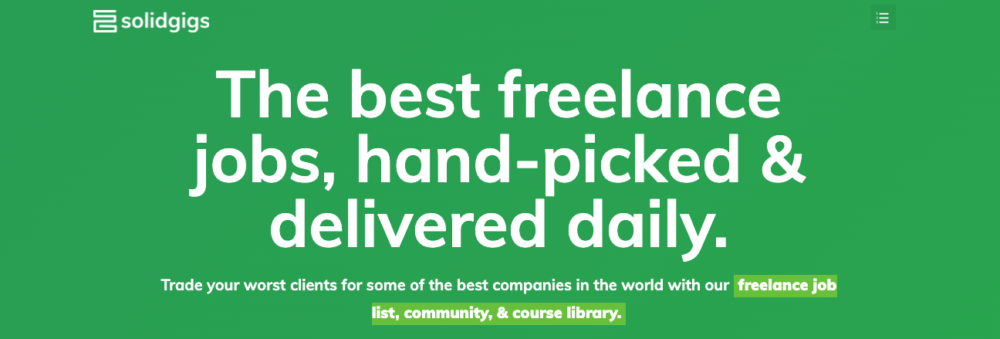
One of the most time-consuming tasks a freelance web developer faces is hunting down new freelance web developer jobs on a regular basis.
If you find yourself spending a lot of time each week hunting down the best dev jobs, then you should take a look at SolidGigs .
It’s not a marketplace or a platform for communicating with clients. Instead, it’s a hand-picked aggregated list of the best freelance jobs posted on dozens of sites around the web, updated every weekday.
Not only that, but they also have courses, scripts, ebooks, and other training to help you pitch and win new clients more frequently.
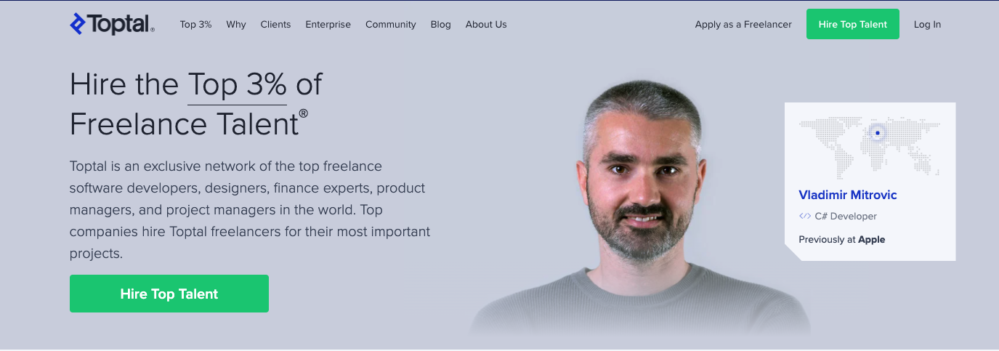
If you’re concerned about getting only high-quality, high-paying clients then you may want to apply to see freelance web developer jobs on TopTal.

I say “apply” because TopTal, as a favor to its clients, only accepts the top 1-2% of freelancers who apply to their platform. This allows them to target higher-paying clients.
While it’s a bit harder to get in, it may be worth it, leading to more lucrative freelance web developer jobs than you might find elsewhere.
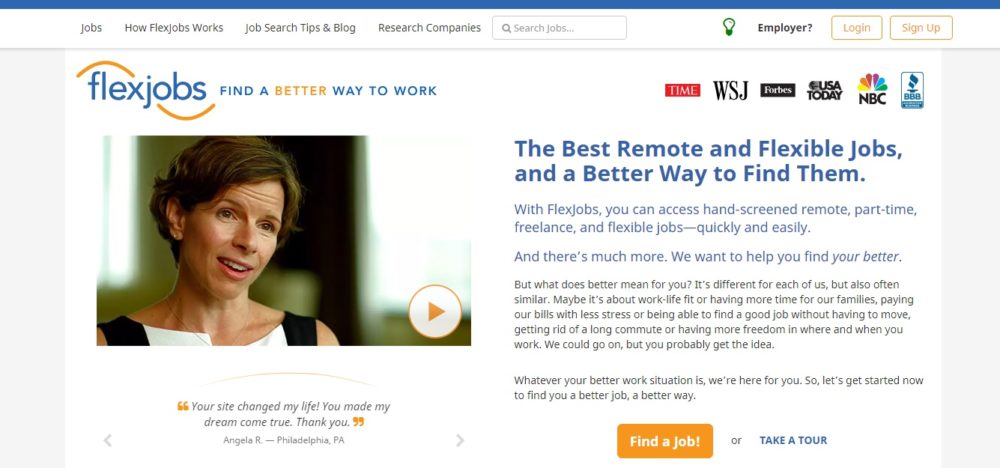
If you’re especially interested in finding freelance web developer jobs that fit your lifestyle, then FlexJobs may be just what you need.
Not only can you sort jobs by specific dev languages using the search functions on the site, you can also filter based on how remote (or not) the jobs are, how many hours they require each week, and so on.
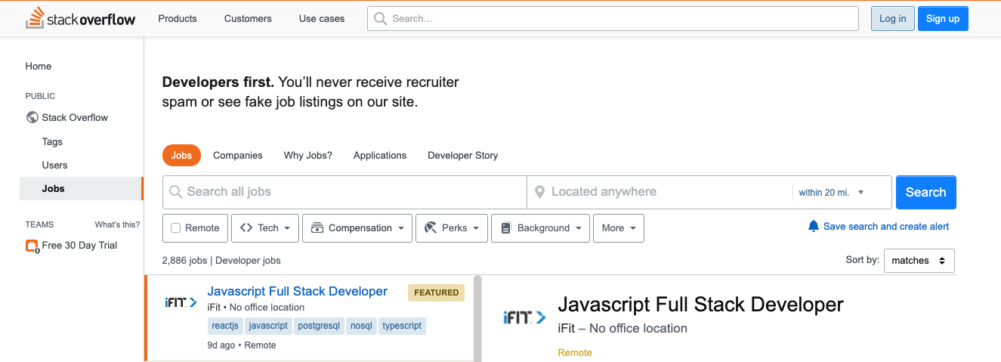
If you’ve been a freelance web developer for long, you’ve probably spent a fair amount of time on Stack Overflow.

You might know it as a helpful community that can help you solve the most obscure coding problems, but did you also know they have a great job board for developers?
It’s called, simply, Stack Overflow Jobs , and it features web dev jobs in just about any specialty you can ask for. You’ll have no problem finding a development job as a freelancer on this job board.

Another nice job board for finding freelance web developer jobs is Authentic Jobs. Their clean interface and simple design help you filter, sort, and find dev jobs quickly.
Plus, they’re used by some pretty big-name silicon valley companies (think Apple and Facebook) so if you find that appealing, there’s a definite upside there.

Reactiflux is a thriving community of 80,000+ React developers where you can learn from top web developers and ask questions to improve as a dev.
In addition, they have an extensive job board where you can explore freelance web developer jobs from countries around the world. You can also sort by companies that assist with work visas (a plus for international web developers) and other unique criteria.
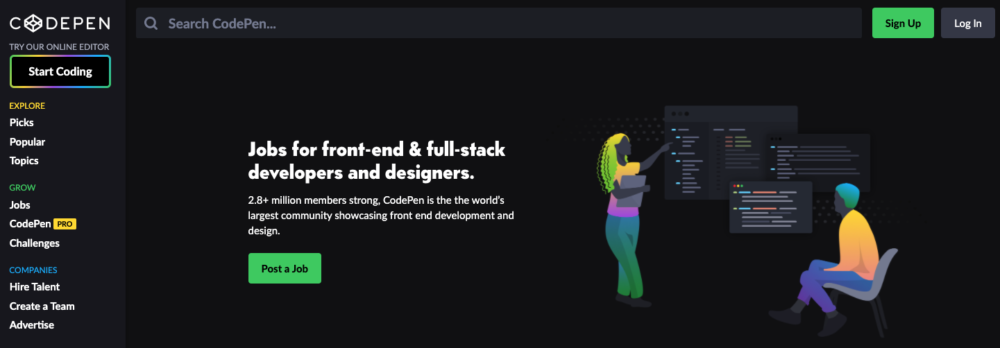
If you work with a lot of front-end code, you may have used or at least heard of CodePen for displaying and testing user-facing code.
In addition to providing a fantastic tool for front-end web developers , CodePen also offers a nice job board featuring freelance web developer jobs. Unfortunately, the jobs aren’t easy to filter like some of the options mentioned previously, so be aware of that before clicking over.
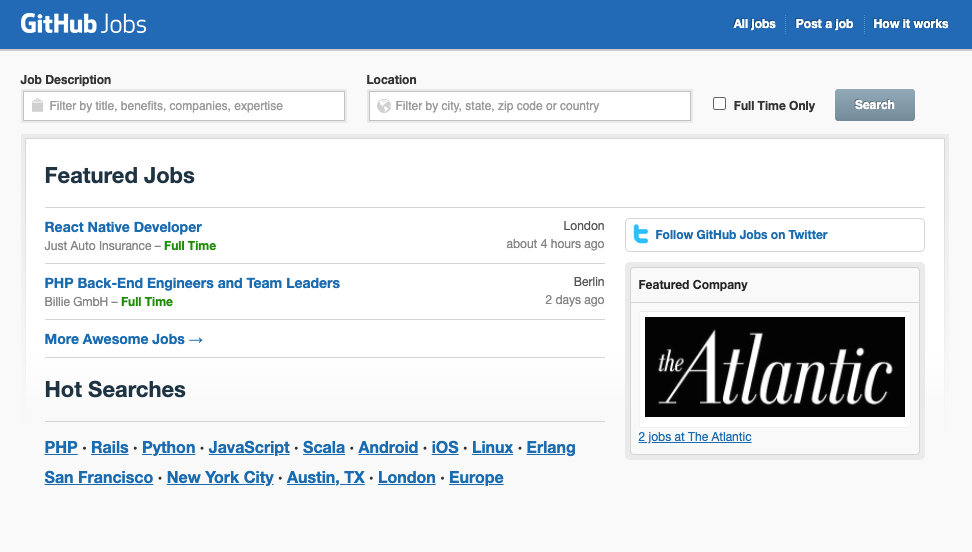
As a web developer, you might also be familiar with GitHub—a resource for software development version control using Git.
While GitHub’s primary purpose is to help manage your ever-changing code, it also has a humble job board where you might just find one of your next freelance web developer jobs.
As a company that specializes primarily in employee/freelancer monitoring, Hubstaff also offers a high-quality job board for web developers and others.
It’s called HubStaff talent and lets freelance web developers (and others) filter available jobs by pay rate, skillset, and other criteria. While the selection is not as broad as some other services on this list, it’s a nice additional site to have in your back pocket when looking for web developer jobs on a regular basis.

While it’s definitely more niched and specialized, Vue Jobs merits a spot on this list strictly for the quality of freelance web developer jobs it provides.
You might be familiar with Vue.js, the open-source javascript framework on which many single-page applications and user interfaces are built. If you’re already proficient in this framework—or have interest in becoming such—the Vue Jobs would be a great place to check regularly for web dev jobs.
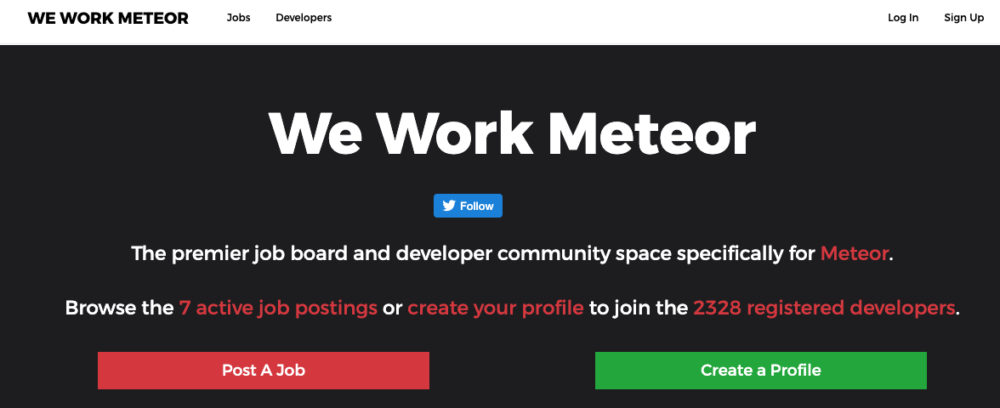
Web developers around the world have come to embrace and enjoy the Meteor javascript framework that allows them to build quick prototypes for cross-platform functionality.
As with the previous site, to find freelance web developer jobs on We Work Meteor , you have to—naturally—have the ability to work within the Meteor framework.
Still, it’s a nice job list worthy of bookmarking and checking back with regularly.
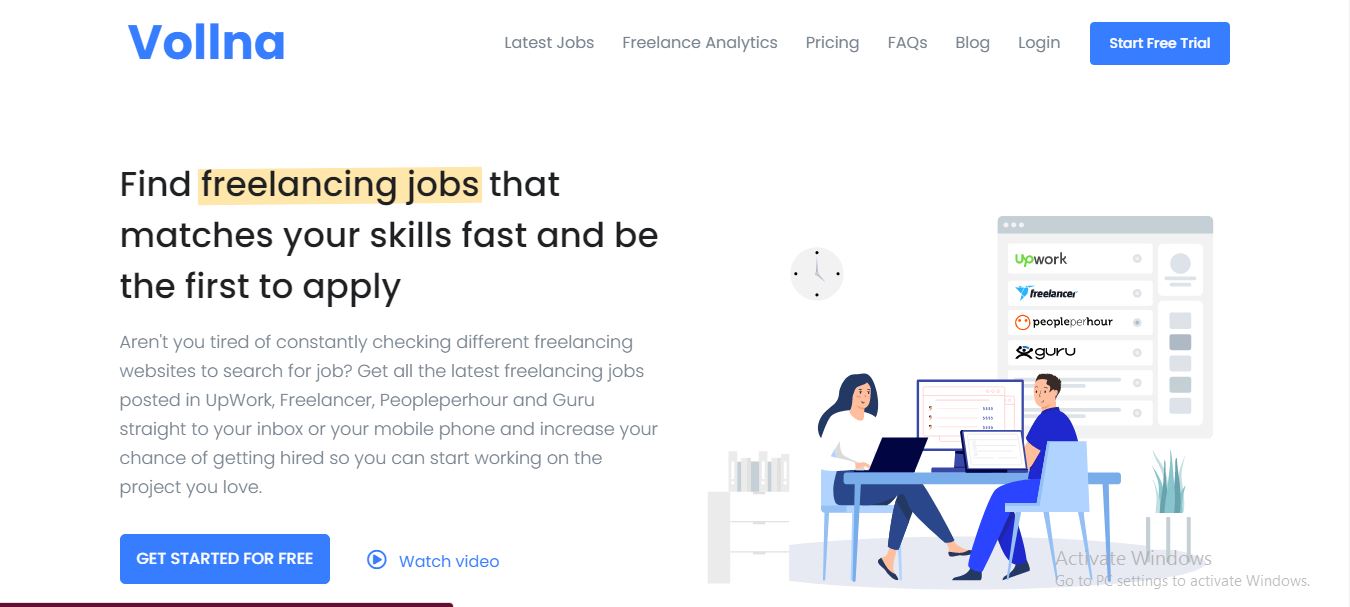
Are you tired of constantly checking different freelancing websites to search for jobs? Do you want to maximize your job searching and get more opportunities? Then, look no further. Vollna crawls the best websites 24/7 to get the best job listings specifically tailored to your freelance business.
With Vollna, you get all the latest freelancing jobs posted on freelance platforms such as UpWork, Freelancer, Peopleperhour, etc straight to your inbox or your mobile phone.
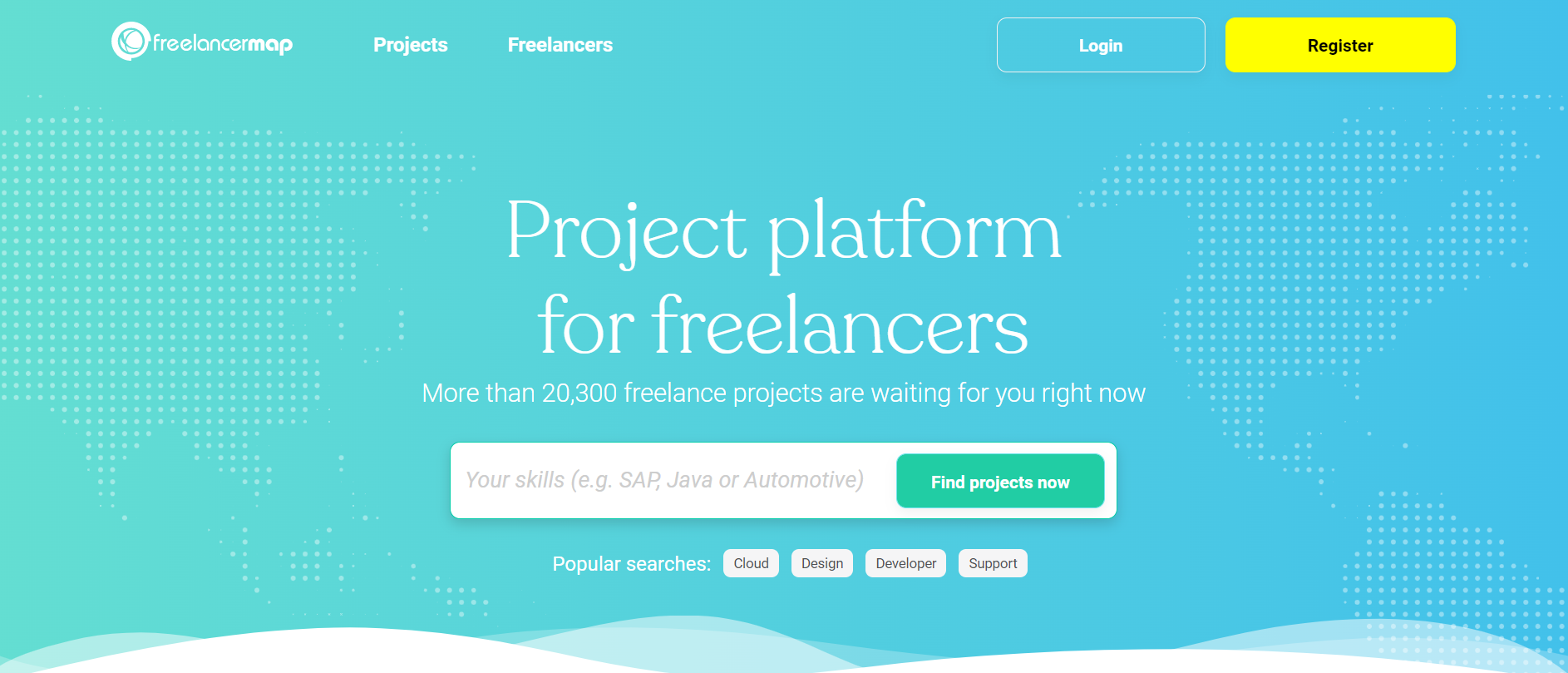
Are you interested in getting new dev clients without paying commissions for every project?
As users of FreelancerMap, freelancers get 100% of what they agreed on with their clients. The platform includes on-site and remote projects, and has over 250.000+ users worldwide. You can create a free profile and job alerts to get notified about projects that match your skill set and interests the best.
Premium features such as improved profile, visual portfolio, better rankings, unlimited applications, job alerts and profile statistics are also available for an affordable monthly fee.
Of course, knowing where to find freelance web dev jobs is just the beginning if you want to build your freelance web development business.
From there, you have to successfully identify the best potential clients and projects, pitch them your services, win the account, deliver a stellar product, invoice, get paid, and manage all the small details in between.
It’s no small task.
But to help you get off on the right foot, I’d like to suggest a few critical tips for pitching and winning freelance web developer jobs once you’ve found them using the list above.
Here are a few tips for winning freelance web developer jobs:
1. Focus only on the web dev jobs you actually want
It can be tempting to apply for or pitch to clients with freelance web developer jobs of all kinds just to get some business in the door.
This is particularly true if you’re a new freelance web developer and are in desperate need of new freelance clients .
Instead of applying widely to any dev jobs you see, focus instead on the ones you’re especially qualified for and interested in.
Not only will the hard work of pitching, applying, and selling yourself come much more easily (because you’ll be excited about getting the dev client) but you’ll also have a better close rate (success rate) because you’ll be more qualified.
This in turn, keeps you from burning out and helps you remain excited about pursuing more freelance web developer jobs.
2. Don’t just apply; pitch & sell
May freelance web developer jobs you’ll find on these job sites will request that you fill out an application form.
While that’s all fine—and probably worth your time—you’ll find your efforts are far more fruitful if you go above and beyond the typical application.
In many cases, it’s possible hundreds of freelance web developers are applying to the same job through the same application and therefore, none of them are standing out to the potential client.
However, if you make the effort to track down the email address or phone number of the prospect and make genuine human contact, your chances of landing the freelance web developer jobs you want go up dramatically.
If you’re not sure how to pitch yourself, there are lots of freelancing courses you can take to level up your pitching and selling skills.
3. Follow up (a lot)
What many freelancers don’t realize is that the majority of deals you’ll close with clients do not happen after you make first contact.
Most deals happen only after friendly and persistent follow-up.
Why is this? Because, even though they are hiring for a job, many clients are terribly busy. In fact, that’s most likely the reason they’re posting freelance web developer jobs in the first place—they simply don’t have any more hours in the day to tackle certain problems.
For every application, you fill out or every first email or phone call you to make, set a time in your calendar a few days (or a week) later to follow up in a natural and friendly way with that prospect.
4. Never stop finding new dev jobs
After you find a bit of success and have some nice freelance jobs moving along, it can be a real temptation to stop looking for new jobs.
Even if it’s not a conscious effort, sometimes the sheer workload from the newly closed dev jobs on your plate can take up so much time you forget to keep looking.
Before you know it, you’ve fallen prey to the infamous “ feast or famine cycle ” that haunts so many freelancers.
But the smart freelancer knows you should never stop prospecting. Building systems (it can be as simple as a calendar reminder) into your business that will help you keep on track and never stop looking for freelance web developer jobs.
Using some of the sites I’ve mentioned above and harnessing the tips I’ve shared below them, you should have no problem finding high-quality web developer jobs on a regular basis.
Remember: find a few sites that resonate with you, check back regularly, pitch well, never stop looking, and you’ll do just fine.
Keep the conversation going...
Over 10,000 of us are having daily conversations over in our free Facebook group and we'd love to see you there. Join us!
Freelancing Growth

Written by Preston Lee
Editor at millo.co.
Preston Lee is the founder of Millo where he and his team have been helping freelancers thrive for over a decade. His advice has been featured by Entrepreneur , Inc , Forbes , Adobe, and many more.
Preston's Articles
At Millo, we strive to publish only the best, most trustworthy and reliable content for freelancers. You can learn more by reviewing our editorial policy .
Remote Developer Jobs – Work From Home
... career. Whether you need full-time, part-time, or freelance work or aspire to work from anywhere, online developer jobs offer diverse options. Work from home developers research, design, code, and deploy software, apps, websites, and other programs. These virtual developer jobs require proficiency in coding languages and database technologies and strong communication skills. Check out the latest remote developer jobs and companies hiring!"}" data-sheets-userformat="{"2":769,"3":{"1":0},"11":4,"12":0}">Discover the flexibility of remote developer jobs, an in-demand work from home career. Whether you need full-time, part-time, or freelance work or aspire to work from anywhere, online developer jobs offer diverse options. Work from home developers research, design, code, and deploy software, apps, websites, and other programs. These virtual developer jobs require proficiency in coding languages and database technologies and strong communication skills. Check out the latest remote developer jobs and companies hiring!
Discover the flexibility of remote developer jobs, an in-demand work from home career. Whether you need full-time, part-time, or freelance work or aspire to work from anywhere, online developer jobs offer diverse options. Work from home developers research, design, code, and deploy software, apps, websites, and other programs. These virtual developer jobs require proficiency in coding languages and database technologies and strong communication skills. Check out the latest remote developer jobs and companies hiring!
Full-time Part-time Freelance Entry-level High-paying International
All Back-End Front-End Full-Stack Ruby on Rails
See all Remote Jobs >

Software Engineer, Backend Engineering (Portfolio Management) 10 hours ago
Human Interest | Full-time
[Senior/Staff] Software Engineer, Backend 10 hours ago
Machinify | Full-time
Senior Frontend Engineer 10 hours ago
Accompany Health | Full-time

Experienced Software Engineer - Frontend Engineer 10 hours ago
Plaid | Full-time

Sr. Software Engineer, Frontend 10 hours ago
Hims & Hers Health, Inc. | Full-time

Data Scientist 3 days ago
Sun Life Financial | Full-time | High-paying

Software Development Engineer II - Backend 3 days ago
HackerRank | Full-time

Senior Software Engineer, Backend 3 days ago
Evolve | Full-time

Senior Frontend Software Engineer 3 days ago
Hungryroot | Full-time

Senior Frontend Engineer - Grafana Oncall (Remote, Brazil) 3 days ago
Grafana Labs | Full-time | International
Full Stack Engineer 5 days ago
SpreeAI Corporation | Full-time

Junior Full Stack Developer (SharePoint) 5 days ago
ManTech | Entry-level | Full-time
Senior Full-Stack Developer 5 days ago
GivingData | Full-time

Full-Stack Developer 5 days ago
Alpine Home Air Products | Full-time

Backoffice Fullstack Engineer 5 days ago
Vendr | Full-time

Senior Contributor Success Fullstack Engineer 5 days ago
GitLab | Full-time

Sr. Ruby on Rails Developer, PinSeeker 5 days ago
Vista Outdoor | Full-time

Frontend Developer 1 week ago
Sporty Group | Full-time | International

Senior Software Engineer | Frontend 1 week ago
Ramp Business Corporation | Full-time

Engineering Manager, Backend 1 week ago
Affirm | Full-time
Sr. Software Engineer, Backend (Platform) 1 week ago

Backend Engineer 1 week ago
Udacity | Full-time

Senior React & React Native Developer 2 weeks ago
Lemon.io | Freelance | International

Senior Backend Engineer - Activation 2 weeks ago
Virta Health | Full-time | High-paying

Senior Backend Engineer, Developer Platform 2 weeks ago
Webflow | Full-time | International

Senior Software Engineer, Frontend 2 weeks ago
TRM Labs | Full-time

Senior Backend Engineer, Customer Experience 2 weeks ago
Included Health | Full-time | High-paying

Senior Software Engineer (Ruby on Rails) 3 weeks ago
Clario Technology | Full-time | International

Full Stack Engineer (Ruby/Go) 3 weeks ago
Mitratech | Full-time
Senior React & React Native Developer 3 weeks ago

Senior Backend Engineer 3 weeks ago
Alma Mental Health Care | Full-time | High-paying

Front End Engineer 3 weeks ago
Halcyon Technologies | Full-time | High-paying

Back End Engineer - Secret 3 weeks ago
Xcelerate Solutions | Full-time

Senior QA Game Tester 3 weeks ago
Magic Media & Entertainment Group | International

Mid-level Webflow Frontend Engineer 3 weeks ago
Outliant | Full-time | International

Sr. Software Engineer 3 weeks ago
Tackle.io | Full-time

Engineering Manager (Frontend) 3 weeks ago
Torch Leadership Labs | Full-time | High-paying
Software Engineer 3 weeks ago
Tackle.io | Entry-level | Full-time | High-paying

Senior Full-stack Engineer 3 weeks ago
Relocity | Full-time

Senior Software Engineer, Backend 3 weeks ago
Transcarent | Full-time

Software Engineer, Frontend Platform 3 weeks ago
Vercel | Full-time | High-paying

Senior Full-Stack Ruby on Rails Engineer 3 weeks ago
Blue Sky eLearn | Full-time

Senior Fullstack Engineer 4 weeks ago
Whitespectre | Full-time

Senior Snowflake Engineer 4 weeks ago
Mathematica, Inc. | Full-time

Backend Software Engineer, Trading Infrastructure 4 weeks ago
SFOX | Full-time

Senior Software Engineer Full Stack 4 weeks ago
Headspace | Full-time

Developer Support Engineer 4 weeks ago
Airtable | Full-time | High-paying

Senior Frontend Engineer, Core Engineering 4 weeks ago
Splice Music | Full-time | High-paying
Senior Software Engineer, Full Stack 4 weeks ago

Software Architect (L6) - Global Billing Platform 4 weeks ago
Twilio | Full-time
Browse Related Categories:
Want access to 20,000+ more remote and flexible jobs.
Part-time to full-time, freelance to employee
More Career Fields
50+ flexible job categories
More Resources
Advanced filtering, webinars & more
Learn More About Our Premium Service
Sign Up for Our Weekly Fresh Jobs Newsletter
What types of jobs?
- General
- Technology
Want More Jobs?
Access 20,000+ more remote jobs on flexjobs, more remote jobs.
-Ingrid N., New Baden, IL
Advanced Remote Search Filters
-Ezra O., Oberlin, OH
-Lauren C., Columbus, OH
No thanks No thanks
FlexJobs is our bigger, better version of Remote.co.
Remote Freelance Software Developer Jobs with Top Global Clients
As a freelance Developer, you'll enjoy the freedom to choose your own Software Developer jobs with leading Fortune 500 companies and startups, as well as the flexibility to work remotely on your terms.
Work on freelance jobs with vetted clients.

Hear from freelancers working with Toptal
Work with world-class clients
Why Software Development Choose Toptal
Jobs come to you.
Jobs Come to You
We vet each client opportunity and match you with the job postings that suit your preferences and skills, but you’ll always have the freedom to choose.
Work from Anywhere
With Toptal, you set your own hours, and as long as you have a laptop and some wifi, you’ll enjoy the flexibility to work remotely wherever, and on your own terms.
Get Paid On Time
Get Paid On Time
Set the rate you want and enjoy a steady stream of income without the overhead. We handle all billing and invoicing directly with clients, so you can focus on your remote work engagements.
Work on real projects with vetted clients.
Once you’re in the network, then what?
1. create your profile, 2. choose your projects, 3. work with top clients.
As a new member of the Toptal Community, you’ll set up your talent profile to share your expertise, years of experience, and availability with clients and matchers.
At Toptal, our team of matchers bring deep domain expertise and several years of experience to make sure you’re applying to freelance work that’s the right fit for your skills, interests, and time preferences. You don't need to bid on projects in a race to the bottom. Instead, just apply to job descriptions that meet your criteria.
We’ll help set up billing and payments, and start connecting you to real-time projects with global clients. Our team thoroughly vets each client and job type, and they’re your go-to for questions, advice, and help as you receive job alerts and choose remote jobs in a wide range of domains, from software and mobile app development to social media and ecommerce.
Hear From Our Global Network of Developers
As a React / React Native developer, I'm grateful that Toptal introduces me to excellent clients who understand the process of creating a great user experience. I've been able to build friendships with clients while continually learning and applying new skills in this ever growing field. Toptal is the best starting (and perhaps ending) point for anyone looking to forge their own path. Elijah Windsor Verified Expert in Engineering iOS Developer Expertise in: Angular Bootstrap CSS GitHub HTML5 jQuery
To me, React Native is all about adding possibilities to a domain. It unlocks the ability to utilize legions of JavaScript developers rather than limiting a native project's prospects to strictly iOS devs. Toptal provides a similar opportunity. Instead of restricting yourself to a commute radius, Toptal enables you to work on intriguing projects anywhere on the planet. Jeremy Greer Verified Expert in Engineering JavaScript Developer Expertise in: Angular CSS HTML MongoDB TypeScript Node.js
I've spent a good deal of time learning React and React Native, but finding the work that lets you apply this new knowledge isn't always easy. Through Toptal, finding work with edgy, new-age tech – like React Native – is commonplace. Being able to continually learn new things – and be paid to put it to use on great projects, with great clients – is a golden opportunity. Matthew Keas Verified Expert in Engineering JavaScript Developer Expertise in: AngularJS CSS HTML5 jQuery MongoDB Redux
Leading Brands and Startups Working With Toptal
and 1000s more
Real Software Development Jobs From Our Network
Remote react native developer job for an ios app (full-time).
You will join a small team of developers in building a React Native application, including any widgets or libraries necessary inside React Native itself and sufficient test coverage to provide a reasonable safety net. You must at least have strong experience with React.js and either Android or iOS.
Additional skills for this React Native job:
Project Information:
Commitment Type
Estimated Length
Remote React Native Developer Job for Startup (Full-time)
We’re a small, early-stage team working hand-in-hand with our beta clients to create the tools they need from our product. We set lofty goals and use every tool available to grow and move forward. The ideal candidate has deployed an app to the App Store from scratch in React Native.
Remote React Native Developer Job for Technology Startup (Full-time)
We are an early stage startup composed of engineers who are extremely passionate about exploring what’s possible with React Native and learning more about the technology as we push its limits. We’re building an app for both iOS and Android, but will be placing slightly more attention on Android.
Los Angeles
Remote Full-Stack Senior React.js Developer Job for a New Products Initiative (Part-Time)
Consumer Products & Services
We need a seasoned developer with deep expertise in React.js and full stack JavaScript to work directly with our CTO on a new product initiative. The requirements and designs for the product have been completed, and implementation of the functionality and behavior of the application is in progress.
Additional skills for this Full Stack job:
Remote Jenkins Developer Job for Tech Startup (Part-time)
Automotive & Mobility
We are a tech startup revolutionizing the automotive repair industry with just-in-time repair and servicing. We want to hire a Senior Backend Developer to lead design and implementation of microservice systems. The ideal developer will be a team player who can collaborate across teams.
Additional skills for this Jenkins job:
Work with the best.
Frequently Asked Questions
Screening process.
To become a member of the Toptal network, you first need to pass our screening process. There are several steps to our screening process, including showcasing your clear communication and domain expertise, and engaging in a real-world assessment.
The screening process is designed to evaluate your skills and give you a sense of the work we do with our clients. By screening every candidate and vetting every client, we ensure that Toptal maintains top-tier professionals in the network. Once you’ve gone through our screening process, you’ll become the newest member of the Toptal Network, and our team will start connecting you to exciting projects with global clients. Every client in our network understands our screening process, so when you’re picking up new work, you won’t need to do any traditional interviewing.
Each step has a different length, but typically the process will take 2-5 weeks before you’re able to start working with clients. It’s like any other interview process with a company, but the good news is that you’ll only need to do it once.
Toptal generates revenue through direct contracts with clients.
At Toptal, you are free to choose your own rate and find clients that are willing to pay that rate. You don’t need to worry about negotiating or haggling anymore!
No, Toptal does not take a cut from your hourly rate. The rate that you set is the rate that you will receive for every engagement with a client.
At Toptal, we give you the flexibility to work on as many projects and with as many clients as you want, as long as you’re still able to deliver quality work. We give you the freedom to increase or decrease the amount of work at any point.
Great! We have many projects across a wide array of skills. You can find projects for other skills right below or visit our jobs page .
At Toptal, we encourage growth for each and every member of our talent network. We have dedicated tools and processes set up to help you build new skills, so that you can take on projects that are of interest to you. Whether you use our community Slack channel to chat with experts or attend Toptal Academies, you’ll have the tools necessary to improve your existing skills and gain new ones.
Looking for engineering jobs?
- .NET Developer Jobs
- ASP.NET Developer Jobs
- AWS Developer Jobs
- Adobe Experience Manager (Adobe) Developer Jobs
- Magento Developer Jobs
- Algorithm Developer Jobs
- Android Developer Jobs
- Angular Developer Jobs
- Ansible Developer Jobs
- AI Engineer Jobs
- Azure Developer Jobs
- Back-End Developer Jobs
- Big Data Architect Jobs
- BigQuery Developer Jobs
- Blockchain Developer Jobs
- Bluetooth Developer Jobs
- Business Intelligence Developer Jobs
- C Developer Jobs
- C# Developer Jobs
- C++ Developer Jobs
- CSS Developer Jobs
- Clojure Developer Jobs
- Cloud Engineer Jobs
- CodeIgniter Developer Jobs
- Computer Vision Developer Jobs
- Dart Developer Jobs
- Data Analyst Jobs
- Data Engineer Jobs
- Data Scientist Jobs
- DevOps Engineer Jobs
- Django Developer Jobs
- Docker Developer Jobs
- Drupal Developer Jobs
- eCommerce Developer Jobs
- ETL Developer Jobs
- Elasticsearch Developer Jobs
- Elixir Developer Jobs
- Ember.js Developer Jobs
- Ethereum Developer Jobs
- Excel Developer Jobs
- Firebase Developer Jobs
- Flutter Developer Jobs
- Front-End Developer Jobs
- Full-Stack Developer Jobs
- GIS Developer Jobs
- Go Engineer Jobs
- Google API Developer Jobs
- Google Cloud Developer Jobs
- GraphQL Developer Jobs
- HTML5 Developer Jobs
- Hadoop Developer Jobs
- Ionic Developer Jobs
- Java Developer Jobs
- JavaScript Developer Jobs
- Jenkins Developer Jobs
- Jupyter Developer Jobs
- Kotlin Developer Jobs
- Kubernetes Expert Jobs
- LAMP Developer Jobs
- Laravel Developer Jobs
- MacOS Developer Jobs
- Machine Learning Engineer Jobs
- Meteor Developer Jobs
- Microsoft Access Developer Jobs
- Microsoft Dynamics CRM Developer Jobs
- Mobile App Developer Jobs
- MongoDB Developer Jobs
- Moodle Developer Jobs
- NLP Developer Jobs
- NoSQL Developer Jobs
- Node.js Developer Jobs
- OpenGL Developer Jobs
- PHP Developer Jobs
- PL/SQL Developer Jobs
- Pandas Developer Jobs
- Perl Developer Jobs
- Python Developer Jobs
- QA Engineer Jobs
- QA Tester Jobs
- R Developer Jobs
- React Native Developer Jobs
- React.js Developer Jobs
- Redshift Developer Jobs
- Ruby Developer Jobs
- Ruby on Rails Developer Jobs
- SQL Developer Jobs
- Salesforce Developer Jobs
- Salesforce Commerce Cloud Developer Jobs
- Scala Developer Jobs
- SharePoint Developer Jobs
- Shopify Developer Jobs
- Site Reliability Engineering Jobs
- Software Architect Jobs
- Software Developer Jobs
- Solidity Developer Jobs
- Swift Developer Jobs
- Symfony Developer Jobs
- Sys Admin Jobs
- System Security Developer Jobs
- TIBCO Developer Jobs
- Tableau Developer Jobs
- TensorFlow Developer Jobs
- Terraform Developer Jobs
- Unity or Unity3D Developer Jobs
- Unreal Engine Developer Jobs
- Visual Basic Developer Jobs
- Vue.js Developer Jobs
- Web Developer Jobs
- WebSphere Developer Jobs
- WordPress Developer Jobs
- Xamarin Developer Jobs
- Xero Developer Jobs
- iOS Developer Jobs
Looking for design jobs?
- Animation Designer Jobs
- B2B Designer Jobs
- Brand Designer Jobs
- Chatbot Designer Jobs
- Dashboard Designer Jobs
- Data Visualization Designer Jobs
- Digital Product Designer Jobs
- E-Commerce Website Designer Jobs
- Game Designer Jobs
- Illustrator Jobs
- Information Architecture Expert Jobs
- Landing Page Designer Jobs
- Mobile App Designer Jobs
- Mobile UX Designer Jobs
- Presentation Designer Jobs
- Product Designer Jobs
- Prototyping Expert Jobs
- Shopify Designer Jobs
- Tableau Designer Jobs
- Typography Specialist Jobs
- UI Designer Jobs
- UI/UX Designer Jobs
- UX Designer Jobs
- User Experience Researcher Jobs
- Virtual Reality Designer Jobs
- Visual Designer Jobs
- Web Designer Jobs
- Web Application Designer Jobs
- WordPress Designer Jobs
Looking for project management jobs?
- Agile Project Manager Jobs
- Business Delivery Manager Jobs
- Client Delivery Manager Jobs
- Enterprise Project Management Consultant Jobs
- JIRA Administrator Jobs
- PMO Specialist Jobs
- Freelance Project Manager Jobs
- Scrum Master Jobs
- Service Delivery Manager/Service Delivery Project Manager Jobs
- Technical Project Manager Jobs
- Blockchain Project Manager Jobs
- Digital Project Manager Jobs
- Program Manager Jobs
Looking for product management jobs?
- Agile Product Manager Jobs
- B2B Product Manager Jobs
- Blockchain Product Manager Jobs
- Data Science Product Manager Jobs
- eCommerce Product Manager Jobs
- Product Management Consultant Jobs
- SaaS Product Manager Jobs
- Salesforce Product Manager Jobs
- Product Owner Jobs
Looking for other jobs?
- Interim CFO Jobs
Join the Toptal community.
Find Freelance Web Developers Jobs
Browse 199 web development jobs online, guru helps you connect with quality employers to find freelance jobs that match your skills..
$250 Million
- Top-Rated Freelancers
Top Web Development Freelancing Jobs
Posted Jul 14 | Send before Aug 13
Real Estate Word Press Website
Fixed Price | $250-$500
Just want front page created, and one link going to another website contact page, my Facebook link..
- Web Development
Short Video, Reel, Story Creator/Editor
Hourly | $5 - $10
Hi, looking for someone who can create and/or edit short videos for Instagram and our website. Eit..
- Video Production
Build/Host System to Manage Clients
Fixed Price | Not Sure
A system is needed that will be used to manage clients, customers of clients, memberships, product..
Posted Jul 14 | Send before Aug 12
Creative Graphic Designer
Fixed Price | Under $250
-Hi there! I’m David, a WordPress web developer, and I need a creative graphic designer to create ..
Typescript Solana Bot
This is a long term project leading to long term engagement for future upgrades. Looking for exper..
3 Databases - Demographics and Surnames
Hello I am looking for an expert that can help me create three (3) web based Population Demographi..
3D Movie Creator for Golf Training Aid
3D Movie Creator for Golf Training Aid Demonstration We are looking for a skilled 3D animator to c..
- 3D Animation
Demand Side Platform
Fixed Price | $1k-$2.5k
I am in need of a Demand Side Platform (DSP) for my business. The primary function of this platfor..
- Website Traffic
191 More Web Development Projects
Want to work as a verified Freelancer?
Create Your Profile
Looking for jobs that match your skills?
How guru can help you find web development work.
Guru.com is the leading online space for Web Development freelancers to find work posted by employers, manage projects and get paid. Simply create your profile and define the services you want to offer for hire. Employers will find you by these services when they search for freelancers. You can also search and apply for Web Developers jobs that interest you. Once you start working on a project, you can keep your job on track and collaborate using the Work Room. Guru gives you tools to define milestones, set tasks, communicate with employers, share files, and agree upon payment schedules. Even if you work with an employer on the other side of the world, your payment is secure using SafePay. The employer pays us before the work begins. As approved milestones are reached and the employer approves the work, we pay you. It’s a “win-win” arrangement for both sides!
Why Over 2 Million Freelancers Choose Us
Endless opportunities.
Find freelance jobs online that match your specific skills. Create a profile on Guru highlighting your portfolio and services to attract potential Employers.
We have the lowest job fee in the market, allowing you to keep more of your hard-earned money.
Flexibility
Work the way you want on our platform. Choose how you get paid for your work - fixed price, hourly, task-based, or recurring.
We offer SafePay payment protection to ensure every transaction is secure.
Our dedicated support team works 24/7 to resolve all of your queries over the phone or email, no matter where you are located.
Credibility
With All-Time Transaction Data and ID Verification, we enable you to show your credibility and win the trust of potential Employers.
How Guru Works
Create profile.
Showcase your skills and highlight the services you offer.
Search and apply for jobs that match your skills and services on one of the best websites to find freelance work.
Manage Jobs
Use WorkRooms to work efficiently, collaborate with team members, and communicate with Employers.
Get paid for the work you do in a timely manner through our secure payment system.
See How Guru Works
People Also Search For
- Web Designers Jobs
- SQL Developers Jobs
- Java Programmers Jobs
- jQuery Developers Jobs
- HTML5 Programmers Jobs
- Programmers Jobs
- Mobile App Developers Jobs
- C# Programmers Jobs
- C Programmers Jobs
- Dot Net Developers Jobs
- ASP Developers Jobs
- Managers Jobs
- Ajax Programmers Jobs
- ASP.NET Programmers Jobs
- Responsive Web Designers Jobs
- Python Programmers Jobs
- Front End Developers Jobs
- Microsoft SQL Server Managers Jobs
- C++ Programmers Jobs
- XML Developers Jobs
Browse Jobs Related to Web Developers
- E-Commerce Experts Jobs
- CMS (Content Management System) Experts Jobs
- API Developers Jobs
- Web Graphics Designers Jobs
- Landing Page Designers Jobs
- WordPress Developers Jobs
- XHTML Developers Jobs
- Conversion Optimization Services Jobs
- Elementor Designers Jobs
- Icon Designers Jobs
- Web Portal Developers Jobs
- Ecommerce Web Designers Jobs
- Shopping Carts Developers Jobs
- Home Page Designers Jobs
- Webflow Developers Jobs
- Slider Designers Jobs
Find Jobs by Category
- Programming & Development
- Design & Art
- Writing & Translation
- Administrative & Secretarial
- Sales & Marketing
- Business & Finance
- Engineering & Architecture
- Education & Training
Browse More on Guru
By Location
Search for Jobs by Skill
Where to Find Freelance Web Development Jobs (All Skill Levels)

updated Apr 17, 2024
So you’re wondering where to find freelance web development jobs right now to increase your earnings and grow your network of clients this year?
If you’re a freelancer web developer (or soon to be one), chances are that you need more clients.
Finding freelance work online has never been easier than right now. There’s a plethora of job boards and websites that list thousands of lucrative freelance projects.
But online job platforms aren’t always the perfect place to look. With tough competition and low earnings potential, how do you go about finding the perfect freelance web dev jobs for you ?
How can you make sure you reach the right client who wants to hire you over other freelancers?
Maybe you’re looking to land a freelance web development job on Upwork and haven’t got very far. Or maybe you’ve taken a break from freelancing and want to break into the scene again.
Whatever your skill level is, you’re in the right place. In today’s post, Tim Noetzel is going to walk you through a few smart steps to figure out where to find the best freelance web development jobs for you .
If you need more clients, this is your go-to resource for finding freelance web development jobs faster.
Take it away, Tim!
If you want to become a successful freelance web developer , you’re going to need to find clients.
And while there are plenty of ways to market your services, some methods are far more effective than others.
So where should you start?
Use the Right Channels For Your Skill Level
Not all clients are created equal.
Some clients have complex needs and six figure budgets. They’re looking for experts, and they’re highly selective.
But even if you’re a novice developer who’s just getting started, there are clients out there looking for somebody with your skills! If you can create a basic website or help somebody set up their Shopify theme, you can start freelancing.
The key is to remember that, while both types of clients are valid targets, they look for freelancers in different places.
So it’s important to evaluate your skill set and decide which types of clients you can best serve before you start looking for jobs.

Finding Freelance Web Developer Work: 3 Skill Levels
The secret to finding and landing freelance web developer jobs is to focus on the right channels. Whether you are a beginner freelancer or have years of experience under your belt, it all boils down to this:
The only way to reach your ideal client is to figure out where they are looking for freelancers like you.
To help you find the right type of freelance web developer work faster, let’s look at where you should be looking for clients next.
I’ll cover three powerful job channels for different freelancer experience levels:
- Beginner-level freelancers
- Intermediate level freelancers
- Experienced freelancers
Let’s get started!
1: Beginner-Level Freelance Jobs
If you’re new to programming and freelancing, sites like UpWork or Freelancer.com are worth considering.
They’ve put the sales and marketing process on rails, so it’s relatively easy to land small, short-term gigs like making minor edits to a website or building a simple landing page. All you need to do is create a profile on Upwork .
Be prepared for the way these sites work, though. Because anyone can join, everybody does. That means you may need to submit dozens of proposals before you land a gig, and those gigs often pay as little as $20 per hour. Many clients on these sites are flaky, so watch out for those who expect the world for minimal budget.
Pros of Freelance Sites:
- Anyone can join
- Easy and free to get started
- Sales and marketing process is predetermined
Cons of Freelance Sites:
- Requires lots of time submitting proposals
- High fees and low hourly rates – (outsourcing your marketing/sales process comes with a cost!)
- Lots of scammy / flaky clients
2: Intermediate-Level Freelance Jobs
If you’re new to freelancing, but not new to programming (or vice versa), consider high-value job boards like We Work Remotely, Wellfound, TopTal, and Storetasker.
These sites typically have more sophisticated clients offering bigger and more engaging projects. As a result, you can expect higher hourly rates, averaging $50+ / hour. While this pricing is certainly better, you’re still just selling your time, meaning you may lose out on extra income that might be tied to high performance in other scenarios.
These job boards are even more competitive than lower-tier sites like UpWork, so expect to send lots of proposals to land a single gig and potentially go through a more formal interview process similar to applying for a full-time job.
Unlike lower-tier freelance sites, there are far more long-term gigs, including full-time and half-time arrangements. While these arrangements may be beneficial to some, they can lead to peaks and valleys in your business because it’s more challenging to stagger when clients start.
Pros of High-Value Job Boards:
- Higher hourly rates than sites like UpWork
- More interesting / complex work
- Intuitive Sales Approach (sends lots of proposals)
Cons of High-Value Job Boards:
- Still just “selling your time”
- Companies may require more formal interview/hiring process
- Still requires sending lots of proposals – Much lower close rates than referrals
- Gigs are often half- or full-time, leading to more peaks and valleys
It’s also worth considering doing subcontracting work for marketing, design, and web development agencies.
These companies often have more work than they can handle, so they’re often looking for freelancers to help support them on various projects. While outsourcing the sales process is beneficial, expect to earn lower rates than you otherwise could (often in the ~$50/hour range), since these agencies are effectively selling your time at a premium and pocketing the difference.
This arrangement may be especially appealing if you dread client management. The agency will typically handle most or all communications with the client, meaning you don’t have to do the difficult work of setting boundaries or scoping projects. That said, avoiding this work means you’ll have little control over the type of work, tools you use, or other factors you may find important.
Pros of Agency Subcontracting:
- Fully outsourced sales process
- Agency manages clients, so you don’t have to
Cons of Agency Subcontracting:
- Artificial limit on how much you can earn
- Little control over type/volume of work

3: Advanced-Level Freelance Jobs
If you’re an experienced freelance web developer or you’re simply looking to build a sustainable, high-paying business, consider taking a more strategic approach to your marketing and sales process.
High-value clients—the kind who pay $150+/hour and offer highly interesting projects—typically don’t use websites to find freelancers. Instead, they hire freelancers almost exclusively through referrals.
But even if you don’t have a huge network, it’s possible to systematically meet the right people and get introductions.
Identify the Hubs
To start, I recommend taking two steps:
- Identify the hubs in your area—coworking spacings, startup accelerators, industry groups, and meetups—and participate.
- Meet other freelancers, particularly those who work in complementary fields like design or marketing.
In both cases, the contacts you make will prove invaluable. Active community members and freelancers are typically the first people high-value clients speak to when looking for a freelance web developer.
I’ve created a free course on exactly how to get referrals, but the key is to build genuine relationships.
If you do so, you’ll find you can quickly get high-value clients without all of the competition and effort required on freelance sites or job boards. In fact, this channel has so little competition that you can achieve close rates as high as 90% if you’ve got your sales process right.
Pros of Referrals:
- Much better opportunities – higher paying / more interesting
- You own your marketing/sales process
- Clients are more open to negotiation / flexible arrangements
- High upside
- Extremely high close rates because you’re not competing against 50+ other freelancers for every gig
Cons of Referrals:
- Some learning curve
- Requires you to be proactive and actually talk to people
FAQ: Where can you find freelance web development work?
Some popular websites to find freelance web developer jobs include Upwork , Freelancer , Toptal , and Guru . These websites offer a variety of job postings and allow you to showcase your skills and experience in your profile.
You can increase your chances of finding freelance web developer jobs by being mindful of (1) your own skill level and (2) where to find your ideal client. Also, set up a strong freelancer portfolio website that showcases your skills and experience, networking with other professionals in the industry, and actively applying to job postings that match your skills and interests.
Freelance web developers should have strong coding skills in languages such as HTML, CSS, and JavaScript, as well as experience with popular CMS platforms like WordPress and Drupal. Strong communication skills and the ability to work well with clients are also important.
You can market yourself as a freelance web developer by creating a professional website that showcases your portfolio and experience, leveraging social media to connect with potential clients and showcase your work, and networking with other professionals in the industry.
Your freelance web developer portfolio should match the type of freelance work you’re looking for. If you want to work for small businesses in your area, set up a portfolio that showcases relevant work samples for that clientele. Include examples of your work that demonstrate your coding skills, design abilities, and problem-solving capabilities. You should also include information about the projects you have worked on, the technologies you have used, and the results you have achieved.
Having a niche as a freelance web developer can help you stand out from the competition and attract clients who are specifically looking for your unique skills and expertise. However, it is not essential and many successful freelance web developers work across a variety of industries and projects.
Rates for freelance web developers can vary depending on factors such as experience, skills, and location. It is important to research industry standards and to consider the value you are providing to clients when setting your rates.
Building long-term relationships with clients as a freelance web developer requires open communication, delivering high-quality work, and being responsive to their needs and feedback. You can also provide value by offering ongoing support and maintenance for their websites.
Whether you specialize in front-end or back-end development as a freelance web developer depends on your interests and skills. Both front-end and back-end development are important components of web development, and many freelance web developers have experience in both areas.
Staying up-to-date with the latest web development trends and technologies requires ongoing learning and professional development. You can stay informed by reading industry publications, attending conferences and workshops, and taking online courses and tutorials .

Summing it up: Where to find freelance web development jobs
So what’s the best way to find freelance web development work that matches your skill level?
Let’s summarize today’s main takeaways real quick:
- Be mindful of your skill level: Only apply for jobs you can finish. If you’re a beginner, remember that you’re still learning!
- Use the right channels: Different clients use different platforms. Figure out where your target clientele hangs out.
- Beginner-level freelance jobs: If you’re new to programming and freelancing, sites like UpWork or Freelancer.com are worth considering.
- Intermediate-level freelance jobs: If you have some experience under your belt already, consider high-value job boards like We Work Remotely, Wellfound, TopTal, and Storetasker.
- Advanced-level freelance jobs: For high-budget jobs, aim at landing jobs through referrals. Grow your network by participating in industry events and connecting with other freelancers.
Remember: it all boils down to relevance . Know what you can do with your skills, and look for clients and jobs that match your skill set.
Try both online and offline channels, stay persistent, and make sure you set up a professional-looking portfolio to showcase your best work samples to potential clients.
For more details, check out this full guide on how to become a freelance web developer .
About the author
Tim Noetzel is a freelance web developer based in Boston, MA. He also coaches freelancers on how to build high-revenue businesses at FreelanceGPS.com .
Share this post with others:
About mikke.

Hi, I’m Mikke! I’m a blogger, freelance web developer, and online business nerd. Join me here on MikkeGoes.com to learn how to code for free , build a professional portfolio website , launch a tech side hustle , and make money coding . When I’m not blogging, you will find me sipping strong coffee and biking around town in Berlin. Learn how I taught myself tech skills and became a web dev entrepreneur here . And come say hi on Twitter !
Leave a reply:
Download 15 tips for learning how to code:.
GET THE TIPS NOW
Sign up now to get my free guide to teach yourself how to code from scratch. If you are interested in learning tech skills, these tips are perfect for getting started faster.


Web Development: Home Freelance
$15-25 usd / hour, about the project, place your bid, benefits of bidding on freelancer.

About the client

Client Verification
Similar jobs.

How I Went from Management to Freelance Web Developer in 1.5 Years

- Share article on Twitter
- Share article on Facebook
- Share article on LinkedIn
Learning to code so that you can land a job in tech can feel daunting. That’s why we’re sharing inspiring stories from Codecademy’s community — to show how people like you (yes, you!) can embark on a learning journey and end up with a totally new career. We hope these stories serve as a reminder that there’s no single path to a more fulfilling work life.
Today’s story is from Cambria Sullivan, a 36-year-old Freelance Web Developer living in Seattle, Washington. Read more stories from Codecademy learners here — and be sure to share your story here .
Why I chose to learn to code
“In early 2023, I was working for a transit agency in a management position, and I felt like I needed a change in life. I had a friend who, like me, went to college for anthropology. He went back to school and got a degree in web design. I reconnected with him, and he got me interested in Codecademy.
I started using Codecademy, but it wasn’t my first foray into coding. As a kid, I had dabbled in basic Perl and PHP , and I had taken a Python course through the University of Michigan. I started with front-end engineering. I slogged through HTML and CSS because they weren’t very challenging and felt like something you just had to do. But when I got to JavaScript and started writing code that actually did something, it felt magical. I feel like coding is the closest thing we have to magic in the real world — entering these arcane glyphs into a machine to make it think. It felt very powerful.”
Learn something new for free
Learn javascript.
- Learn React

How I made time to learn
“Coding became the thing that got me out of bed in the morning. I would go to my job and then come home and learn to code. It really spoke to me on a deep level. As pieces started coming together, I realized it was the first thing I’d ever done where I felt I could stick with it and not be miserable at work. My previous job was very boring; it involved sitting in an office, answering phones, and doing a whole lot of nothing. My mind just couldn’t handle that.
So, I took a big leap of faith and quit my job. It felt like a freefall. I decided to drain every account I had and put it all into starting my life over, career-wise. I spent several months living in a city called Pullman, where I did the bulk of my learning. My daily life revolved around the Front-End Engineer track , but I would often get sidetracked by interesting projects and build things on my own . I began to develop some actual proficiency and started to feel like maybe this could work out.”
How I saved up money to switch careers
“As the end of the year approached, I needed to decide whether to renew my lease. By chance, I reconnected with an old friend on Discord. When I told him I was becoming a software developer, he said, ‘Really? That’s what I do now.’ We started talking a lot and decided to become roommates.
We moved to Seattle in December. It was a big adjustment — my environment changed, and I still didn’t have a strong sense of security because I was living off savings. Things got tougher because, after finishing the Front-End Engineering career path, I started applying for jobs but got nowhere.”
How long it took me to land a job
“Initially, I applied for everything — just throwing my resume out everywhere. I realized I needed to critically examine what was going on. I concluded that I probably didn’t have enough substantial work experience on my resume or projects that could substitute for work experience. I had to admit to myself that the certification alone was probably not enough; I needed to actually build some stuff. I had built a website for a friend’s dad, which was for the Audubon Society, but that still wasn’t enough.
I feel like coding is the closest thing we have to magic in the real world.
It was a very frustrating experience. In Seattle, I met numerous other software engineers who got to know me and saw how passionate I was. They did resume reviews and looked at my code, and more or less unanimously said that I was more than ready for a junior position . However, the hiring situation was such a brick wall that I just couldn’t get through.”
How I got in the door
“There were points when I considered giving up because I felt like I had the skills and was confident in my abilities, but I couldn’t get in the front door to convince a single person. I decided I needed something more substantial, so I wrote a JavaScript library . I wanted to kick it up a notch and create something significant.
I wrote the library, and it actually picked up some steam, with other people contributing to it — Michael from Code Crew even contributed. We published it to NPM , and it has been downloaded more than 200 times now . It was exhilarating to have my work actually being used by other developers; it was really cool.
Regarding job opportunities, the two times I got closest were both when a friend directly recommended me.”
How I nailed the interview
“I continued putting out applications and tried various strategies. I wrote cover letters , used AI to get through the AI filtering , and tried just about everything. Finally, what really made a difference was my roommate, who has been a Full-Stack Developer for a company full-time for three years and also does consultancy work on the side. He kept bringing up to one of the companies he consults for that they should interview me. After three or four times, they finally agreed.
I finally got the interview. It was funny because all the DSA [data structures and algorithms] stuff and LeetCode problems I had prepared for weren’t even brought up. The interview was very casual and directly with the CTO of the company. He essentially said that they had heard great things about me and wanted to get to know me more. Mentioning that I wrote a JavaScript library seemed to impress him.”
How I evaluated the offer
“When I finally got the contract, I realized, Oh, this is real. I’m actually going to write code for a real company that will use it . This is a real position and they are paying me to do the work. They sent me a contract, gave me access to the codebase, and told me what they wanted me to do.
I did consider how proud I should be because my roommate and friends are kind of the only reason this is happening. But at the same time, if I didn’t know what I was doing, they wouldn’t waste their time.”
How day one and beyond went
“So far, we have been setting up the runtime environment, which could be a specialization in and of itself. Coming into a codebase that is a little outdated involves a lot of debugging just to get it to build and run. We are finally at a point where we can start actually working on the codebase.
I wasn’t really sure what to expect. But I was amazed at myself — I can read the code, and it just translates into natural language in my head. I look at it and know what it does; it’s not intimidating. I distinctly remember when I couldn’t even write a function and struggled through the most basic stuff. To get to the point where I can see professional-level production code and feel right at home, especially when it’s backend stuff, is very rewarding. It’s just amazing to see how far I’ve come — it’s surreal, actually.”
What I wish I knew before I started learning
“I wish I had known that it would be a very long road, but it would ultimately be very fulfilling and empowering. Tech has always been full of self-motivated people who went against the grain and were considered unusual. I know I fit that mold — I never felt like I fit in many places, but I really feel like I fit in with tech.
There’s still respect for people who just went off and did it on their own. This is a rare professional field that you can truly get into without a formal education , if you put your mind to it. Unlike nursing or plumbing, where formal education is a must, you can become a Software Developer just by learning to do it, if you’re willing to put in the work.”
Learn like Cambria
Front-end engineer, subscribe for news, tips, and more.
Not sure where to start? Check out our personality quiz ! We’ll help you find the best programming language to learn based on your strengths and interests.
Want to share your Codecademy learner story? Drop us a line here . And don’t forget to join the discussions in our community.
Related articles

How Customer Support Jobs Can Kick-Start Your Tech Career
Working in Customer Support gives you a front-row seat to how customers interact with a product (and coding experience isn’t required).

Can You Be a Software Engineer Without Strong Math Skills?
Do you need to know math to become a Software Engineer? For most development projects, basic math is enough, but having a mathematics background can pay off.

How I Went from Civil Engineer to Product Owner in 2 Years
Today’s story is from Jan Osterž, a 35-year-old Product Owner at Allplan Software Engineering Company, living in Slovenia.

Why Database Schemas Are Important & Types to Know About
Data is only as useful as the database it’s stored in. Here are some best practices for designing your own.

4 Reasons to Add Codecademy to Your LinkedIn Education
Update your LinkedIn profile by adding Codecademy.

I Have 20 Years of Web Architect Experience — Here’s What I’m Learning Next
Today’s story is from John King, a 60-year-old Web Architect, living in Austin, Texas.

How I Went from Pharmaceutical Research to Data Analysis in 3 Years
Today’s story is from Mathijs Gaastra, a 34-year-old Web Developer and Data Analyst at a startup in Leiden, Netherlands.
- How to Become a Successful Freelance Web Designer (2024)
Are you burnt out on the 9-to-5 grind? Are you longing for a career with more freedom and better work-life harmony? You might want to consider going freelance as a web designer. Fair warning, though – it’s not a walk in the park. Succeeding as a freelance web pro demands immense hard work, commitment, and skills.
But don’t worry; this post will map out precisely what you need to do to launch your freelance web design business. We’ll cover all the bases – from building the right skill set to selecting the best tools for your business, such as Divi , and landing those first crucial clients with practical and realistic tips.
Let’s get started!
- 1 Why Become a Freelance Web Designer?
- 2.1 Must-Have Skills to Become a Freelance Web Designer
- 2.2 Creating Your Web Design Portfolio
- 2.3 Finding Your First Client as a Freelancer
- 3.1 Best Website Builder: WordPress + Divi
- 3.2 Best Hosting Platform: SiteGround
- 3.3 Best WordPress Plugins
- 3.4 AI Tools to Help with Website Building
- 4.1 Finding and Retaining Web Design Clients
- 4.2 Specializing in a Niche as a Web Developer
- 4.3 Building Additional Revenue Streams
- 5 Becoming a Freelance Web Designer: Got What it Takes?
Why Become a Freelance Web Designer?
Being a freelance web designer offers a fascinating chance worth considering. The flexibility and freedom are attractive—there are no more rigid schedules or overbearing bosses. You get to be your boss, set your hours, and make your own decisions.
In 2024, the rise of no-code and AI tools makes freelance web design even more special. Platforms like WordPress make web design accessible to everyone, even those without deep coding skills. These user-friendly tools allow you to create beautiful, functional websites with simple drag-and-drop features, removing the need for complex programming.
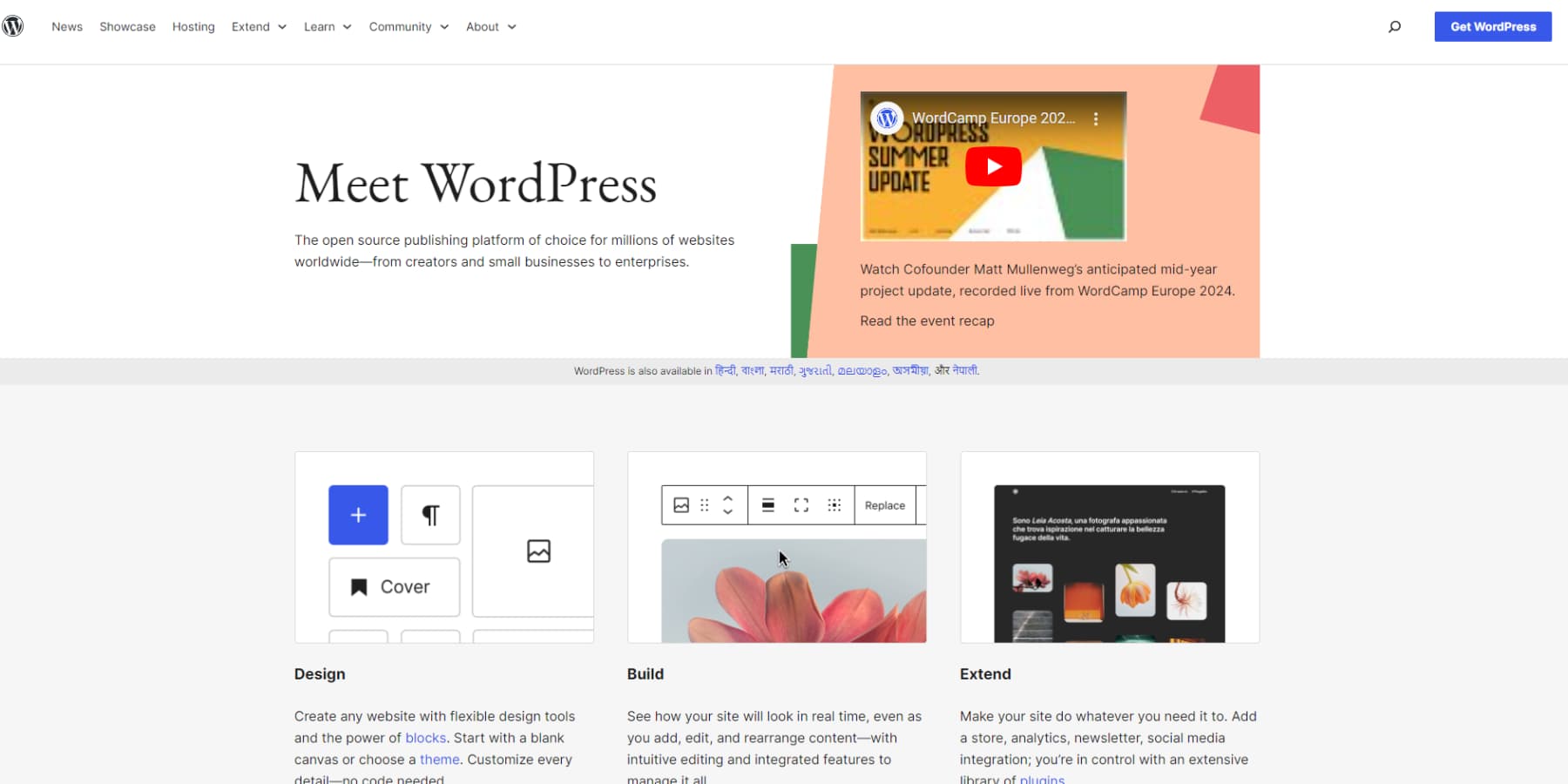
Get Started with WordPress Hosting
Web design is an interesting career option for anyone wanting to start their own business. With a keen eye for design, some creativity, and the drive to work for yourself, freelance web design can be both profitable and fulfilling in today’s digital world.
Combining flexibility, earning potential, and the no-code and AI revolution makes freelance web design an exciting career choice if you’re into a non-traditional and rewarding professional path.
Getting Started as a Freelance Web Designer
Leaping freelance web design can be daunting when learning how to become a freelance web designer. This section will guide you through the initial steps, from learning essential skills to building an online presence and portfolio. With these proper preparation steps, you’ll be ready to launch your freelance web design career.
Must-Have Skills to Become a Freelance Web Designer
Starting a freelance web design career requires various skills, and this section discusses the skills you may need to succeed as a freelance web pro.
Eye for Design & User Experience
One of the most important skills a web designer should have is an eye for design and user experience. A healthy combination of User Interface (UI) and User Experience (UX) helps you create beautiful web experiences.
Although UI and UX differ, they are interlinked. An eye for design and user interface focuses on maintaining a healthy balance in your design and creating appealing aesthetics. This goes pretty broad, from maintaining visual hierarchy to color theory, using whitespace, and more.
UX, on the other hand, focuses on the experience visitors have on a website. The principles of UX design help you focus your design choices around your visitors’ behavior. An example of good UX design is making sure the navigation on the websites you create is seamless and easy to follow. Responsiveness is another crucial part of UX design.
Both UI and UX can be taught through courses, but experience makes the best teacher. The more you do it, the better you get at it. So the more websites you create, the more experienced you become in this area of the web design process.
Coding (HTML, CSS, and JavaScript)
Though not as crucial as it used to be, proficiency in HTML, CSS, and JavaScript is still helpful for web designers. HTML structures content, CSS styles it, and JavaScript adds interactivity. You can learn these skills in many places, from YouTube videos to interactive courses on Udemy , Pluralsight , and Coursera .
You don’t need to master these languages, but basic knowledge of its workaround allows you to build responsive, visually appealing, and dynamic websites tailored to client needs. If you’re not keen on learning, we’ll discuss how you can manage your business without these skills later in the post when we discuss using WordPress to build websites seamlessly!
Prototyping
Prototyping in web design means making interactive mockups or simulations of a website’s layout, navigation, and features. As a freelance web designer, you can prototype to visualize and test your design ideas before developing them.
Creating these interactive prototypes allows you to assess the user experience, functionality, and visual appeal. This step-by-step process helps you refine and polish your designs, ensuring they meet client expectations and you both stay on the same page before doing any actual work. Figma is among the most popular and beloved choices for making prototypes.
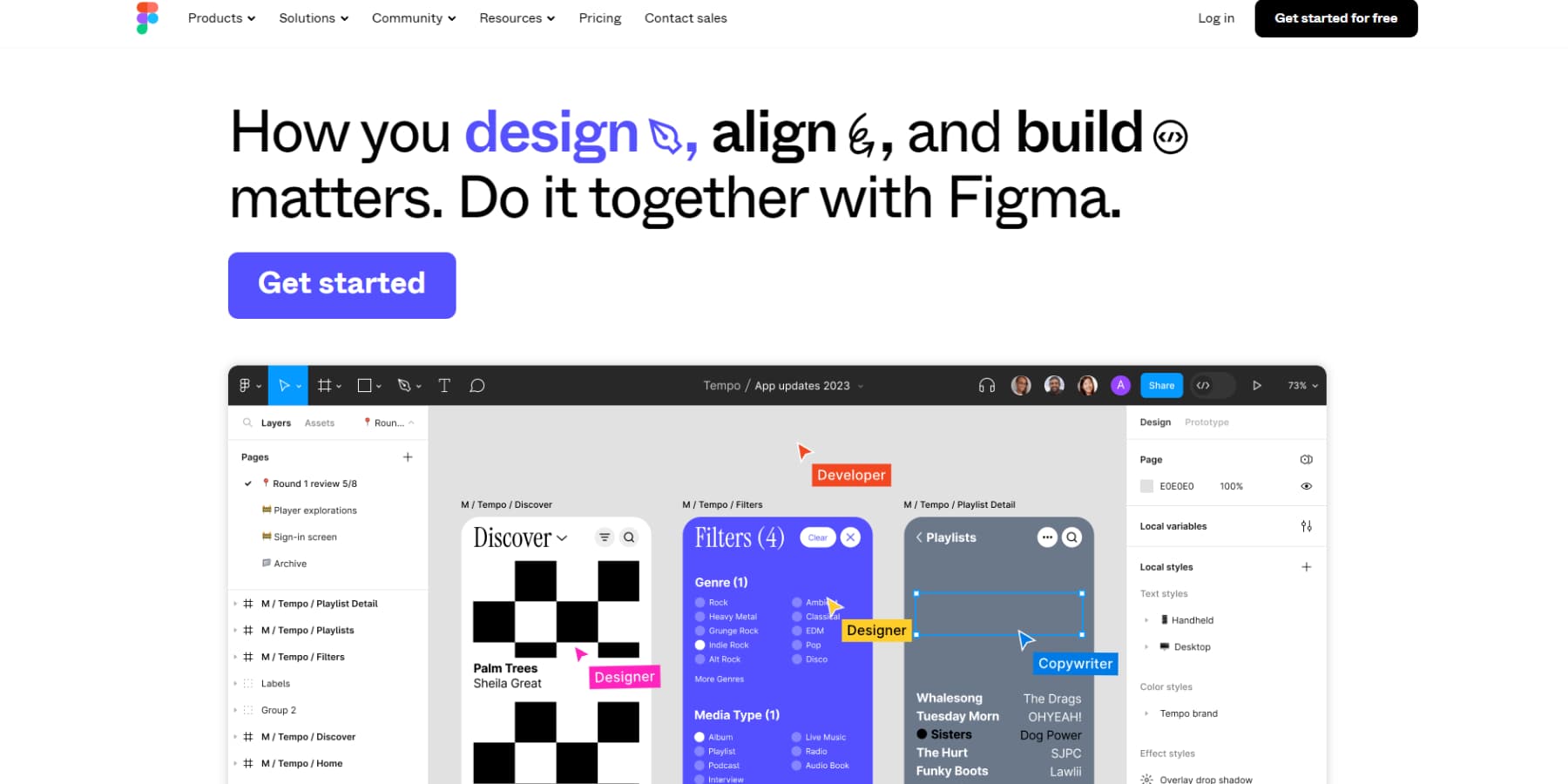
Get Started with Figma
Communication skills.
As a freelance web designer, communication is at the core of your business relationships. Listening attentively to understand clients’ visions and then translating your design concepts into beautiful websites is a skill that requires a lot of time and dedication.
Responding promptly, using simple language, and seeking clarification ensure you understand requirements and clients feel heard. Strong interpersonal skills foster trust and successful collaborations.
If you’re unsure about your skills, it’s 2024, and tools like Sudowrite and Jasper will help you on the communication front! 😉
Creating Your Web Design Portfolio
Your portfolio is crucial for attracting freelance web design clients. It is the first impression you make on potential clients, and as the saying goes, the first impression is most important.
An impressive portfolio demonstrates your expertise, creativity, and commitment to quality results. It proves your abilities to potential clients, improving your chances of getting hired for higher-paying projects. In the competitive 2024 market, a well-crafted portfolio establishes you as a talented, reputable freelance web designer.
Not sure where to build your portfolio? Let us introduce you to the potent combination of Divi and WordPress .
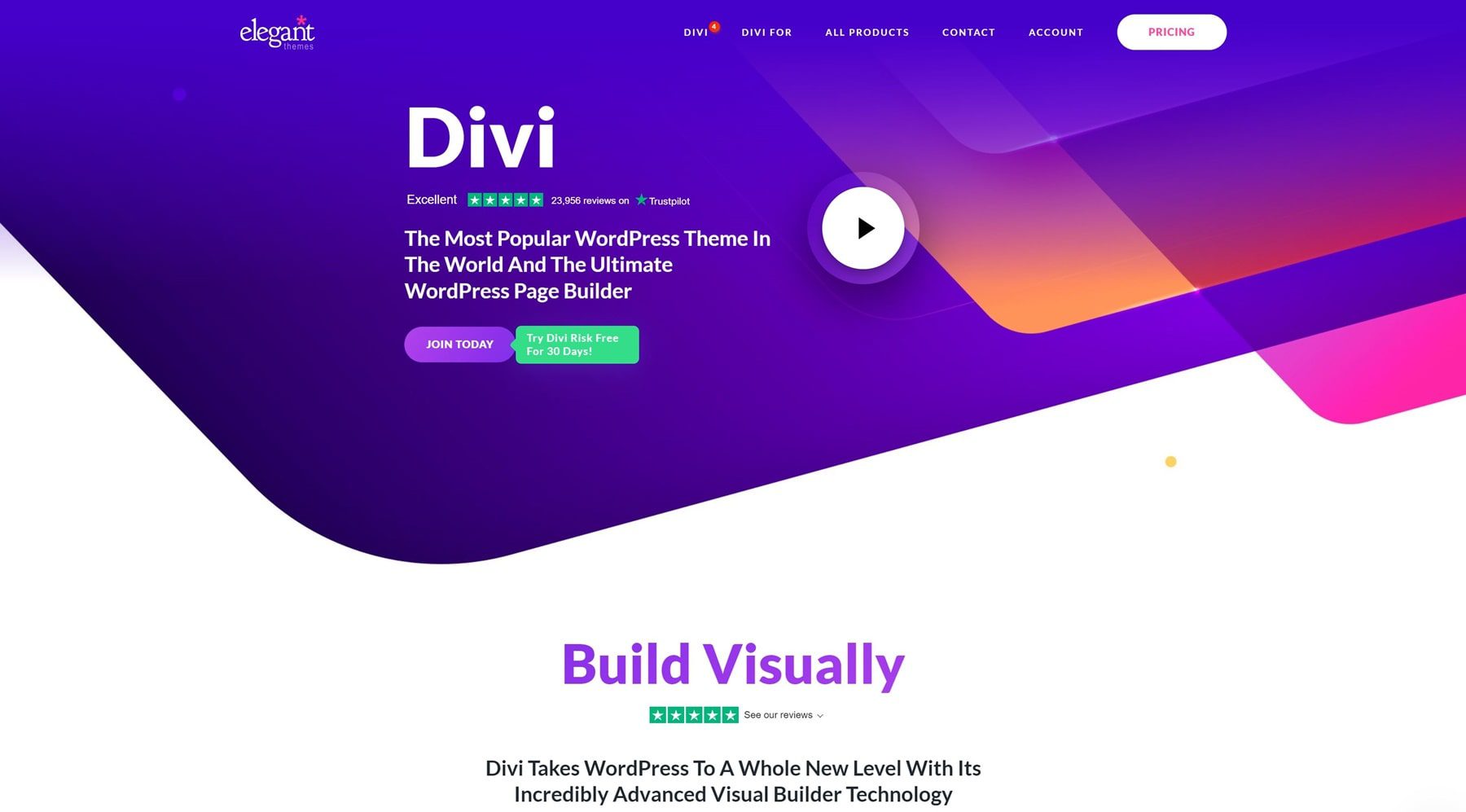
With Divi’s visual builder and WordPress’s content Management System (CMS), showcasing your work spanning different design styles, industries, and project complexities using clean visuals, client testimonials, and making regular updates is a breeze—all without the need for coding. We’ll discuss this combination’s power in detail soon.
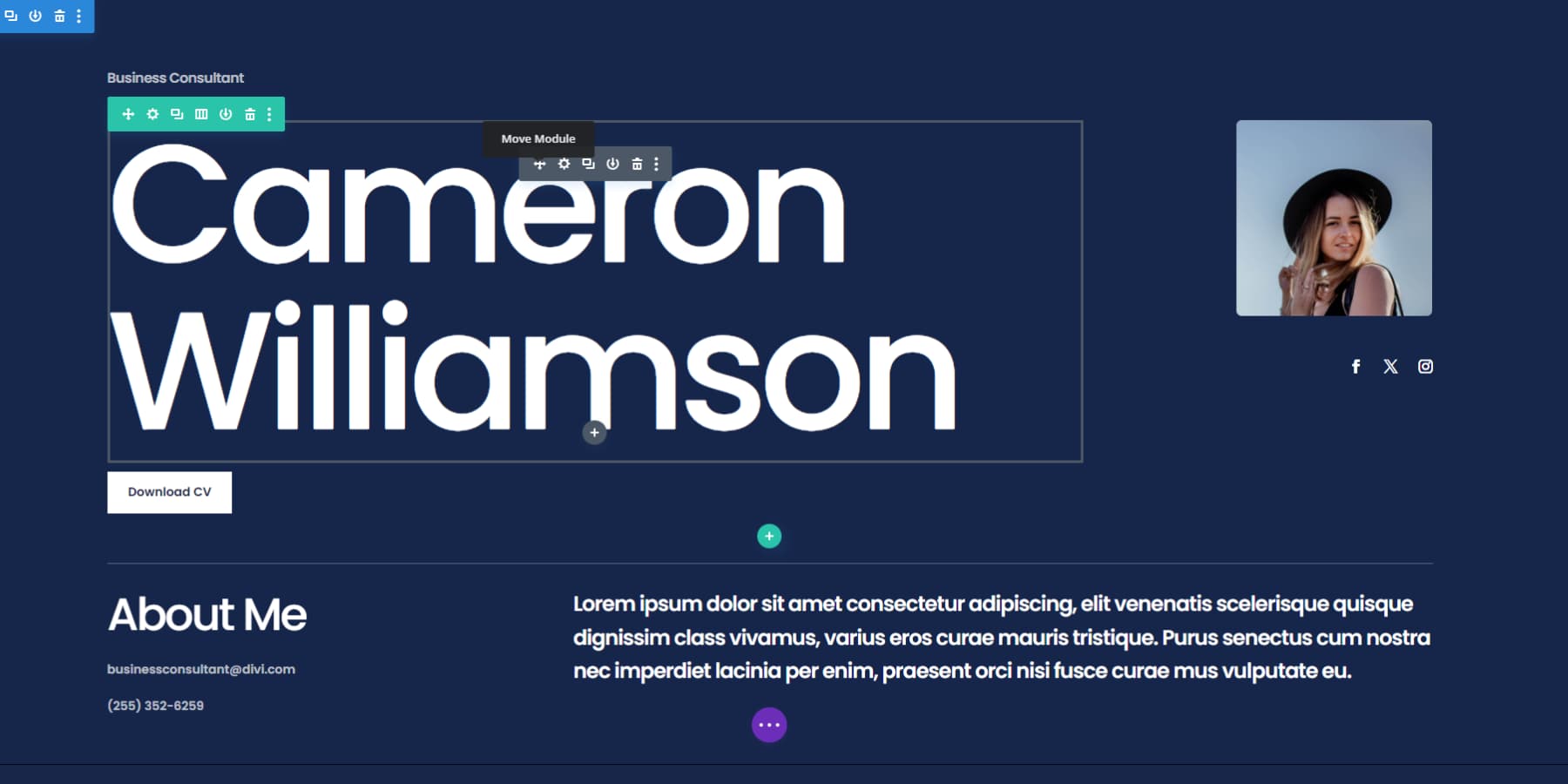
However, if you’re only just starting, you may wonder how you will display past work. That’s a good question. You don’t need to display real websites right off the bat. You can display concepts or prototypes you make, which can help you hit the ground running.
Finding Your First Client as a Freelancer
Finding that crucial first client takes perseverance. Leverage your network by spreading the word among your family, friends, and acquaintances. Join online freelancer communities and relentlessly market yourself on social media. But make sure you don’t spam since that might ruin your credibility.
Platforms like Fiverr are also the first choice of most freelance designers when it comes to finding initial projects. WordPress also has a dedicated job board you can check. Don’t hesitate to offer discounted rates initially to build your portfolio and testimonials.
Once you land that first gig and knock it out of the park, you’ll eventually gain momentum. Patience and hustle are essential when starting out freelancing.
Best Tools for Website Building
To get started and thrive as a freelance web designer, these top website-building tools will streamline your workflow and help you deliver stunning sites to clients. Let’s take a look at them:
Best Website Builder: WordPress + Divi
If you want to showcase your portfolio and build a website building business, WordPress is hands down the best way to go. This platform gives you complete control over designing and customizing your site. You can select from various themes and plugins to craft an attractive website that excels in search engine performance.
This is because of its SEO-friendly attributes and the abundance of SEO plugins available. And the best part is that it is entirely free and open source, barring the cost of hosting and plugins. This is why it has become so popular that it now powers more than 43% of all websites worldwide—that’s about 1.1 billion websites!
But WordPress Isn’t Enough on Its Own…
For every WordPress website, you’ll need a theme, and Divi is one of the most versatile options out there. Its user-friendly Visual Builder, a drag-and-drop tool that doesn’t require coding skills, allows you to design beautiful web pages easily.
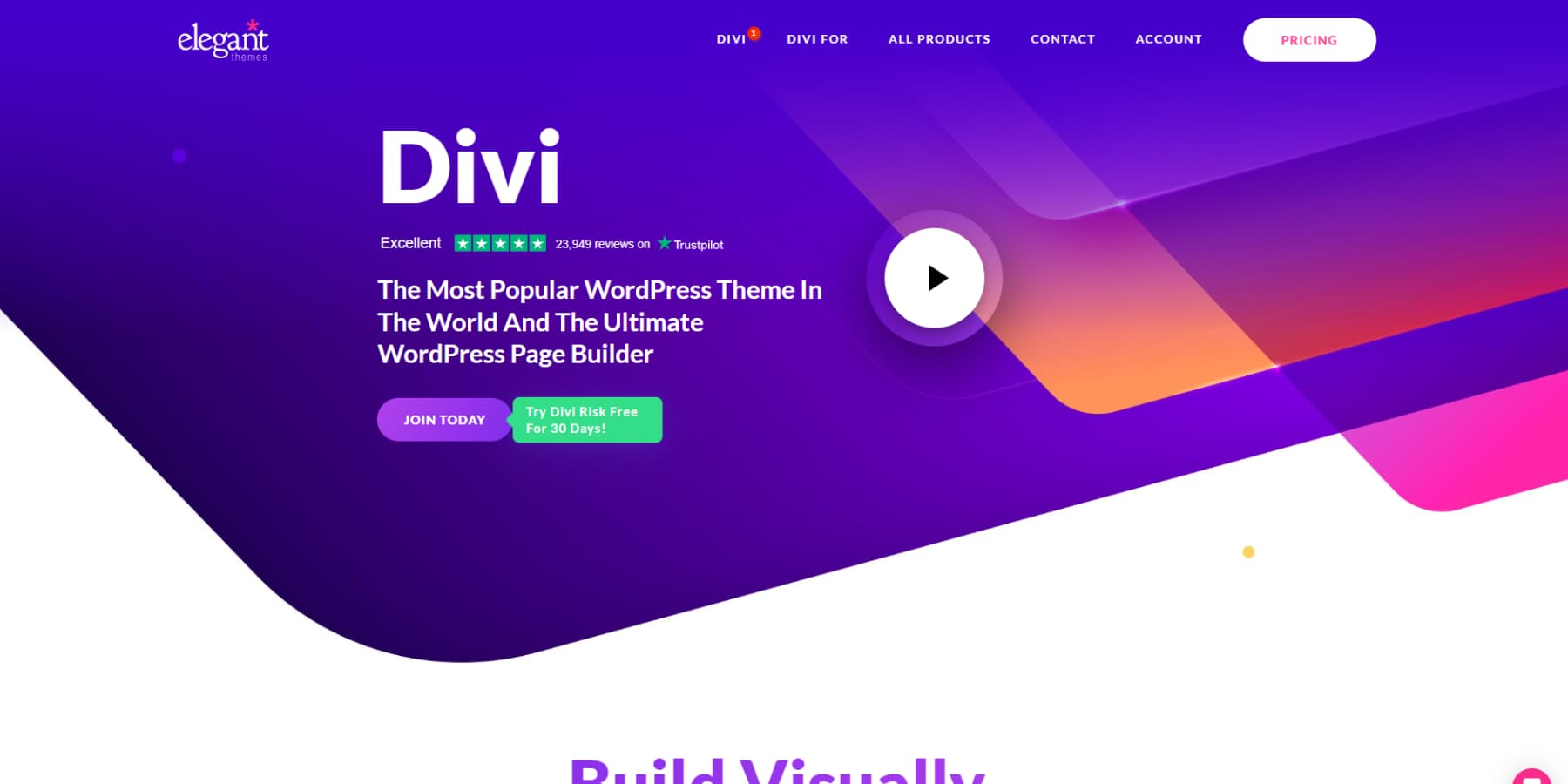
Plus, you can access over 200 design modules for endless creative options. Are you worried that you might not be creative enough? No worries! Divi has the most extensive collection of 2000+ premade layouts and website packs , adding a new layout almost every week , ensuring you never start building websites from a blank screen.
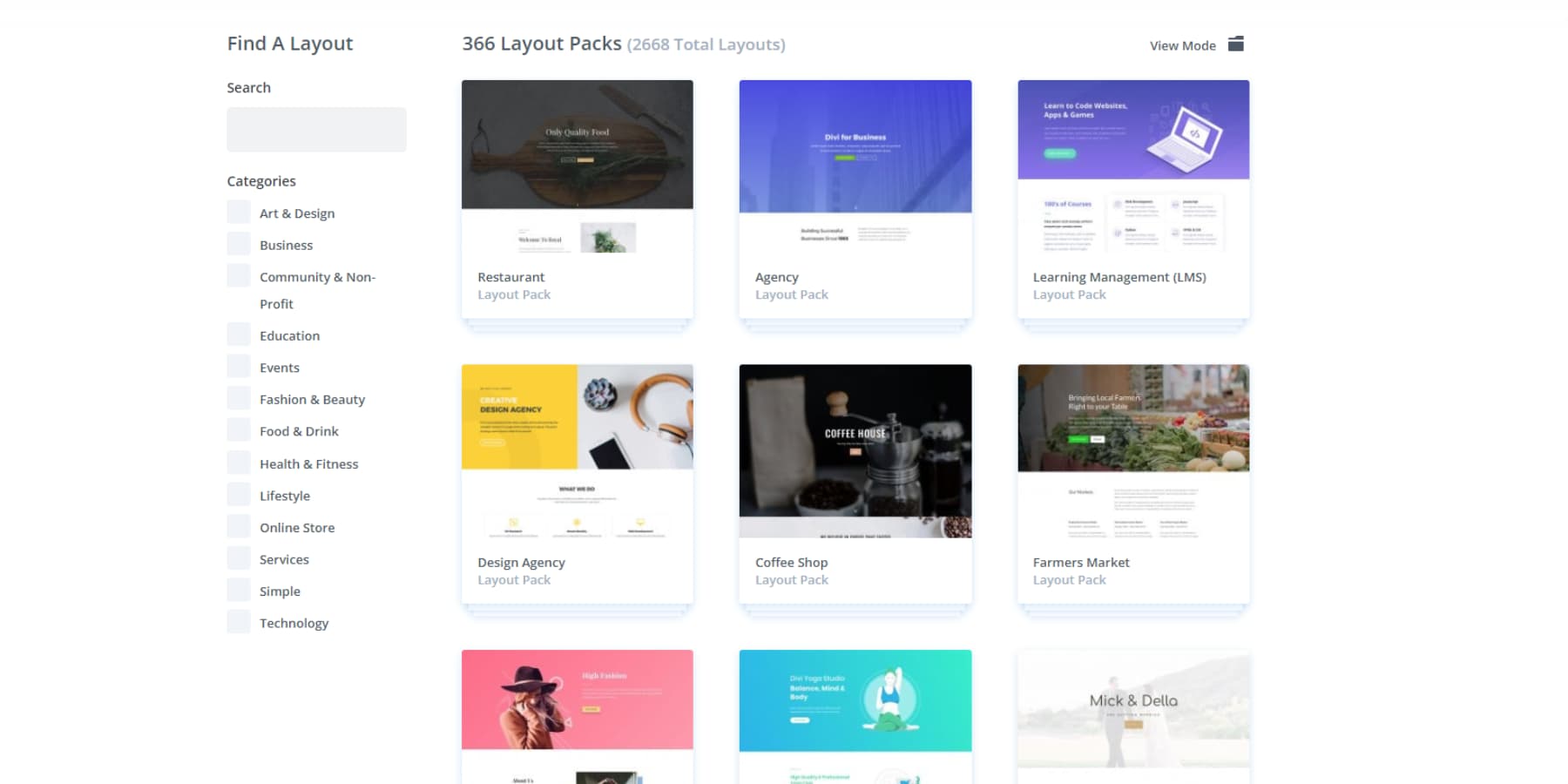
Are you planning a clean portfolio or looking to design something more edgy? Divi provides everything you need to make your vision a reality smoothly. These features aren’t the only tricks this pony does. It unleashes its full potential with a game-changing Theme Builder feature. This powerful tool lets you take control of every inch of your website, from the smallest detail in headers and footers to completely customized blog post templates and archive pages.
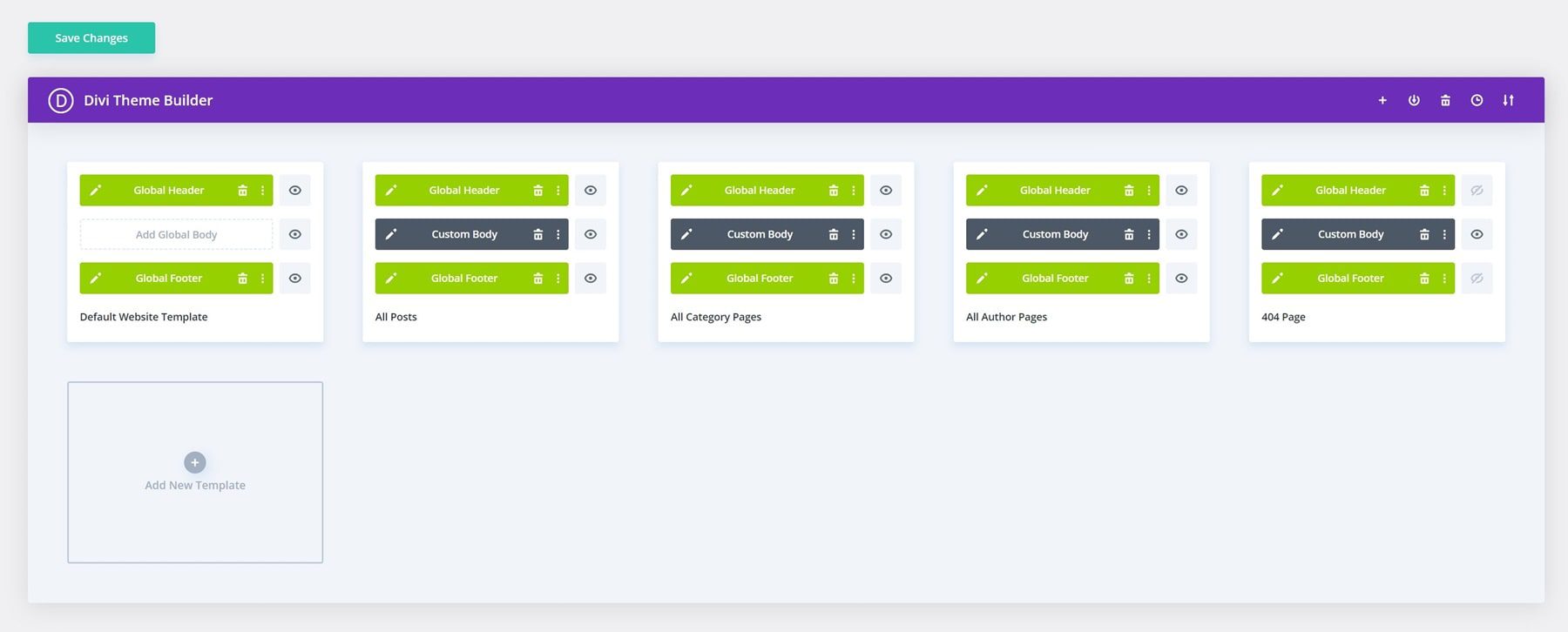
Great with features and all. But how will it help me with my freelance web design business, you may ask? Divi’s affordability makes it accessible to creators of all levels, starting at an unbeatable price of just $89/year . Just $89/year for all the above features, which you can use to build unlimited websites. Yes, even your client websites! Not a fan of yearly renewals? You can also grab a lifetime license for a one-time payment of $249 . This pricing makes Divi easily the most affordable page builder in the market.
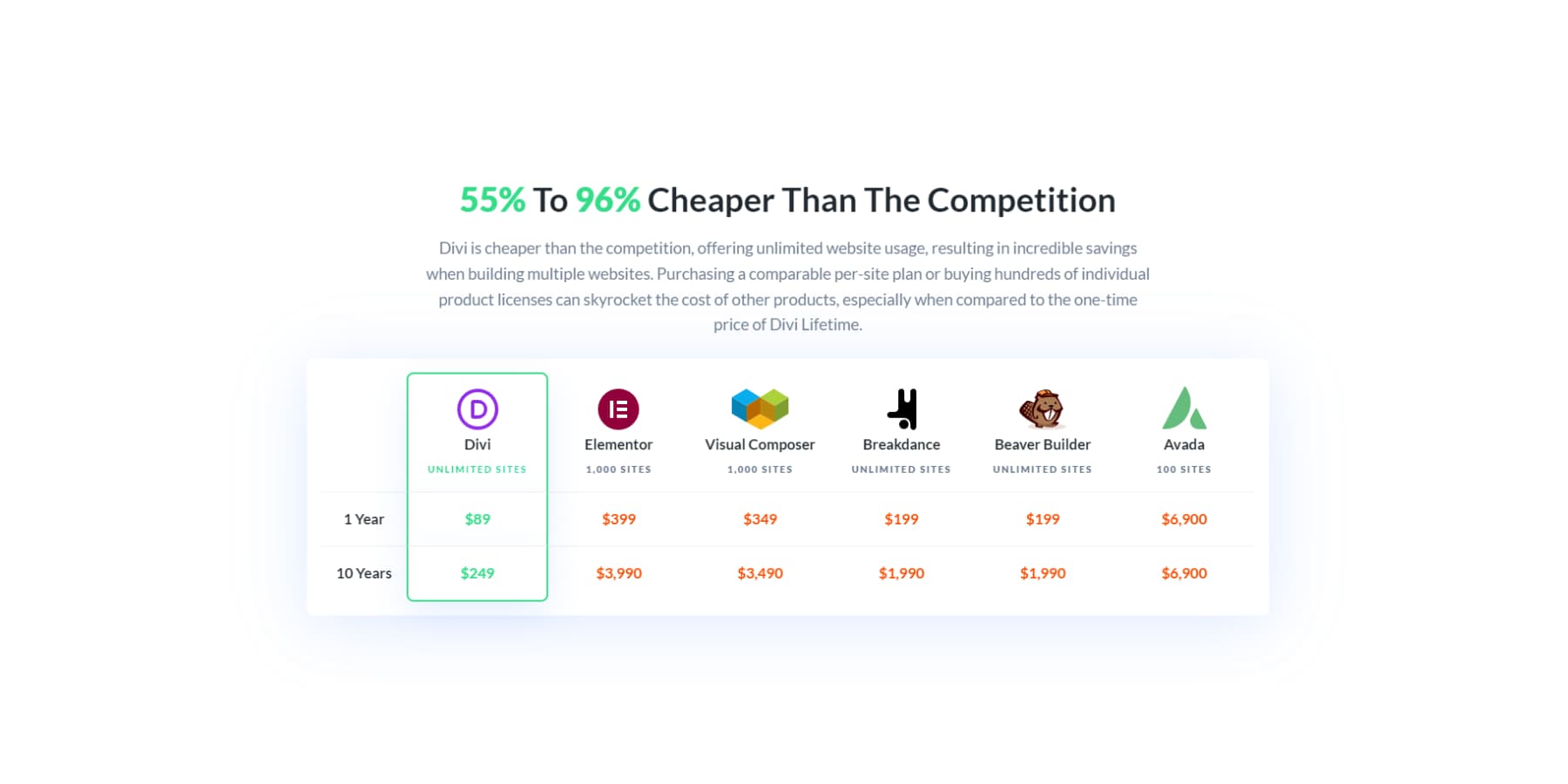
Get Divi Today
What does divi offer additionally.
When we say Divi is a genuinely innovative website builder, we mean it! Divi AI is an AI-powered design assistant that can write on-brand text, generate realistic images, write compatible code, and create entire web pages — all with just a simple text prompt. With unlimited usage available for as little as $16.08 per month , it’s a true game-changer for freelancers and designers.
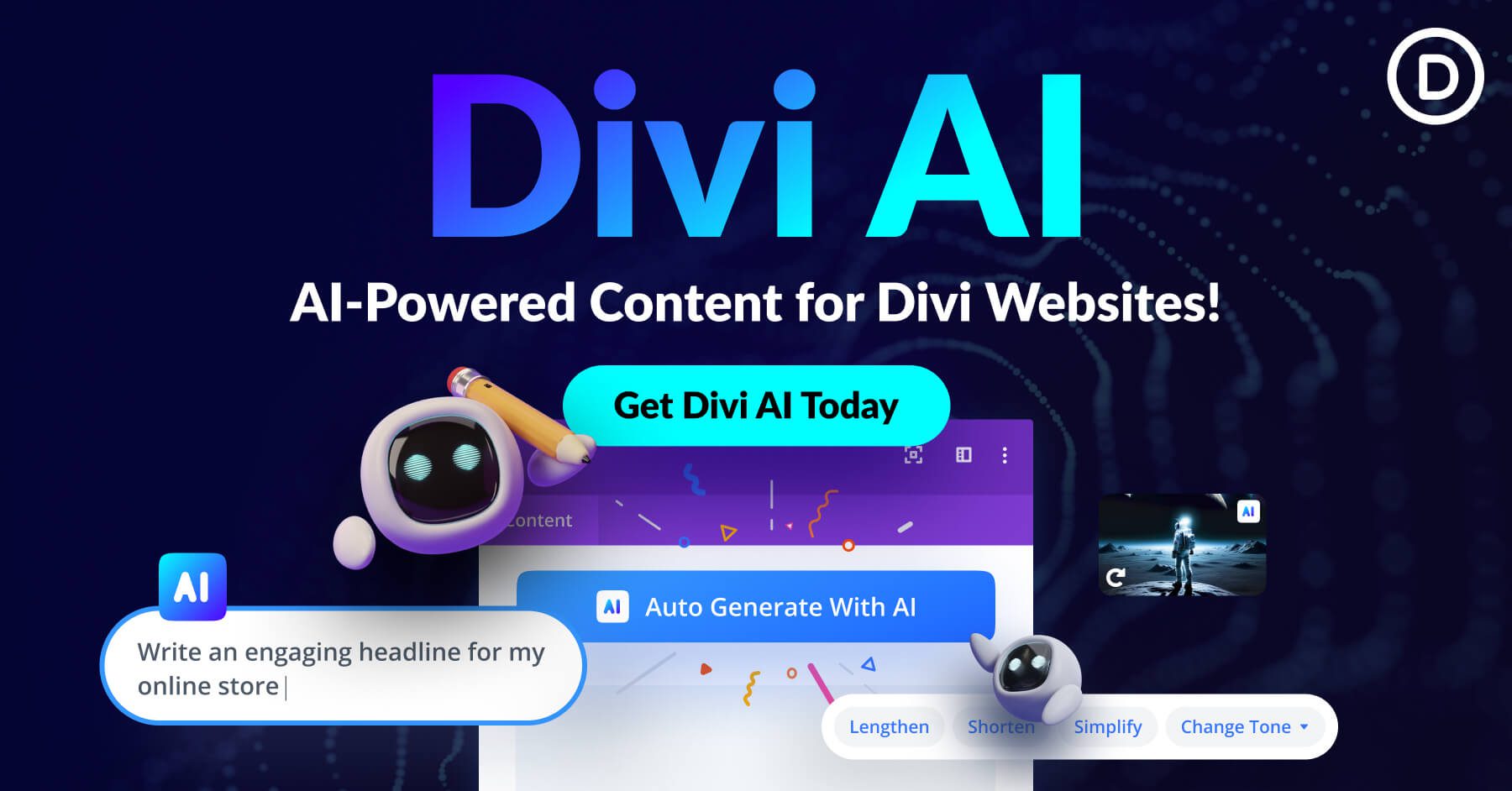
Explore Divi AI
Let’s talk about scalability. Apart from usage on unlimited website usage, Divi offers helpful team features to ease your transition from an individual freelancer to a full-blown agency should you find great clients and establish a successful business.
For example, Divi Teams allows for seamless collaboration between team members and streamlines access to client billing and support tickets. For just $1.50 per month per seat , your team and clients will have access to all the fantastic features of Divi.
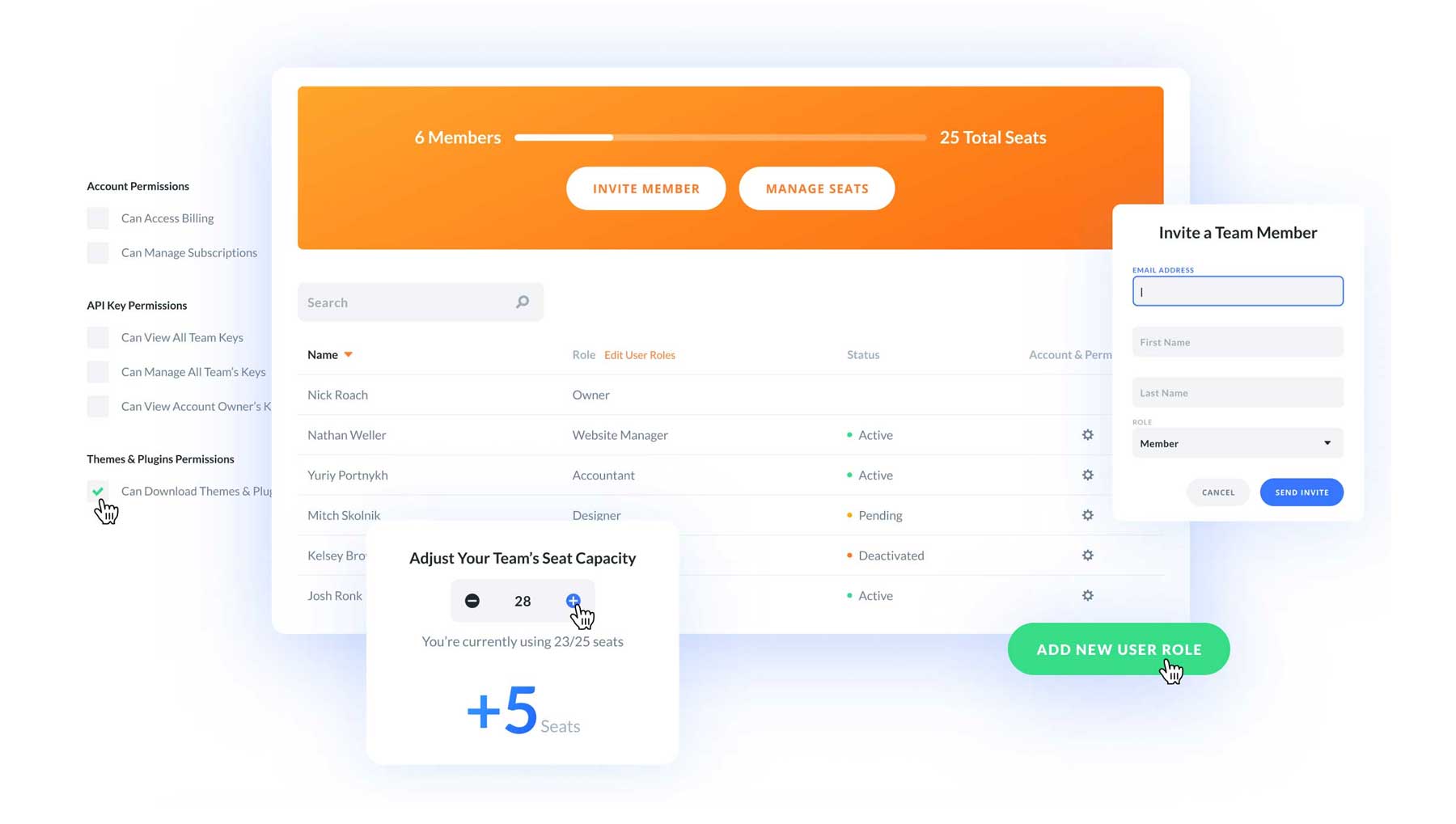
Explore Divi Teams
With Divi Cloud , you can easily store all your favorite layouts in one place without exporting files. It’s like having Dropbox for your Divi assets , only unlimited and much more affordable, starting at just $6/month! You will be amazed how much this nifty feature saves time and cuts down on back-and-forth in the long run, especially if you have a team working on multiple websites simultaneously.
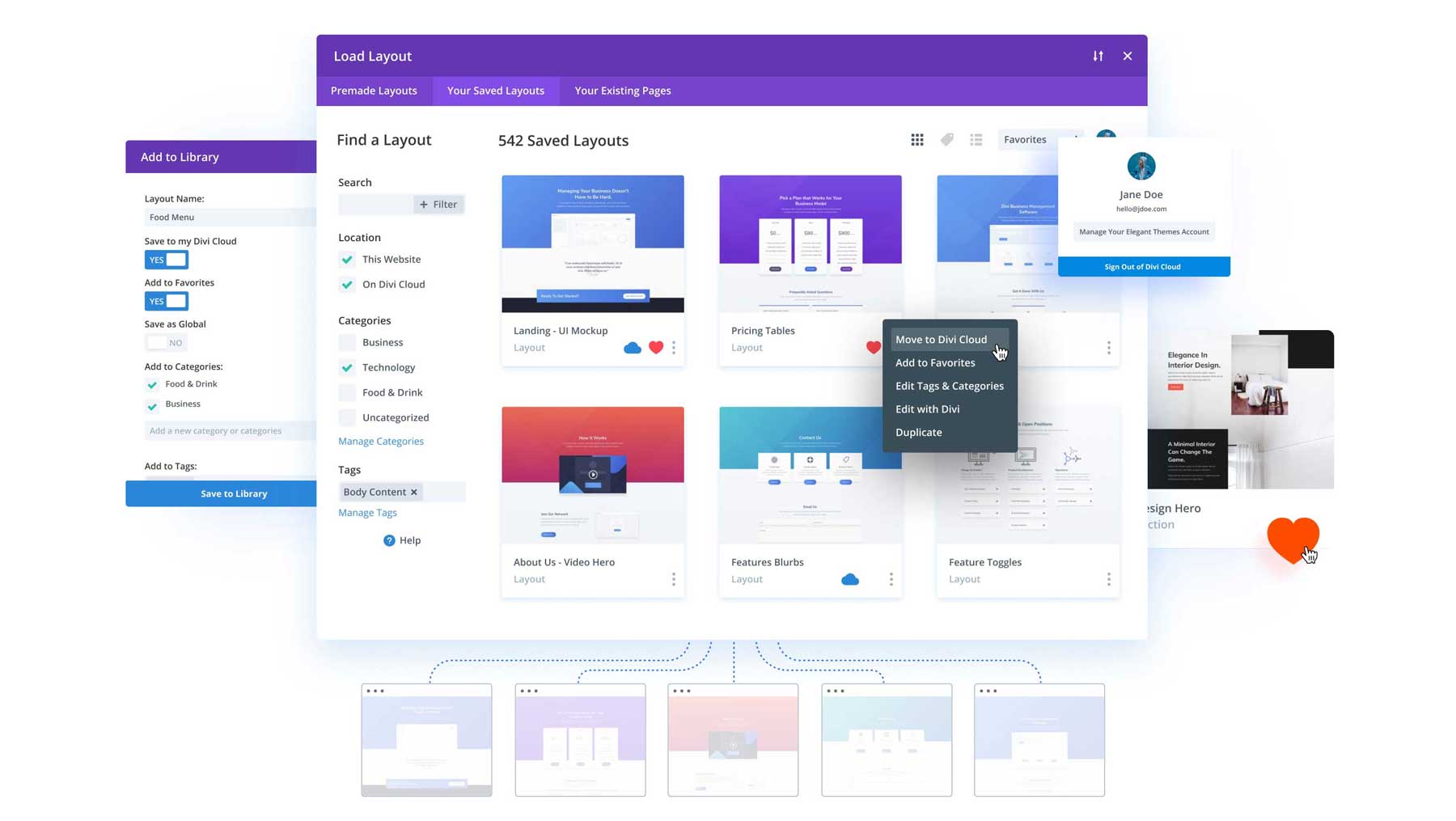
Explore Divi Cloud
Are you looking to elevate your team’s and clients’ experience? Divi VIP offers premium support, with guaranteed responses within 30 minutes, 24/7. But don’t worry- we seldom take even that time to revert. Additionally, as a VIP member, you’ll receive an extra 10% discount on all purchases from the bustling Divi Marketplace . Experience the best support in the industry even faster!
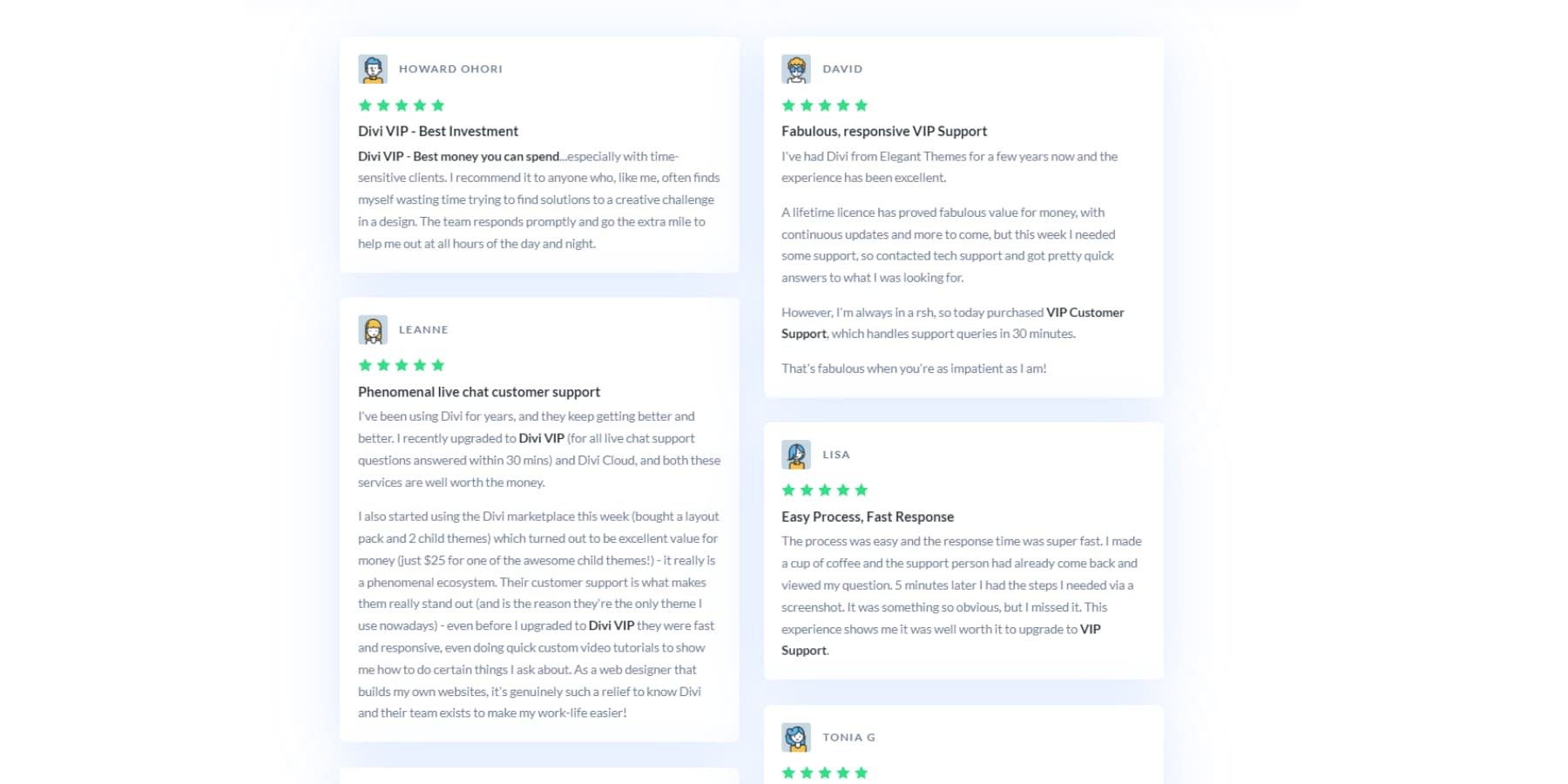
Explore Divi VIP
Love all the features listed above? Become a Divi Pro member for just $277 per year and save $388 upfront compared to purchasing each component separately. This membership includes access to AI, Cloud, VIP, and adding up to four team members/clients to your team . For even more savings, consider the Divi Lifetime + Pro bundle , which combines lifetime access to Divi with yearly Pro services fees for just $297 in the first year and $212 per year after that.
Become A Member Today
Essential bundles you maybe interested in….
Speaking of Divi Marketplace, here are some items from it that might interest you. These bundles can significantly expedite your website-building time.
The Ultimate Divi Header & Menu Builder Bundle
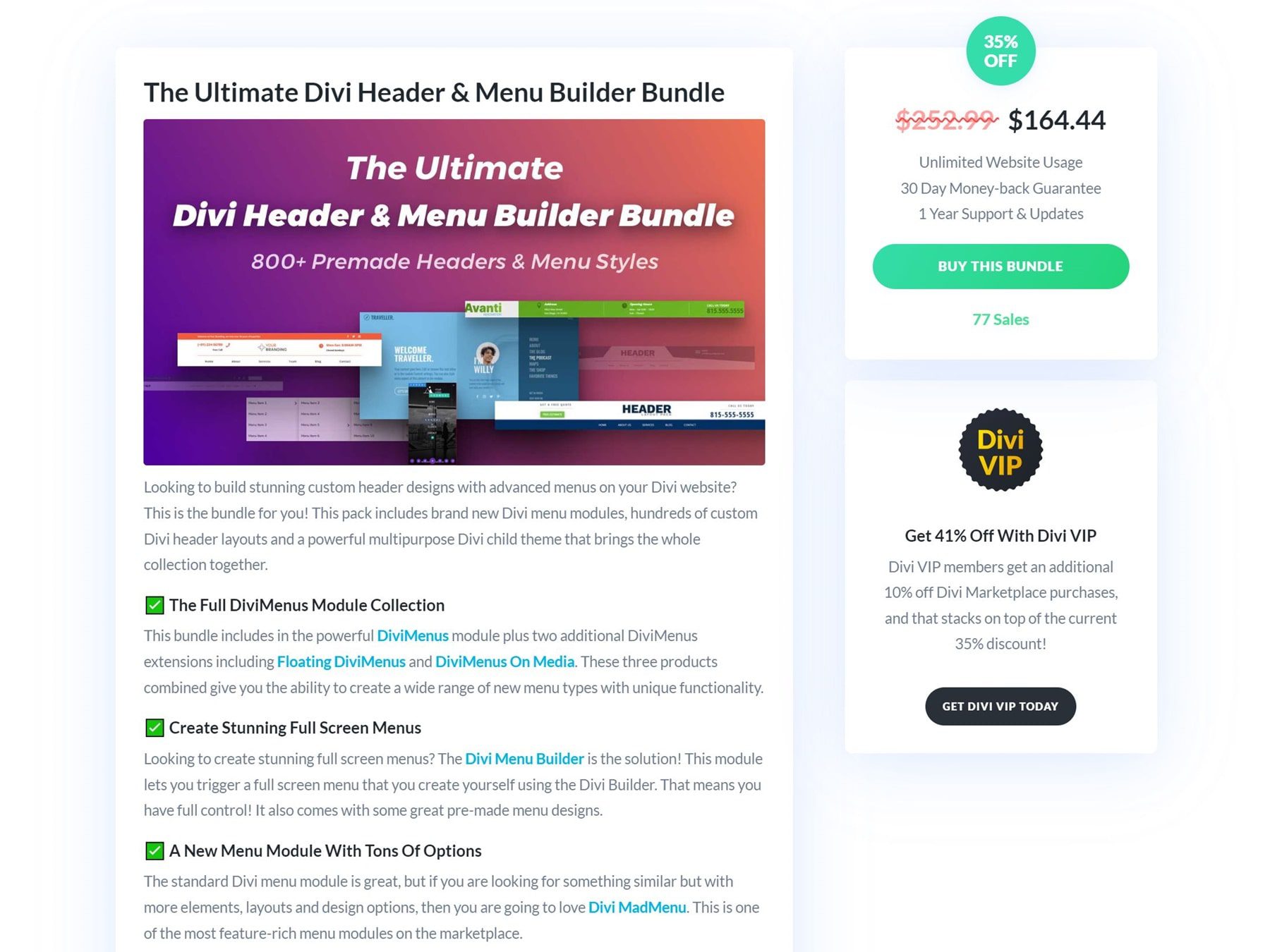
Ultimate Divi Header & Menu Builder Bundle provides a comprehensive range of Divi menu components, header templates, and a versatile child theme designed for use on Divi websites. It contains an array of features, including the DiviMenus module with added capabilities, the ability to create full-screen menus, Divi MadMenu for advanced menu design options, and a selection of pre-designed headers to elevate and personalize the look of your site.
Go to Divi Marketplace
The Ultimate Divi Starter Bundle
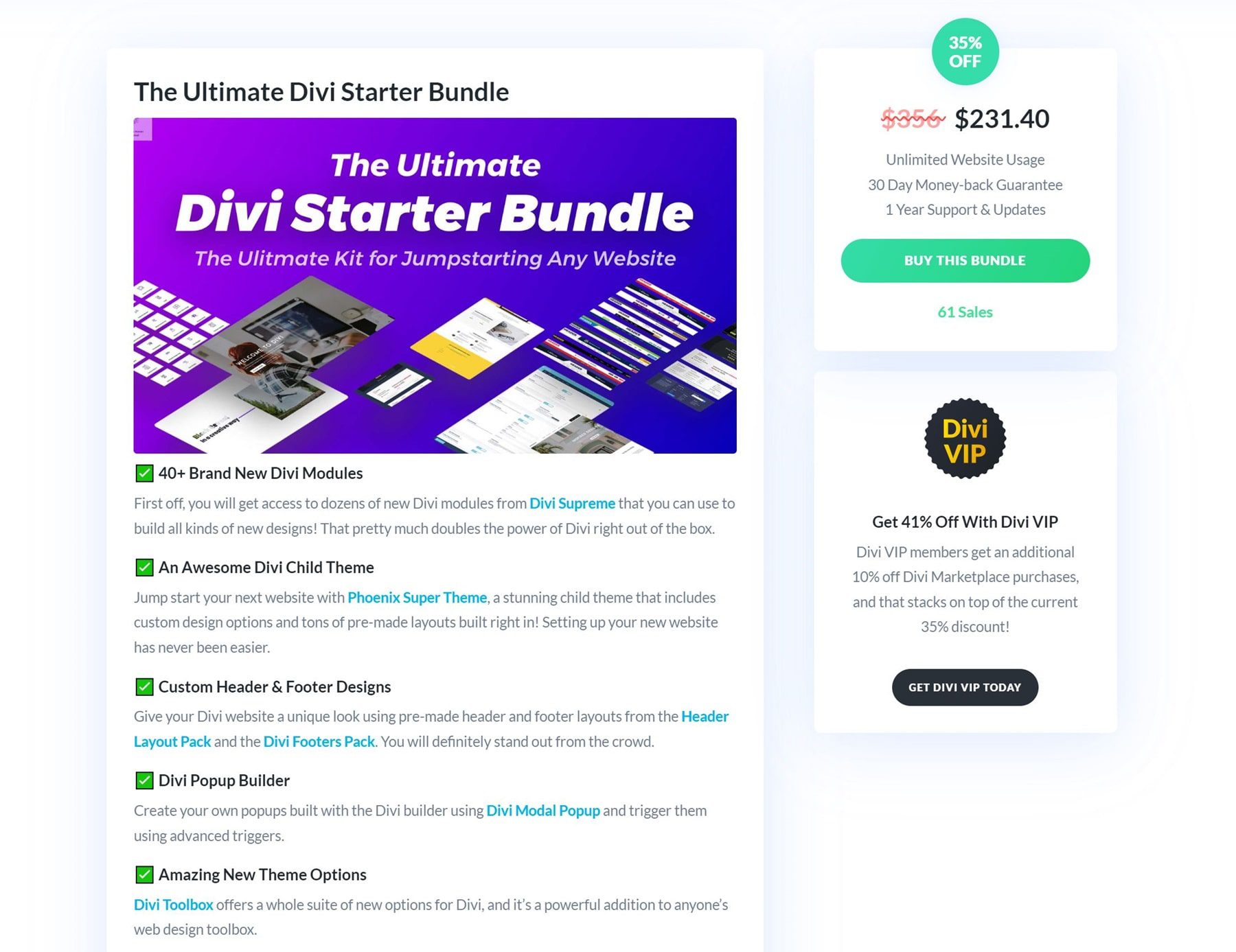
With the Ultimate Divi Starter Bundle , you can access over 40 new and innovative Divi modules, a professionally designed child theme, unique header and footer designs, a popup builder, expanded theme options, and a collection of premade layouts for different purposes. This bundle greatly enhances Divi’s capabilities, providing a more straightforward and customizable experience.
The Ultimate Divi Utility Bundle
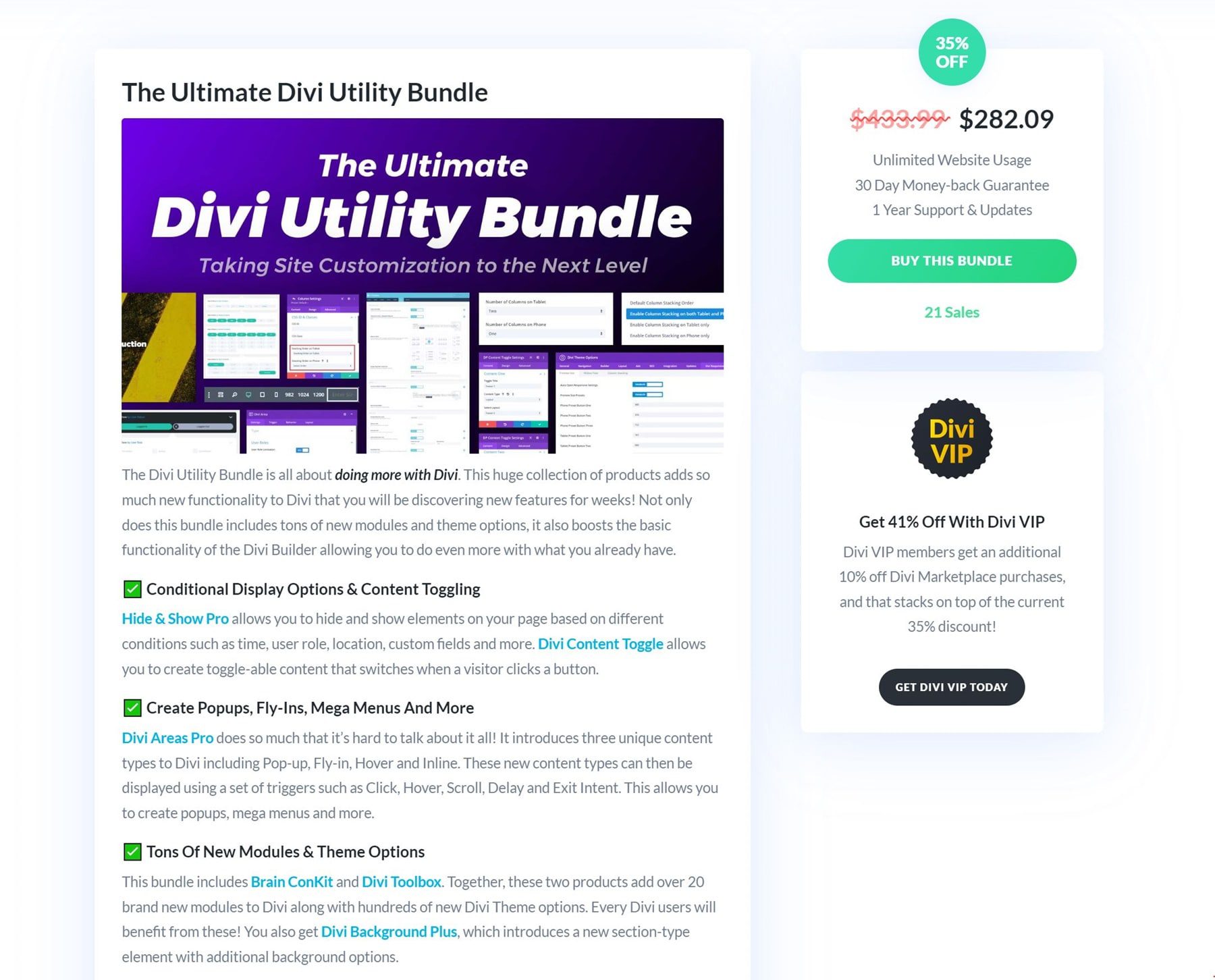
To optimize the Divi Builder’s capabilities, the Divi Utility Bundle offers comprehensive functions to enhance user experience. These features include conditional display settings, advanced content creation options such as popups and mega menus, additional modules and theme customizations, improved responsiveness, and accessible maintenance mode for seamless website development.
Best Hosting Platform: SiteGround
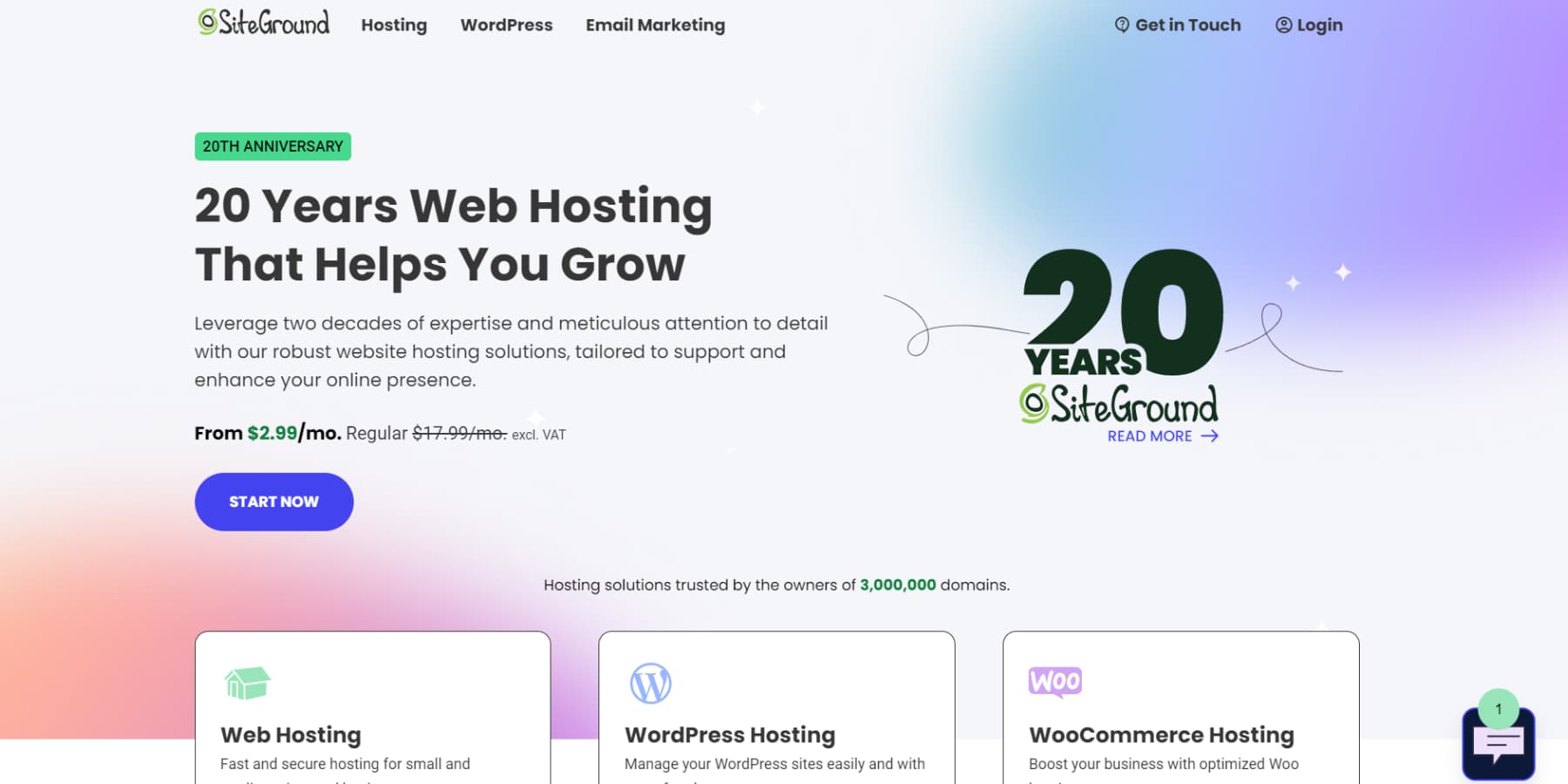
To use Divi + WordPress effectively, you need to have the WordPress.org software installed on your server. This process can be complex, especially if you lack technical expertise. However, SiteGround simplifies this by preinstalling WordPress and all the necessary tools.
SiteGround is one of the leading WordPress hosting providers thanks to its impressive uptime, fast page loading speeds, and robust backup features. Their customer support is excellent, available 24/7, and offers various resources tailored specifically for WordPress users. Furthermore, SiteGround seamlessly integrates with Divi, allowing you to launch a WordPress site with all settings specifically configured for Divi quickly and effortlessly. Learn more about Divi Hosting by Siteground here.
SiteGround’s focus on WordPress is evident through features such as a free SSL certificate, specialized caching for WordPress, and seamless compatibility with popular plugins and tools. Their competitive pricing, particularly in the first year, makes it a compelling choice for freelancers working within tight budgets. Moreover, they provide daily backups and user-friendly restoration tools, which are essential for maintaining and protecting your websites.
Launch a WordPress Website With Siteground
Best WordPress Plugins
In this part of the post, we’ll quickly highlight a few vital plugins you’ll need to set up your portfolio and client websites. These will significantly streamline your website-building process.
WP Rocket: Best Caching Plugin
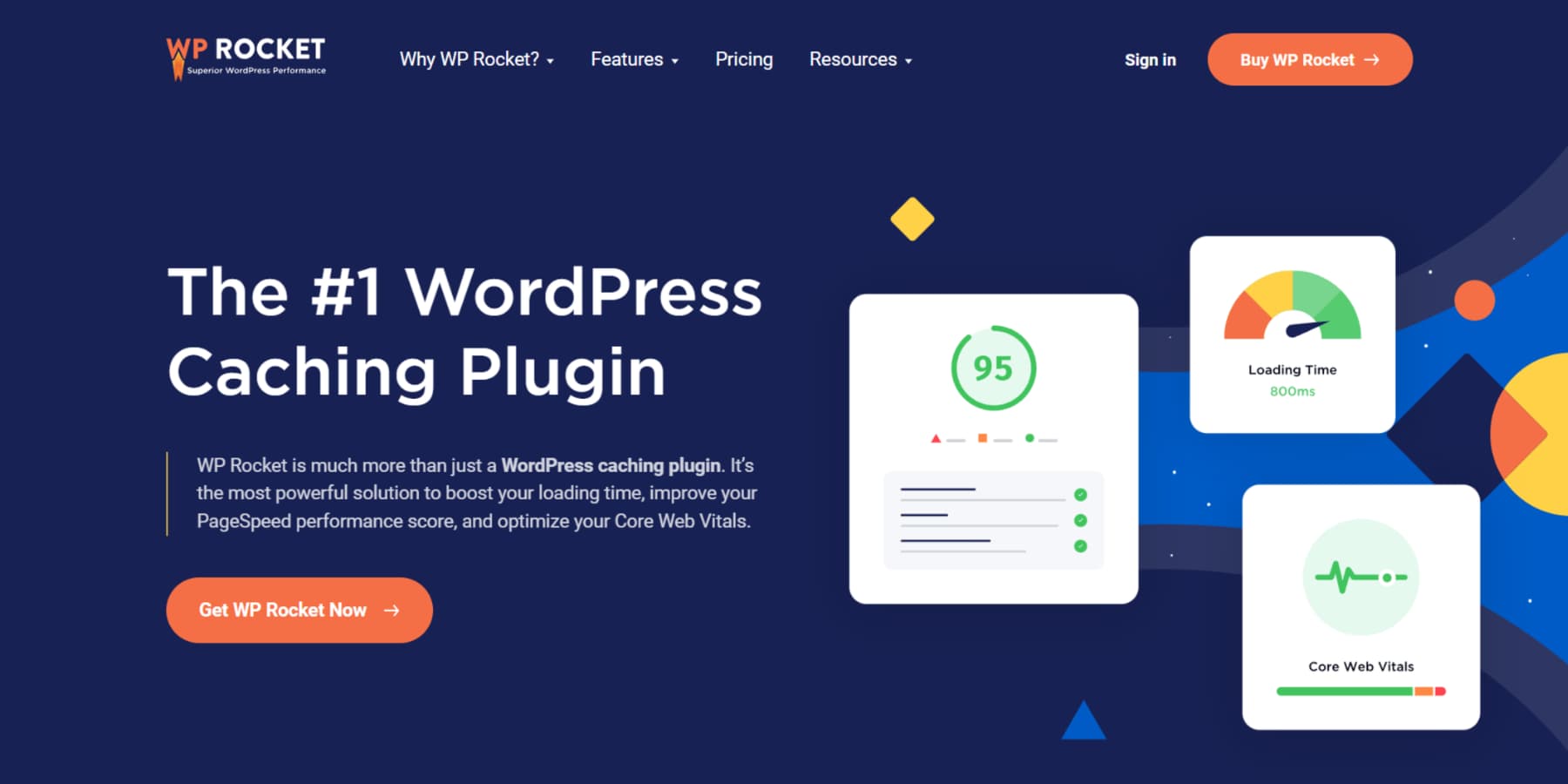
WP Rocket is a top-tier premium caching plugin for WordPress. It is highly praised for its easy-to-use interface and compelling features that optimize website performance. This plugin excels at speeding up your site by optimizing CSS and JavaScript, preloading cache, enabling LazyLoad, optimizing the database, and ensuring compatibility with Content Delivery Networks (CDNs). Although it doesn’t provide a free version and dedicated tools for media optimization, WP Rocket remains a solid choice for those wanting to enhance their website’s speed and performance effortlessly. Read the complete review here.
Optimize Your Website With WP Rocket
EWWW: Best Image Optimization Plugin
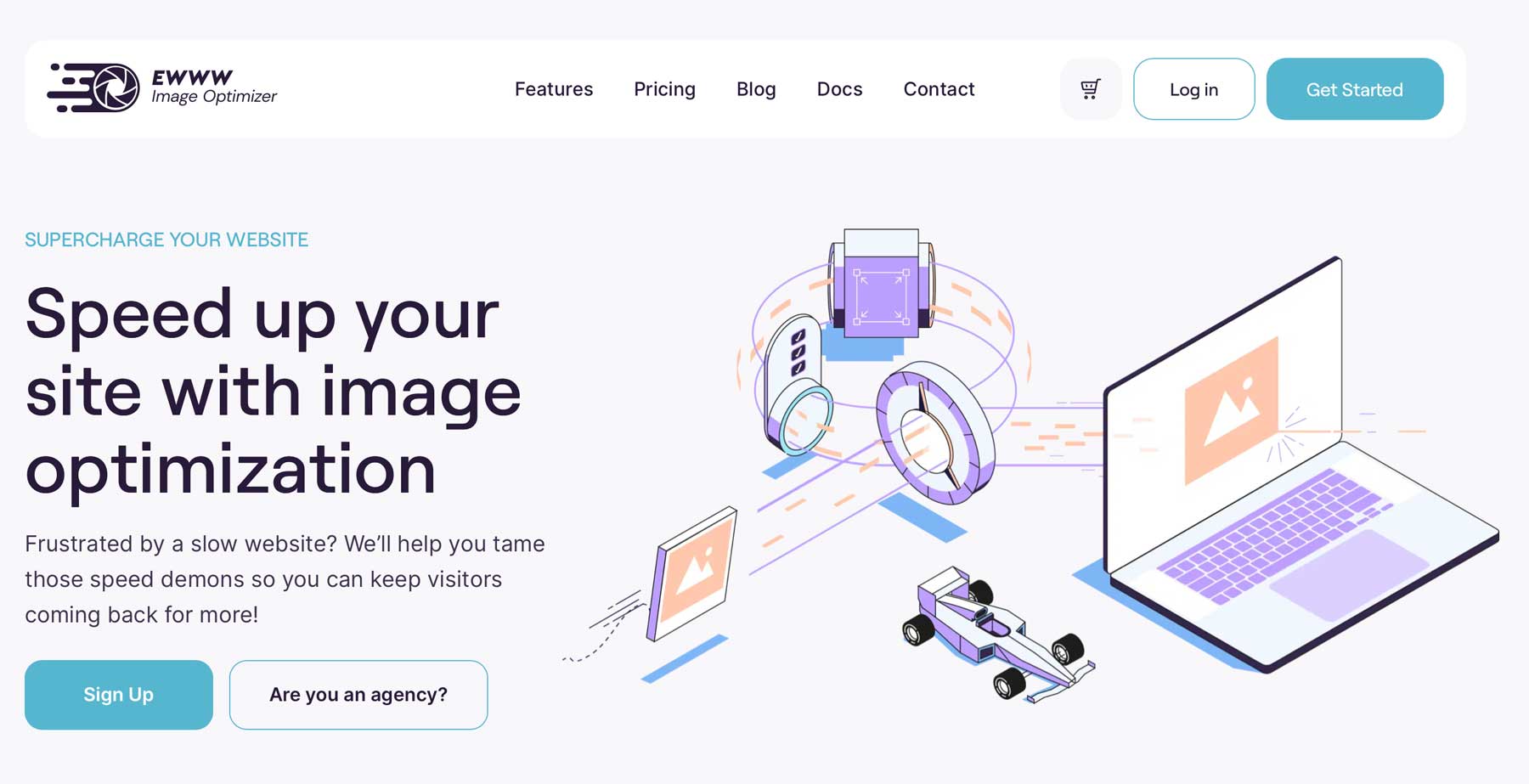
EWWW Image Optimizer is a powerful WordPress plugin that excels in automatically compressing new images and optimizing existing ones in bulk. It offers features like resizing images upon upload, removing metadata, and converting them to WebP format for improved compression, storage management, and page speed. Freelancers like yourself might appreciate its user-friendly interface and appealing options. One of its standout qualities is reducing file sizes without sacrificing quality. If you plan to have an image-heavy website, this tool is our top pick among image optimization options. Looking for more info? Check out our detailed review .
Optimize Your Images Using EWWW
UpdraftPlus: Best Backup Plugin
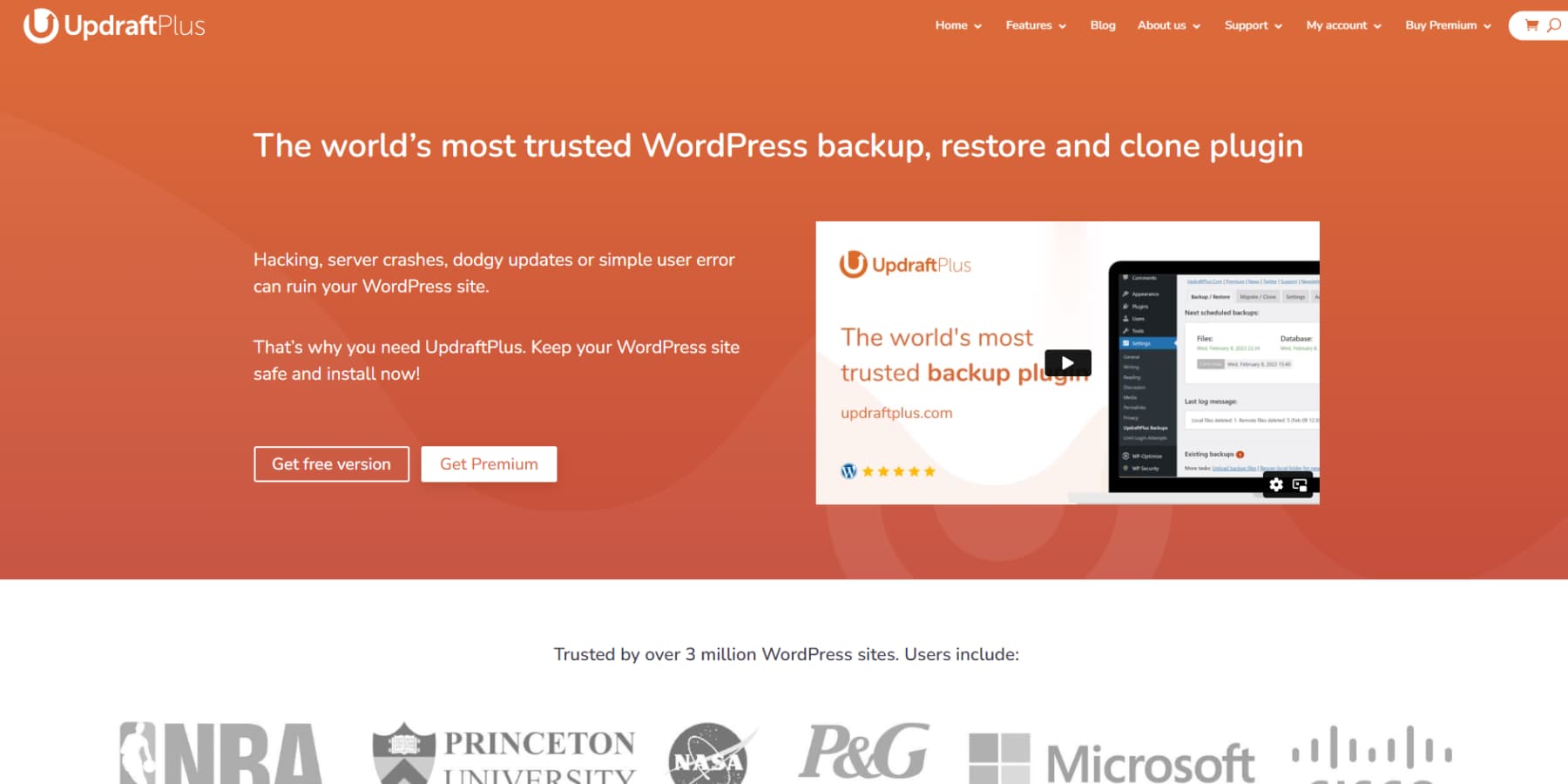
UpdraftPlus is a trusted WordPress backup plugin with over 3 million active installations and nearly 5-star reviews. It offers free and premium versions, allowing you to create full backups of your site, store them in the cloud or locally, schedule backups, backup specific components, and restore data effortlessly. The plugin also supports incremental backups, integration with various cloud storage services, and a user-friendly interface that simplifies backup configuration for beginners. UpdraftPlus is also efficient, uses minimal server resources, and is ideal for anyone seeking reliable WordPress backup solutions. Read more here.
Keep Your Hard Work Safe With Updraftplus
Solid Security: Best Security Plugin
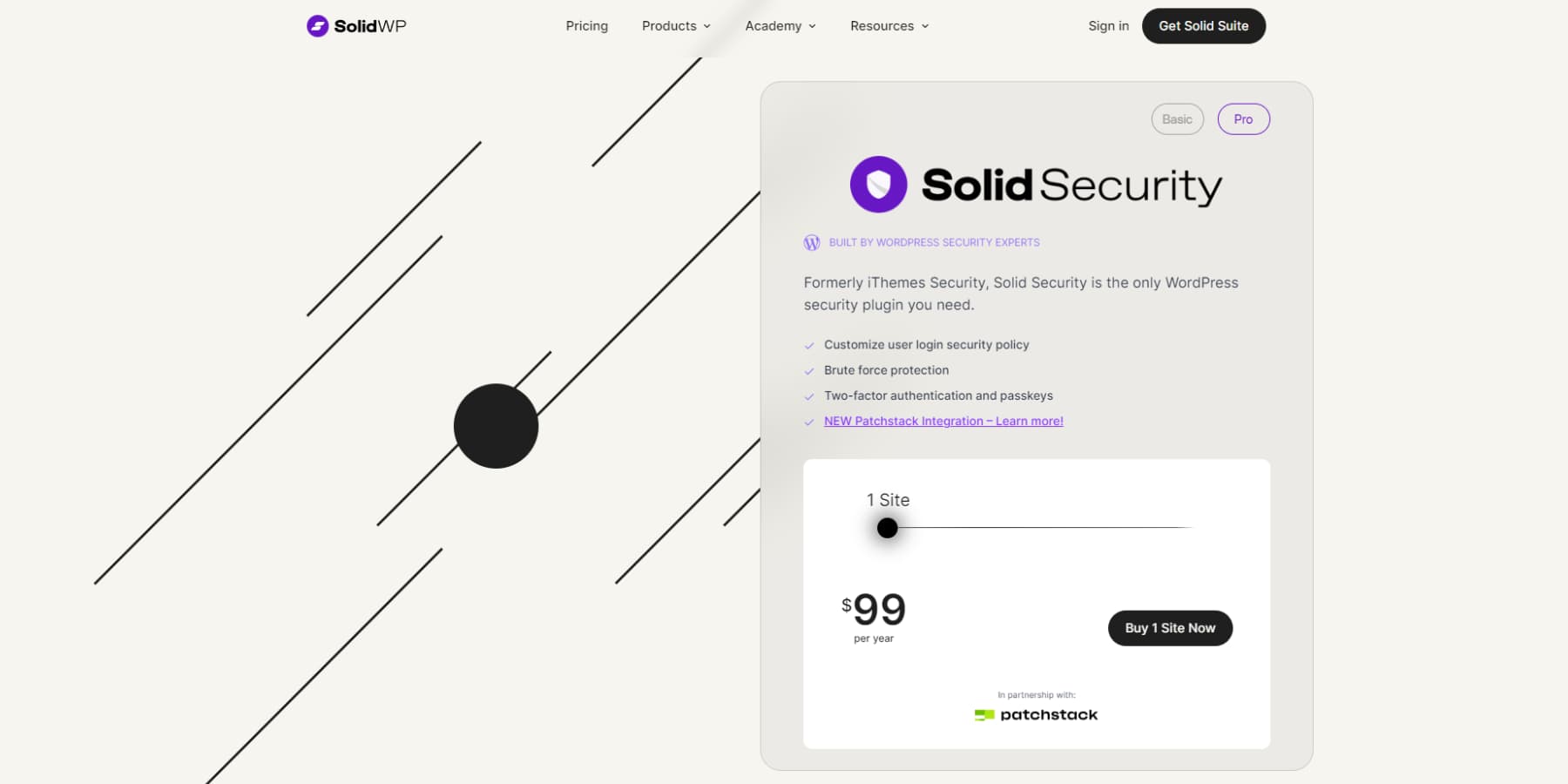
Solid Security , previously known as iThemes Security, is a robust WordPress security plugin that protects your site in over 30 ways, including password safeguarding, monitoring user activities, and brute force protection. It is straightforward: turn the required features on or off, and you are done. Moreover, it includes malware protection by a reputed security service called Patchstack, which individually may cost upwards of $89/mo. Solid Security is popular among beginners looking for effective yet affordable security features, making it an ideal option to protect your portfolio.
Secure Your Website With SolidWP
Rank Math: Best SEO Plugin
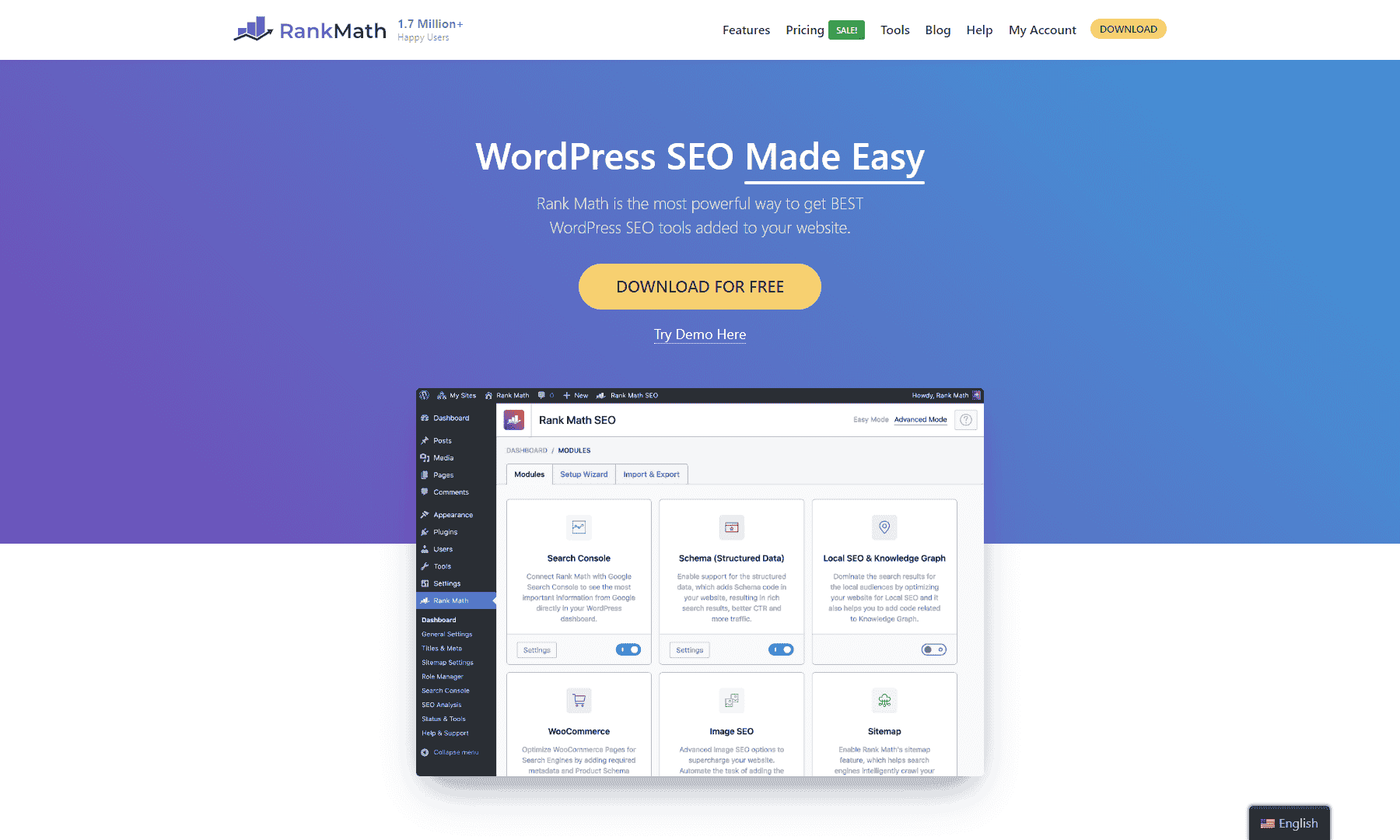
Rank Math is an SEO plugin that shines with its ability to provide real-time insights while you write, helping you optimize your posts effortlessly. Its SEO dashboard conveniently shows your ranking keywords, search impressions, and site errors identified by Google, all without slowing down your website. It smoothly integrates with Divi, bringing powerful SEO features directly to Divi’s visual builder. With features like Google Search Console integration, AI content optimization, snippet preview, and a wide range of SEO tools, Rank Math rightly calls itself the “swiss-knife” of SEO. It is an excellent choice for freelancers, solo content creators, SEO managers, and web admins aiming to streamline their SEO tasks.
Get Found Using Rank Math
MonsterInsights: Best Analytics Plugin
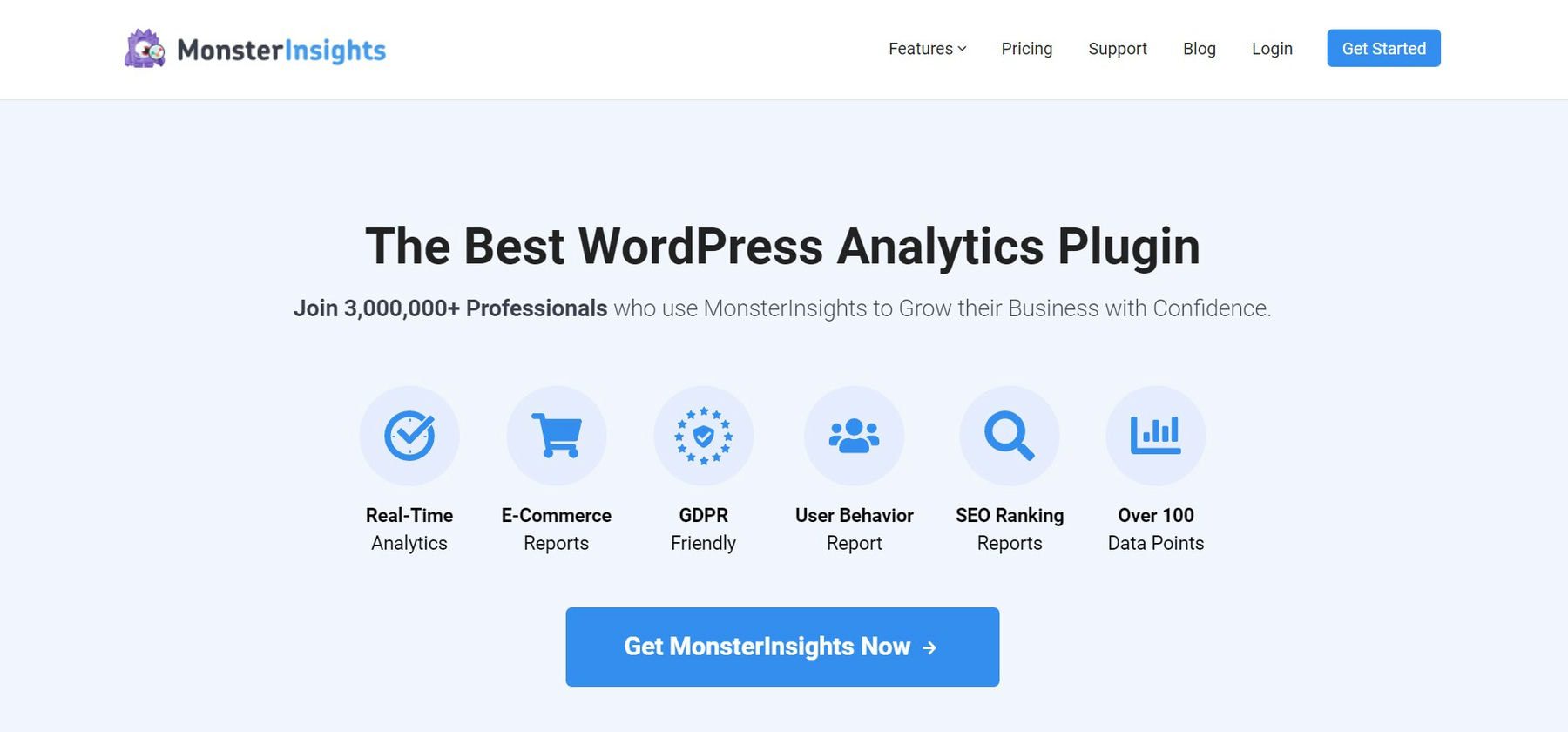
MonsterInsights easily connects your WordPress website to Google Analytics, giving you a user-friendly dashboard packed with detailed visitor information such as where your traffic comes from, which pages are popular, who your visitors are, and real-time stats. Trusted by over 3 million users and boasting a 4.5-star rating, it’s the preferred choice for WordPress analytics for many users. It offers essential data to help you improve your SEO and enhance user experience with features like tracking conversions, monitoring eCommerce performance, tracking affiliate links, and, more importantly, ensuring that your Google Analytics usage is EU and GDPR-friendly. Read our full review here.
Track Your Success With MonsterInsights
AI Tools to Help with Website Building
Starting your own freelance website-building business from the ground up might seem intimidating. Balancing various tasks could make you feel overwhelmed and mentally exhausted. But, by incorporating AI tools into your workflow, you can regain control and clarity. These tools help streamline processes, automate repetitive tasks, and offer valuable insights:
Grammarly: AI Writing Assistance
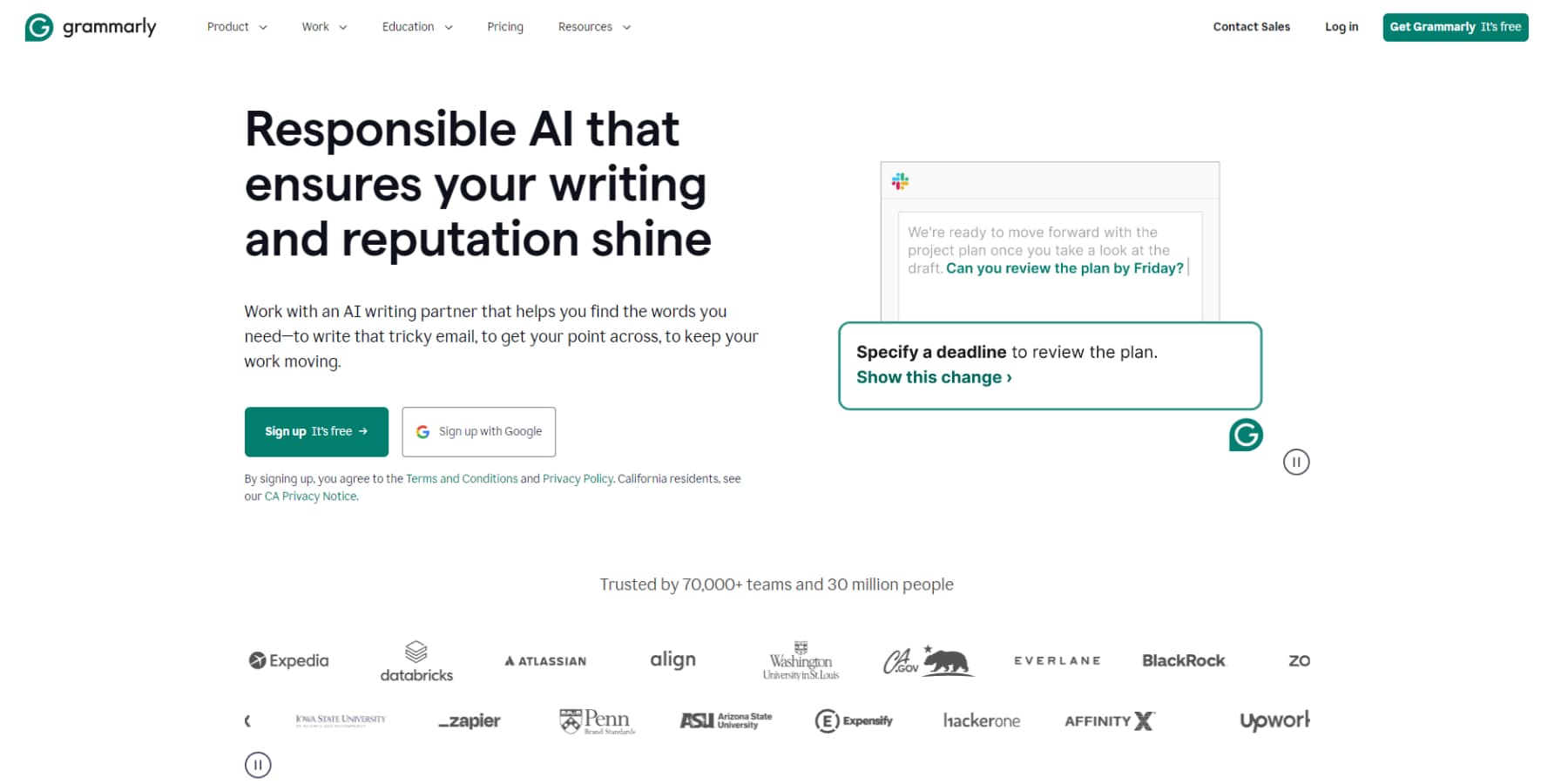
A well-written copy without grammar or spelling errors is essential to establish credibility. You can enhance your website copy with Grammarly , a cloud-based AI tool. You’ll find it valuable for ensuring clear, concise, and error-free assignments and to get real-time guidance on grammar, spelling, and punctuation, enabling you to focus on developing your ideas. In addition to basic grammar checks, it offers AI-powered suggestions to improve sentence clarity, word choice, and style, helping you craft a more sophisticated writing voice. Its features include a dedicated plagiarism checker, AI vocabulary enhancement, and accessibility across various devices and platforms.
Get Grammarly
Jasper: AI Copy and Image Generation
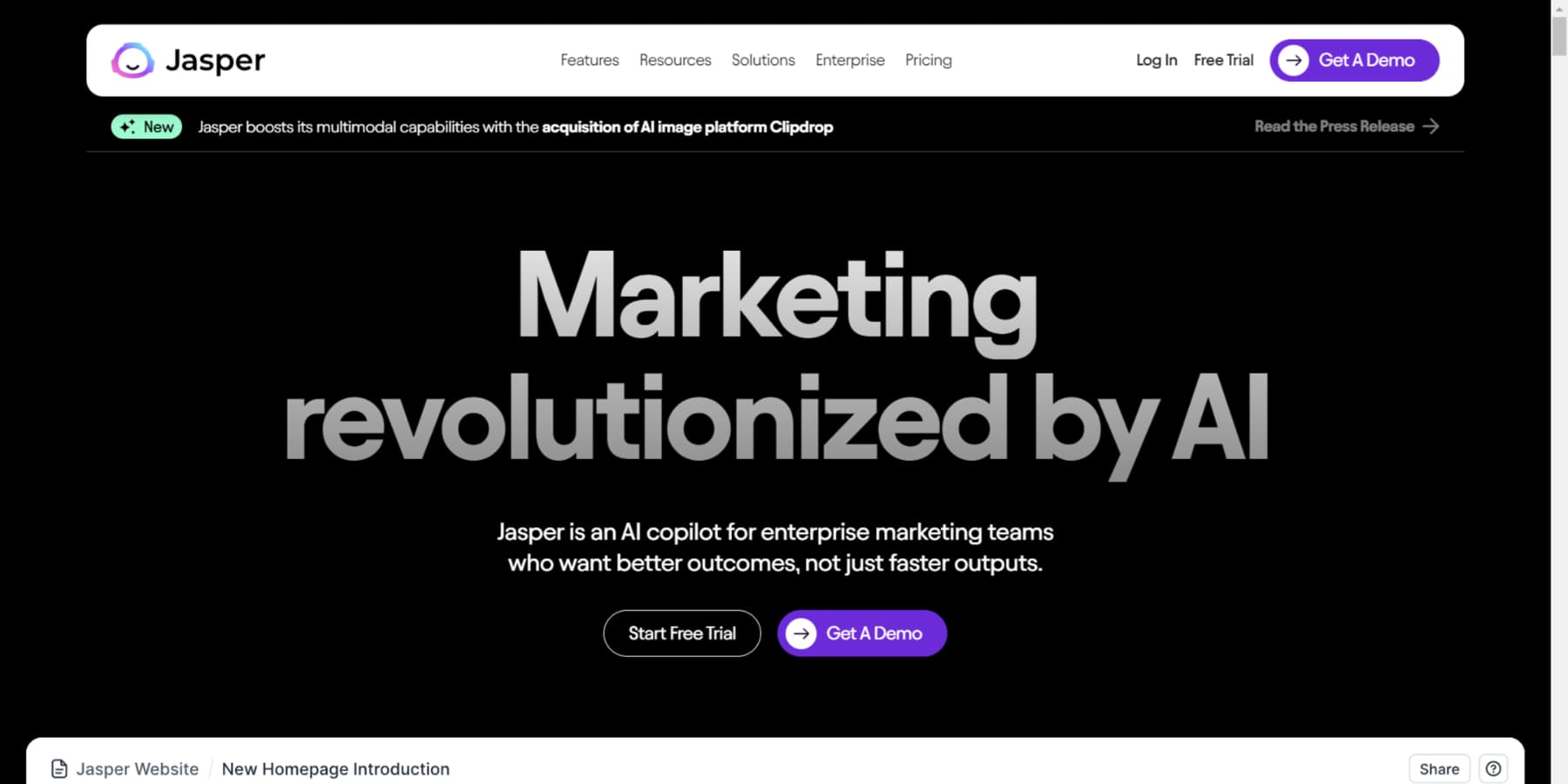
Jasper AI is your ultimate writing companion, making content creation a breeze. It crafts top-notch, authentic content across blog posts, product descriptions, and marketing copy with just basic prompts and inputs. Moreover, with Jasper Art, generating website images becomes a snap – describe your vision, and voilà! No more endless image searches for the perfect image. We go into Jasper’s details in this article.
CodeWP: Code Generation
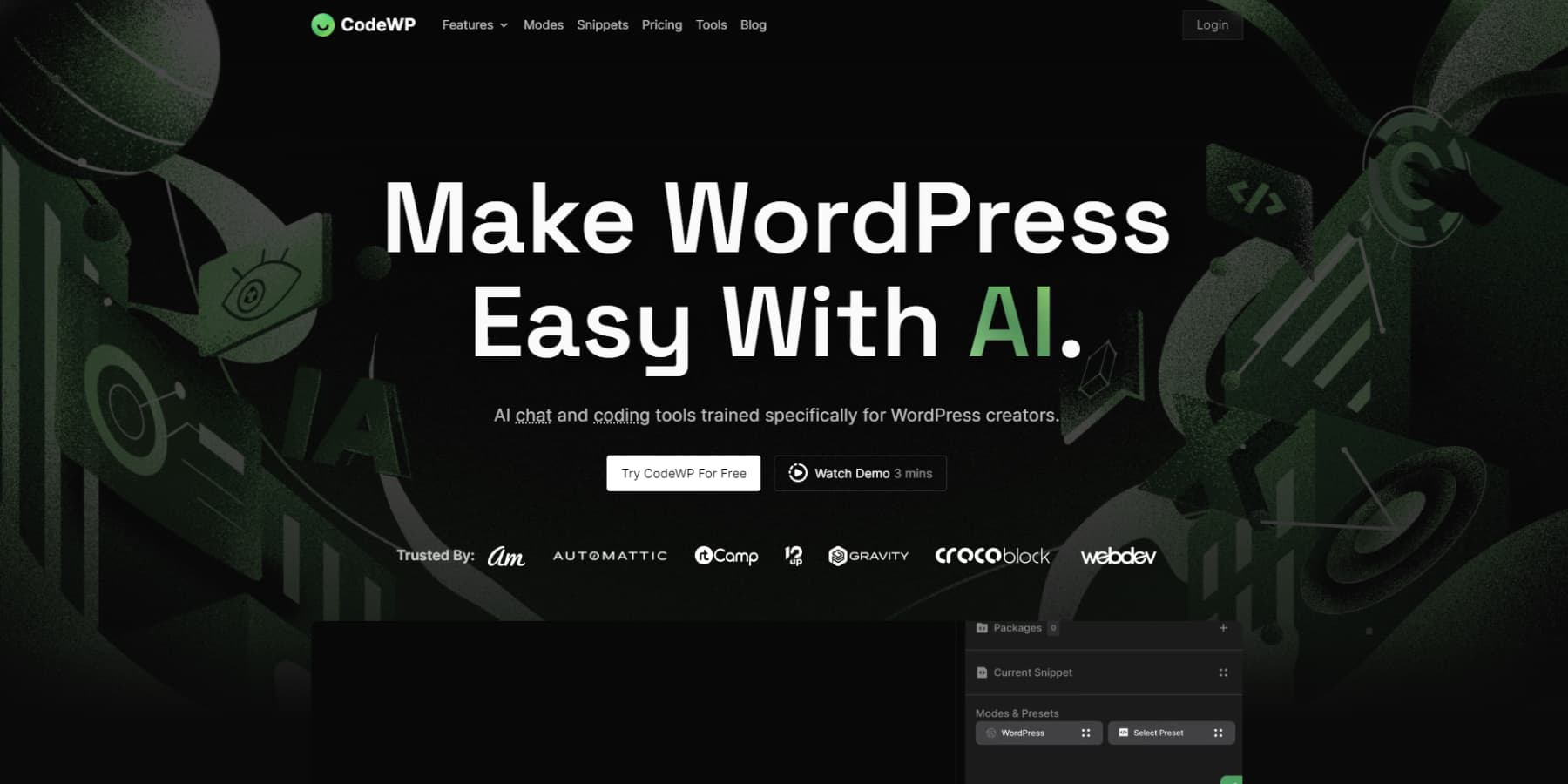
CodeWP aids WordPress development with cutting-edge AI technology. Thanks to its conversational coding feature, you can easily create code snippets and plugins by describing your needs. Get instant expert AI support and quick issue resolution, which can be used to plan and design unique features and website sections that won’t usually be possible natively in WordPress. CodeWP’s AI models are trained on popular plugins and services to ensure precise and compatible code generation.
Divi AI: For All the Above 😉
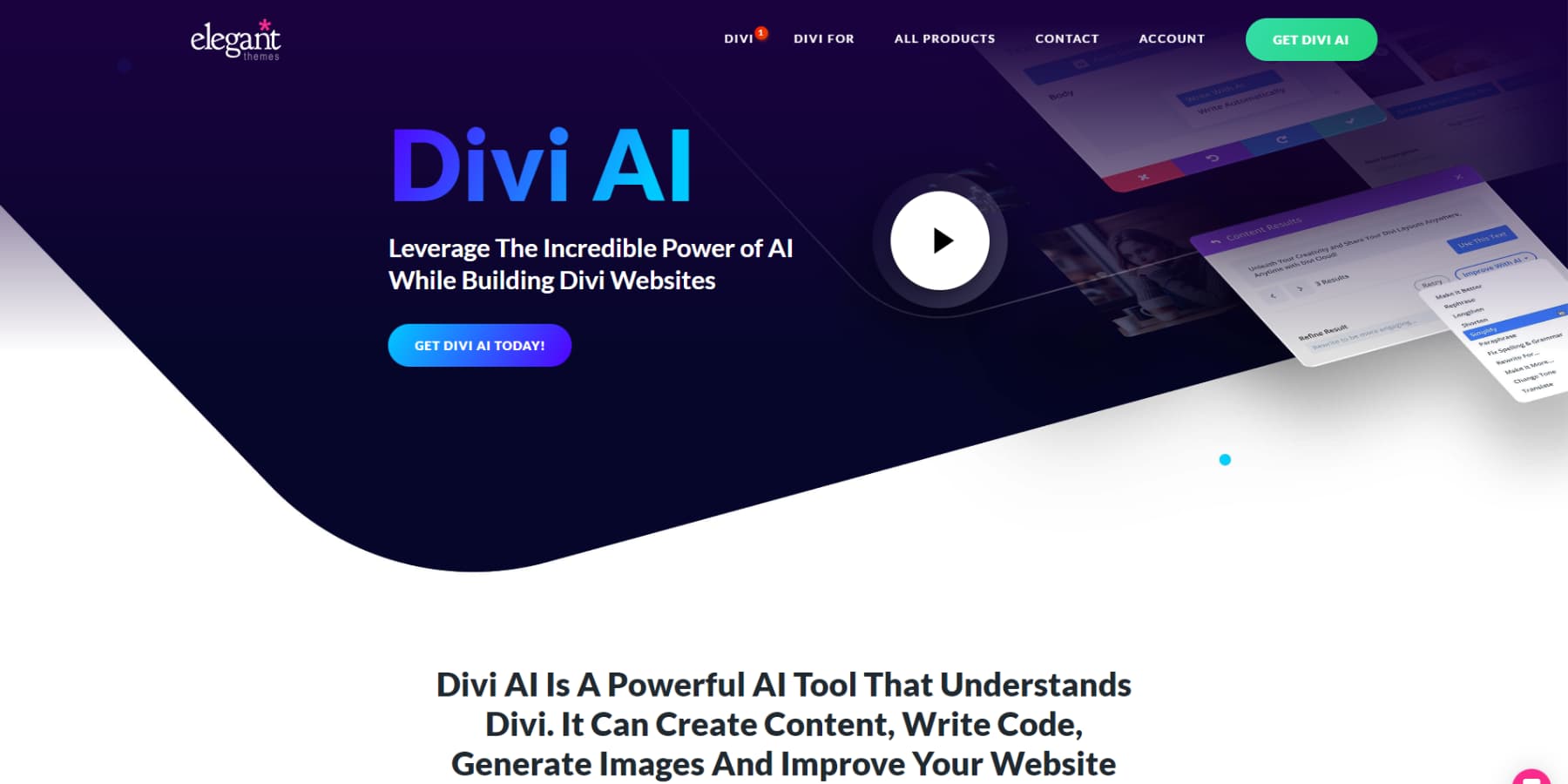
With Divi AI , you can easily create top-notch content and images for your website. You can also review and amend your writing’s grammar and syntax, translate it, enhance it, adjust its tone or size, generate images, expand images, use AI to add or remove objects from the image, and much more – all within the editor itself.
But there’s more to Divi AI than just that. You can generate personalized code for any custom design needs, which may be tricky with standard modules. Additionally, you can design a webpage using Divi AI by providing a detailed prompt. And guess what? There are no restrictions on the amount of text or images you produce or the number of websites you utilize Divi AI for – yes, even your clients’ sites.
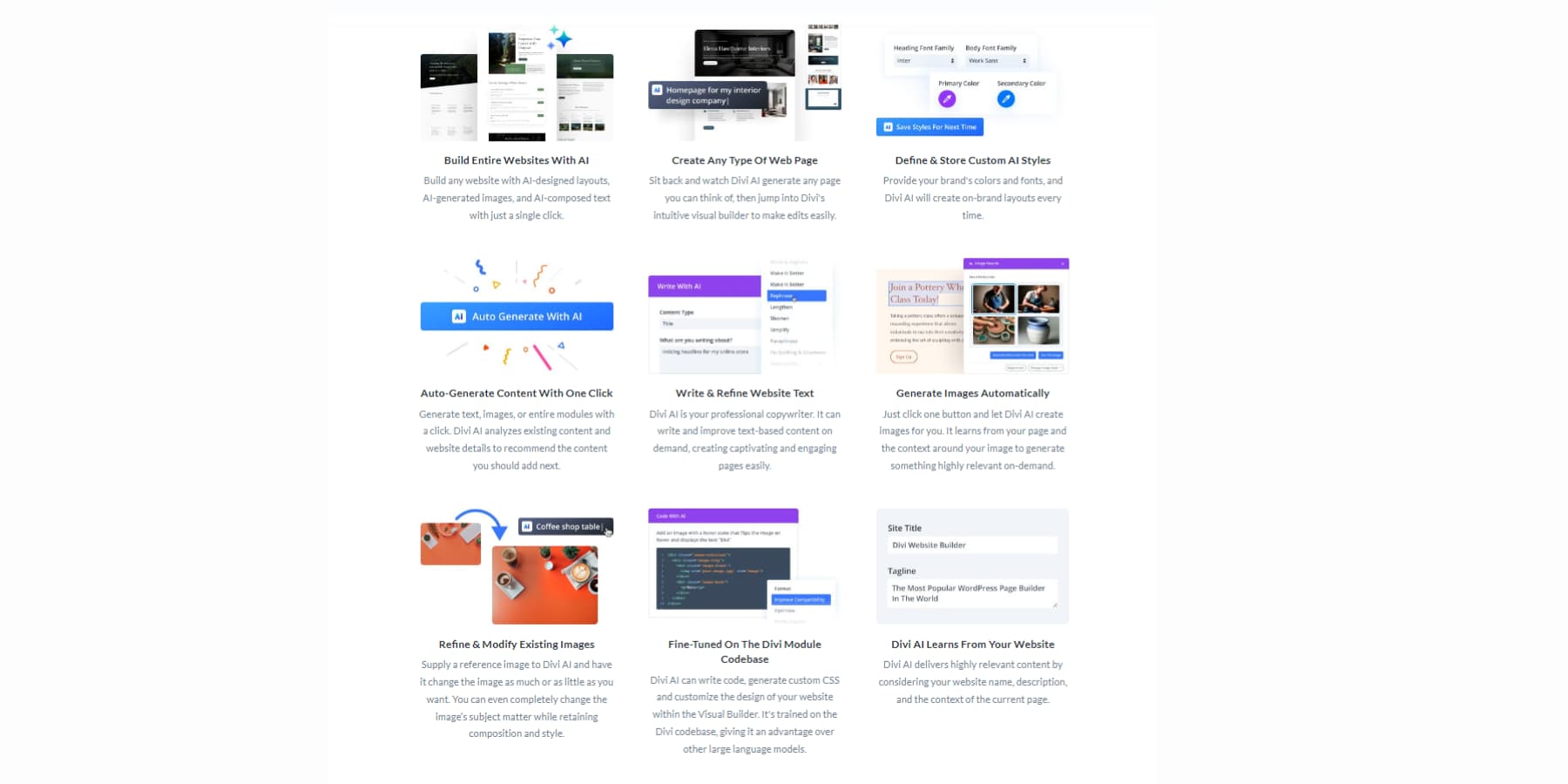
These aspects make Divi AI an incredibly cost-effective AI tool that should be part of your web design toolkit. It’s not only budget-friendly but also very versatile. You can try out Divi AI for free for up to 10 iterations on your Divi setup, after which the pricing starts at just $16.08/month. If you’re new to Divi, you can unlock even more savings by clicking the button below to see the latest offer.
Get Divi + Divi AI
Thriving in The Freelance Industry
The freelance web design business is increasing, presenting many opportunities for those ready to take the plunge. Here are some practical tips to help you maintain your success and stay ahead of the competition.
Finding and Retaining Web Design Clients
In today’s competitive world of freelance web design, securing and keeping clients is a skill that combines creativity and strategy. Make sure you update your portfolio regularly with your most recent projects. Gathering client testimonials is crucial as they are strong evidence of your work quality. You can also use social media platforms to showcase these testimonials and establish trust.
One effective way to find consistent clients is through referrals. Referrals can lead to repeat business and have the highest conversion rate among all marketing approaches. To grow your client base further, consider attending industry events and actively networking to make new connections. Platforms like Meetup can be advantageous in this regard.
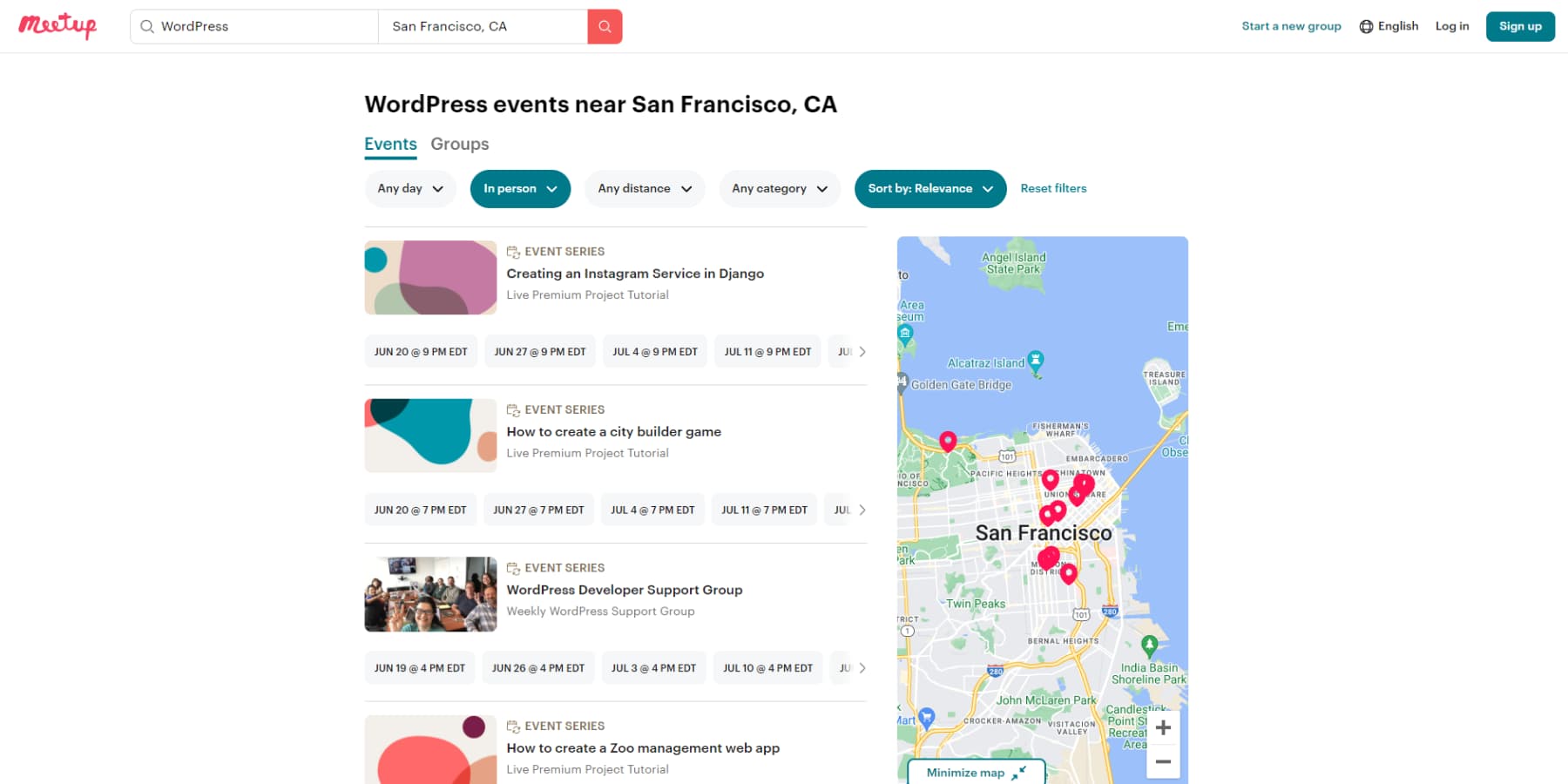
Lastly, keep yourself updated with the latest design tools and techniques to stay ahead in the field. You can establish a thriving freelance web design business with a loyal clientele by staying persistent, offering exceptional service, and being committed to continuous learning.
Specializing in a Niche as a Web Developer
Specializing in a specific niche can help you distinguish yourself in freelance web development. You can position yourself as an expert by focusing on a particular area.
As the saying goes, catching fish in a pond is easier than in the sea. You might be great at creating online stores or building complex web applications for startups. Concentrating on one area allows you to improve your skills and stay updated with the latest trends.
Clients look for experts who genuinely grasp their unique requirements. Keep learning about the newest trends and best practices in your niche. Over time, you will establish a strong reputation and build a loyal client base that values your specialized skills.
Building Additional Revenue Streams
Not every day is filled with sunshine. For that reason, developing additional methods of income could prove beneficial. Let’s explore these potential revenue streams, understand their significance, and learn how you might create one.
What is a Recurring Revenue?
Recurring revenue is the consistent income from existing customers through regular, predictable payments. This could be from subscriptions, memberships, or contracts. Unlike one-time sales, this model offers a reliable cash flow and financial stability, even if you take a break from actively working.
Why is it Important?
Recurring revenue is essential because it provides a steady income stream, reducing the financial uncertainty freelancers often experience. Unlike one-time consulting payments, recurring revenue guarantees consistent cash flow, helping cover ongoing expenses like rent and utilities.
This consistent income eases the stress of finding new projects, enabling you to focus on growth and enjoy more personal freedom. It acts as a financial safety net, supporting your long-term financial well-being.
Potential Recurring Revenue Streams
Now that you know what recurring revenue is and why it’s vital, let’s explore how you can earn this steady income from your clients:
Reselling Hosting
Hosting is vital for launching a website and can be a great source of recurring income. Setting up your hosting service involves finding servers, panels, and services, and you’ll have to handle support and server maintenance independently, which can be pretty challenging, especially if you lack technical skills.
Alternatively, you can consider reselling hosting through a platform like SiteGround Reseller . This allows you to benefit from their hardware, excellent support, and software while branding the service as your own to maintain trust and professionalism.
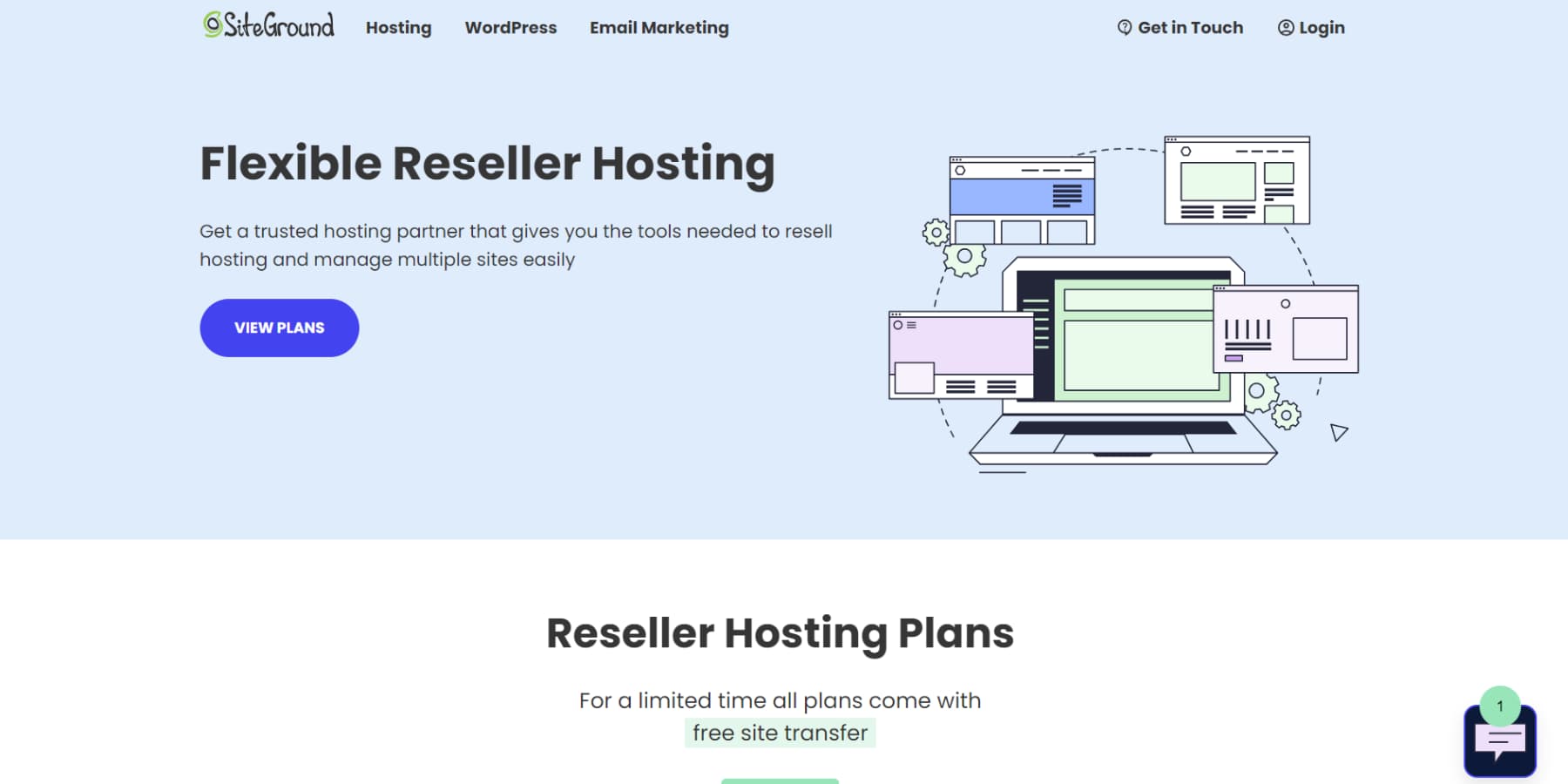
Offering Maintenace Packages
A WordPress website can be infinitely extended using its robust themes, plugins, and extensions repository. However, one crucial downside is that these components must be constantly updated to maintain compatibility and secure the website. Updating plugins can be a menial but time-consuming task, especially for clients who would rather spend time working on their business.
Using this point, you can convince your clients to offload the maintenance task to you for a fixed monthly fee. You can even include the plugins mentioned in the Best WordPress Plugins section as part of this maintenance package, as most of them offer agency or developer license, which individually costs less than personal licenses.
However, updating and maintaining multiple sites individually can become a rather headache-inducing task as you build your client base. This is where a plugin, like MainWP , enables you to manage multiple websites from a consolidated dashboard with just a few clicks.
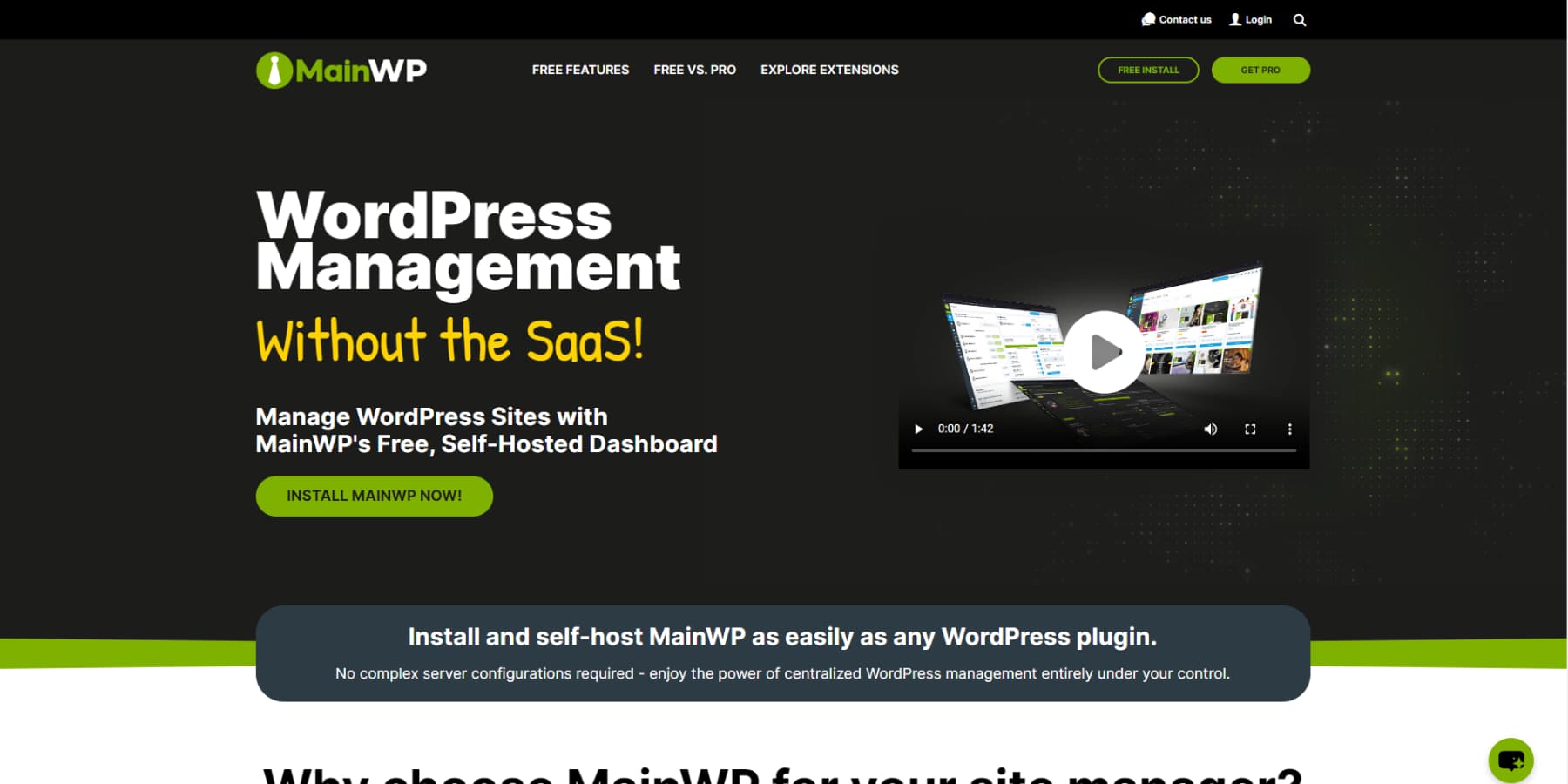
Creating and Selling Templates
Once you hone your skills as a Divi designer, you can create layouts and templates to sell them on platforms like Divi’s marketplace . This benefits you in two ways. It generates additional income on autopilot and serves as a way to showcase your skills, attracting more clients who may be interested in your personalized design services.
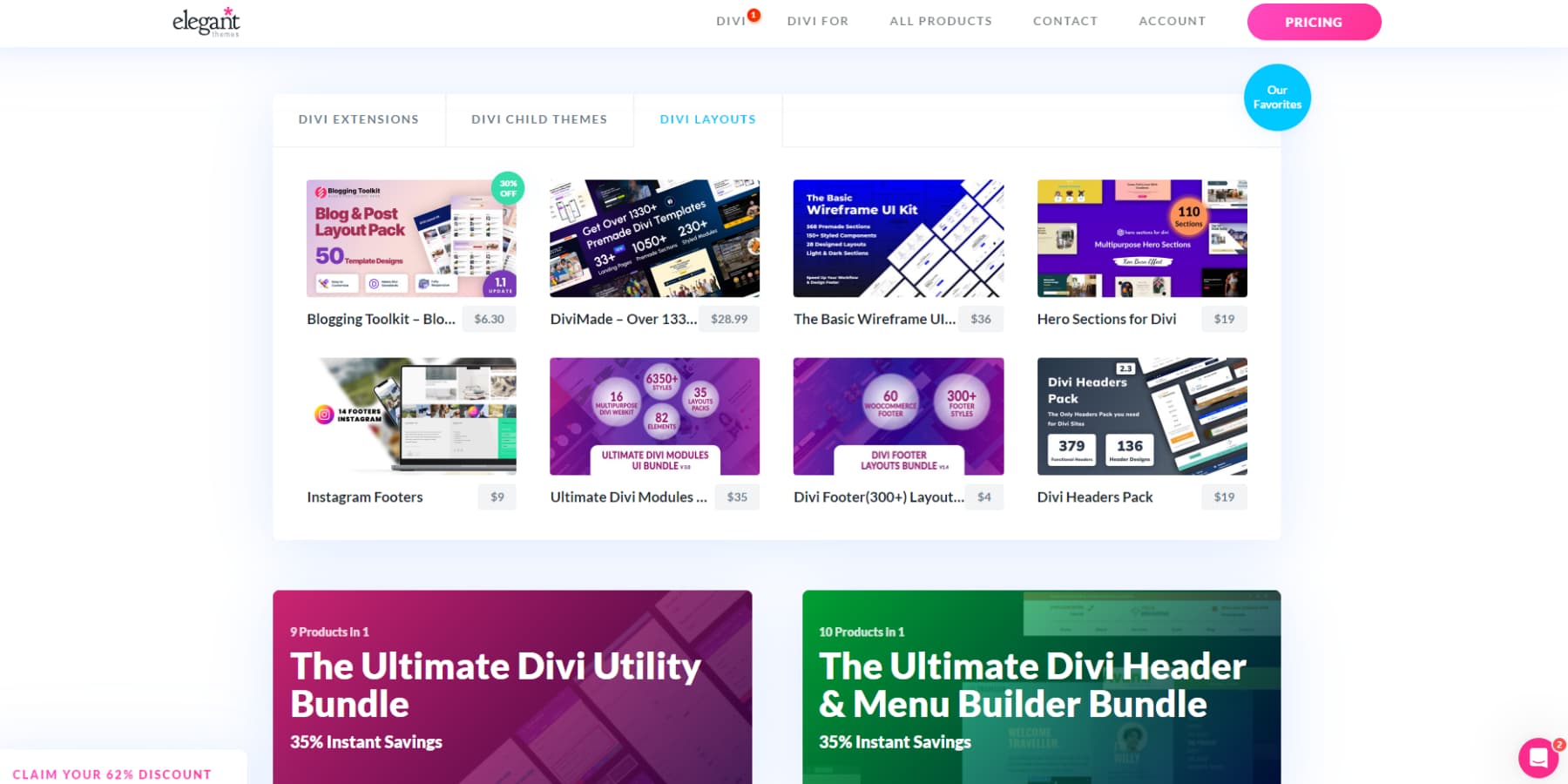
Becoming a Freelance Web Designer: Got What it Takes?
Becoming a successful freelance web designer is no easy feat, but the journey is far from impossible. The perks that come with it are truly rewarding: the liberty of being your boss, planning your schedule, and engaging in projects that fuel your creativity.
With solid allies like the ones listed below by your side, launching your web design venture swiftly is within reach without following the conventional path, which may take months to learn.
| Featured Product | Description | ||
|---|---|---|---|
| 1 | Website Building Software | ||
| 2 | The Best WordPress Hosting Service | ||
| 3 | The Best WordPress Theme for Freelancers | ||
| 4 | Best AI Assistant For Website Building | ||
| 5 | A Great Resource To Find Extenstions To Divi | ||
| 7 | A perfect place to find your first gig | ||
| 8 | The Best Wordress Performance Plugin | ||
| 9 | Best Image Optimization Plugin | ||
| 10 | A Formidable Place to Learn Basic Coding | ||
| 11 | Best Tool For Prototyping | ||
| 12 | Best Security Plugin | ||
| 13 | Best Backup Plugin | ||
| 14 | Best SEO Plugin | ||
| 15 | Best Analytics Plugin | ||
| 16 | Best AI Writing Assistant | ||
| 17 | Best Host Reselling Platform For Recurring Income | ||
| 18 | Best Dashboard Plugin To Manage Multiple WordPress Websites |
Stay at the forefront by honing your skills, staying updated on design trends, and building a solid portfolio with Divi to attract clients who value your unique style. As your business grows, you may integrate tools like Divi Teams , Cloud , and VIP for a smooth transition to a business you can no longer handle alone. Succeeding in freelancing requires dedication, discipline, and a genuine love for creating exceptional online experiences. And if you have made it so far, we believe you have all of those!

Get Started With Divi!
Explore plans, pricing and features. Click here to get started. 👇
Explore plans, pricing and features here. 👇
Aayush, a writer with a flair for detail, champions open-source software and is a reservoir of intriguing facts. As a WordPress aficionado, he navigates the areas of design, development, and marketing, bridging the gaps between these areas of interest.
Explore Divi, The Most Popular WordPress Theme In The World And The Ultimate Page Builder

Check Out These Related Posts

- How to Make a Real Estate Website with WordPress in 2024
Updated on July 10, 2024 in WordPress
You have your real estate license and your first few word-of-mouth clients. Now, you’re ready to elevate your real estate business with a professional website. Creating an affordable yet effective website is a crucial step. In this guide, we’ll show you exactly how to build a real...
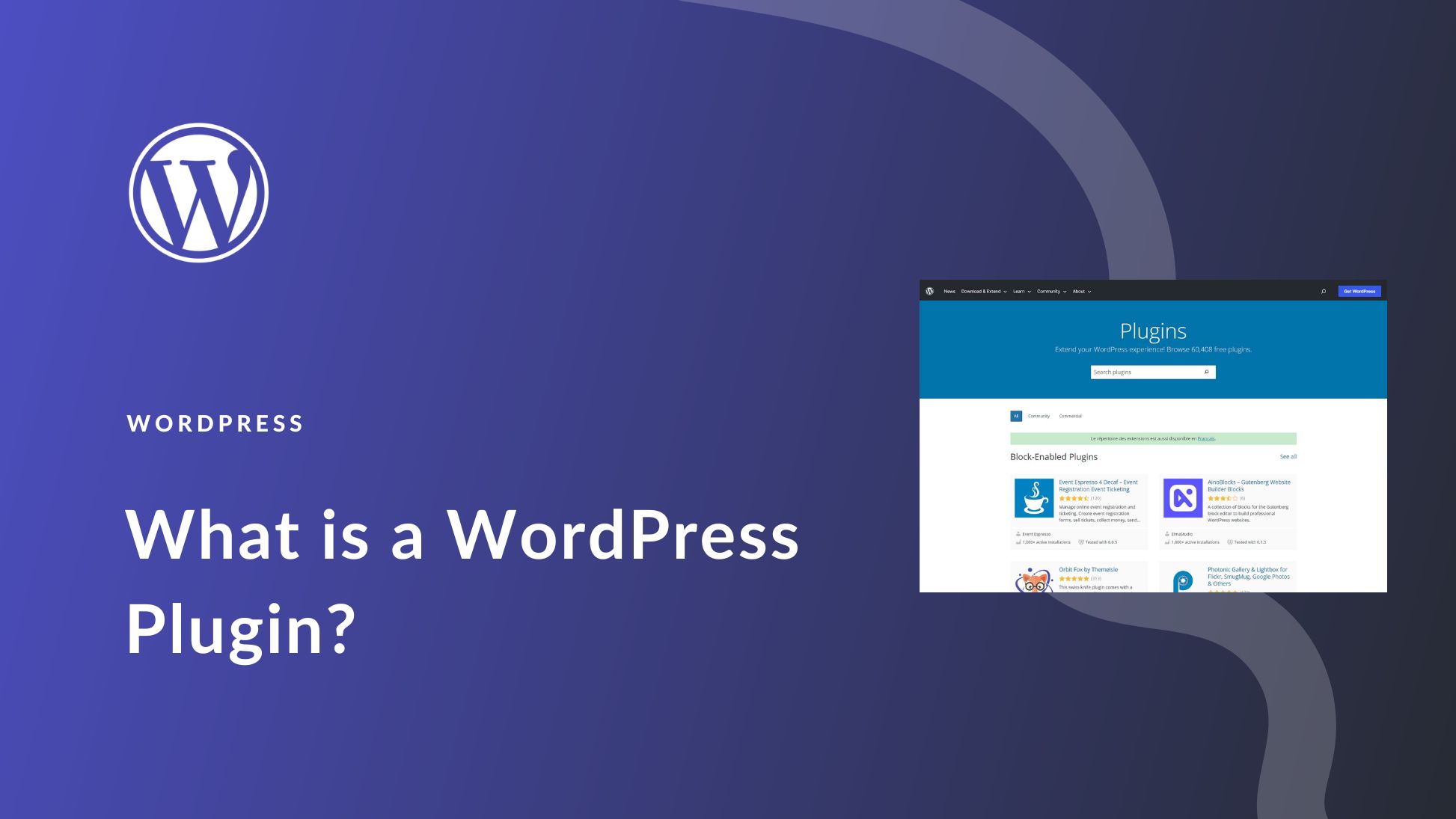
- What is a WordPress Plugin? A Beginner’s Guide for 2024
Posted on July 7, 2024 in WordPress
Ever wondered how top websites achieve such high functionality and performance? For WordPress users, the answer lies in plugins. Easily installed from the WordPress Plugin Directory or manually uploaded, plugins can transform your website and streamline your workflow. Below, we’ll show you...
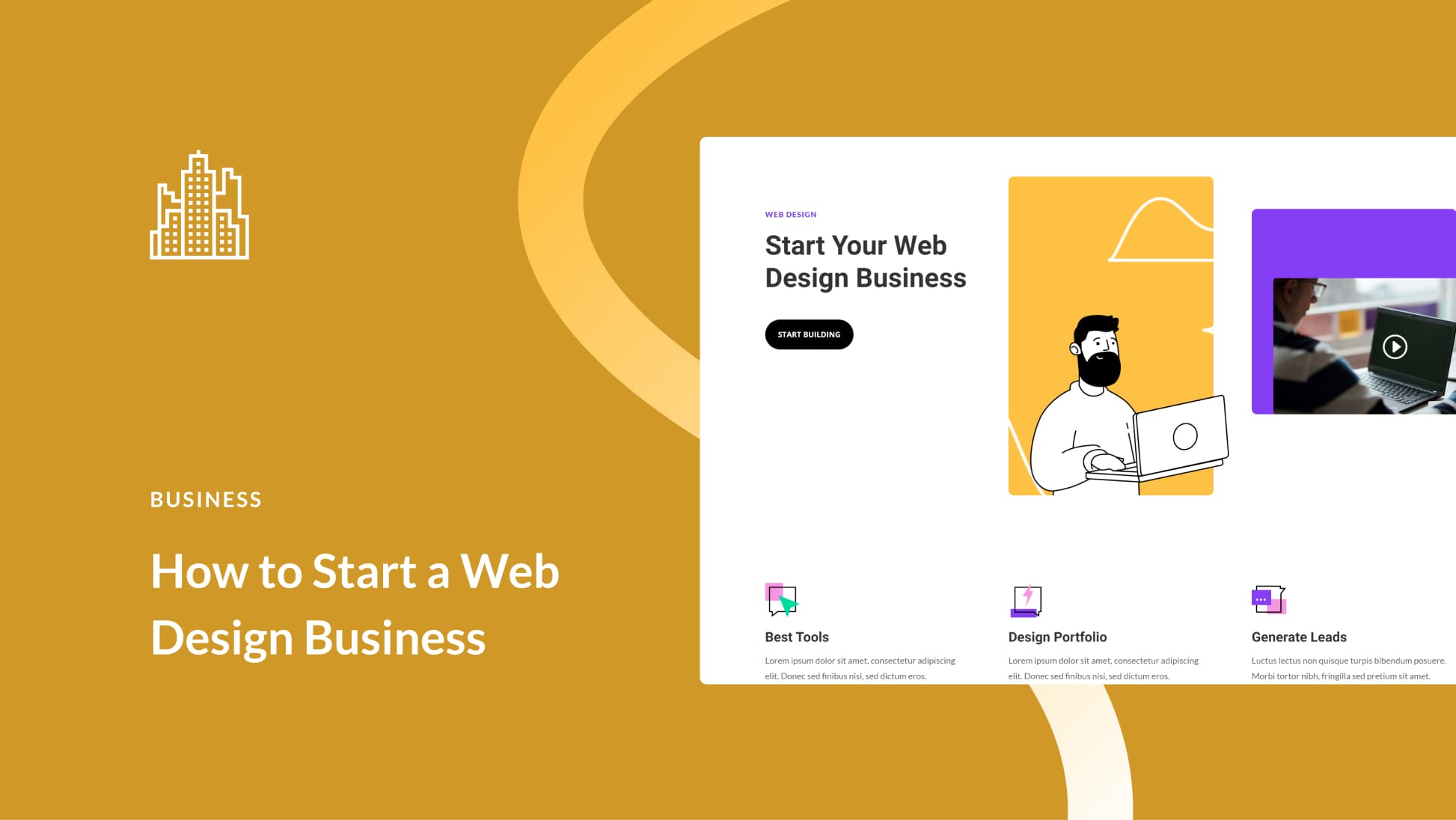
How to Start a Web Design Business (2024 Guide)
Posted on June 30, 2024 in Business
The internet has exploded in the last decade, and more businesses are establishing online presence than ever before. With online competition at an all-time high, a well-designed website is no longer a luxury – it’s a necessity. This surge in demand for high-quality websites creates a...
Leave A Reply Cancel reply
- Recent Posts
- New Divi Starter Site for Real Estate (Quick Install)
- Get a Free Water Non Profit Layout Pack For Divi
- Divi Resources
- Theme Releases
- Tips & Tricks
974,872 Customers Are Already Building Amazing Websites With Divi. Join The Most Empowered WordPress Community On The Web
We offer a 30 Day Money Back Guarantee, so joining is Risk-Free!
Divi Features
- All Features Explore Divi
- Divi Modules
- Divi Layouts
- Quick Sites Brand New!
- No-Code Builder
- Ecommerce Websites
- Theme Builder
- Marketing Platform
- Speed & Performance
- Premium Support
- Divi Marketplace
- Divi Hosting
- Extra Theme
- Bloom Plugin
- Monarch Plugin
- Plans & Pricing Get Divi Today
- Documentation
- Help Articles & FAQ
- 24/7 Support
- Developer Docs
- System Status
- Product Updates
- Best Plugins
- Best Hosting
- Divi Meetups
- Divi Facebook Group
- Divi Examples
- Divi Integrations
- Divi Reviews
- Community Forum
- Affiliate Program
- Terms of Service
- Privacy Policy
Copyright © 2024 Elegant Themes ®
Your favourite senior outside college
Home » Job Tips » Job Search Tips » How To Get A Web Developer Job
How to Get a Web Developer Job?: A Comprehensive Guide
The demand for skilled web developers continues to increase as businesses seek to establish and enhance their online presence. Whether you are an experienced coder looking to advance your career or a recent graduate eager to break into the industry, the process of securing a web developer job involves a strategic blend of technical proficiency, practical experience, and effective job search strategies. In this blog, we will discuss how to get a web developer job with steps to follow, various job roles, and tips for candidates with no experience to secure jobs in web development.
Table of Contents
How to Get a Web Developer Job?
If you are wondering how to get a web developer job, here are some useful steps you can follow to get started:
1. Get the Required Qualifications
The first step in getting a web developer job is acquiring the right degree. If you are a recent high school graduate embarking on your college journey, enroll in a formal degree course that will equip you with competencies for web development jobs. You can choose to pursue a B.Sc. or B. Tech. in computer science or a related field. It is an excellent step to enter the world of programming. An undergraduate degree will help you gain the essentials of the field in terms of knowledge that you can apply professionally.
If you have completed graduate studies in a different stream, you can opt for a full-stack development course with a placement guarantee . This course will offer expertise in the front-end and back-end web development processes.

2. Portfolio Development
While thinking about how to get hired as a web developer, take the necessary actions to build your profile. Create a portfolio of the programming work that can be extended to employers along with the job application.
The portfolio should mention the web development projects you have worked on and the coursework you have completed during the degree. You must choose the ones that display your skills and make your profile stand out. You can also contribute to open-source projects on platforms like GitHub. This shows potential employers your ability to work with others and contribute to large codebases.
3. Work Experience
If you are a student aspiring to a career in web development, you will find yourself in the tassel of studying and gaining expertise. However, you can acquire work exposure by following the tips shared:
- Apply for Internships: Look for web development internship opportunities at tech companies. Even unpaid internships can provide valuable experience and networking opportunities.
- Try Networking: Connect with professionals in the industry on LinkedIn and attend local tech meetups or conferences to find internship opportunities.
- Get Freelance Work: Offer your services on freelancing platforms like Upwork, Fiverr, or Freelancer to build projects and gain client feedback.
- Participate in Hackathons and Competitions: Participate in hackathons and coding competitions to work on projects in a collaborative and competitive environment.
- Gain Certifications: Certifications in HTML, CSS, JavaScript, and frameworks like React and Angular can add credibility to your resume.
4. Job Application
To enhance your understanding of how to get hired as a web developer, you should explore ways to apply for jobs. You can find the latest entry-level web developer jobs on job search portals like Internshla, Indeed, and more.
To apply and secure your dream job position, you will need a compelling job application consisting of a resume and a cover letter (if applicable). Ensure to use professional resume formats to provide all the necessary information regarding your educational qualifications, skills, achievements, etc. Further, to understand how to draft a cover letter, check out the web developer cover letter example.
Job Roles Related to Web Development
Web development is a dynamic and rapidly evolving field that offers a wide range of job roles, each requiring a unique skillset and knowledge. From designing user-friendly interfaces to managing robust backend systems, web developers play a crucial role in creating and maintaining digital platforms. In this section on how to get a web developer job, we will explore the top web development roles.
a. Front-End Web Developer:
Front-end web developers focus on the website’s user-facing pages and sides. They create user interfaces that promise a compelling design for users.
Average Salary Range: ₹2.2 LPA – ₹12.3 LPA
b. Back-End Web Developer:
These developers specialize in the back-end or architecture of the websites. They play a major role in optimizing hidden elements that may not be visible to users. They also design databases and use programming languages like Python , CSS, and PHP.
Average Salary Range: ₹2.4 LPA – ₹18 LPA
c. Full-Stack Web Developer:
Full-stack web developers handle both the client and server sides of the development project. They work on the user interface and the backend architecture of the website or web application.
Average Salary Range: ₹2.8 LPA – ₹16.2 LPA
d. Web Developer:
They focus on the codes that ensure the smooth running of the website or app. These professionals are competent in machine learning technology, followed by system analysis and database management. They work closely with designers to create user-friendly interfaces that integrate well with the back-end technologies.
Average Salary Range: ₹2.5 LPA – ₹9.6 LPA
e. Web Designer:
Designers emphasize the front-end feel and website aesthetics. They play a significant role in coordinating, crafting, and optimizing the visual components that help add to the visual appeal of the app or website. Also, they play a significant role in site content integration and brand voicing with accuracy.
Average Salary Range: ₹3 LPA – ₹10 LPA
Essential Skills to Get a Web Developer Job
A web developer should possess technical skills in programming, backend or frontend development tools and techniques, etc. Some essential web developer skills include the following:
- Coding: Web development requires a strong understanding of computer codes. You should be hands-on with this knowledge and its application. Coding helps develop web pages and software to meet client expectations. Tutorials, programs, and online codes help you learn coding.
- HTML/CSS: Proficiency in CSS (Cascading Style Sheets) and HTML (HyperText Markup Language) is fundamental for any web developer. HTML is the backbone of all web pages, providing the structure and content, while CSS is used to style and layout these pages, ensuring they are visually appealing and user-friendly. A solid understanding of these technologies is crucial for building the foundation of web development.
- Responsive Web Design: An excellent understanding of responsive web design is crucial. Ensuring that websites are accessible and look great on all devices, from desktops to smartphones, is a key skill for web developers. This involves using media queries and other techniques to create responsive designs. Familiarity with frameworks such as Bootstrap can facilitate this process, providing pre-designed components and layouts that adapt to different screen sizes.
- Front-End Frameworks: Proficiency in modern front-end frameworks like React, Angular, or Vue.js is essential for building dynamic and interactive user interfaces. These frameworks offer powerful tools and components that streamline the development process, improve code maintainability, and enhance user experience.
- Back-End Development: Knowledge of server-side languages such as Node.js, Python , Ruby, PHP, or Java is important for back-end development. Additionally, familiarity with frameworks like Express.js, Django, Ruby on Rails, or Spring is beneficial. These tools help in building robust server-side applications, managing databases, and handling business logic.
- Databases: Understanding both SQL and NoSQL databases is essential for managing and storing data effectively. While SQL databases like PostgreSQL and MySQL are known for their reliability and structured query capabilities, NoSQL databases like MongoDB can handle unstructured data.
- APIs and RESTful Services: The ability to work with and integrate various APIs (application programming interfaces) is crucial for web development. Understanding RESTful services and how to create and consume RESTful APIs allows developers to enable communication between different software systems, enhancing the functionality and interoperability of web applications.
- Graphic Designing: Your quest to get a web developer job is incomplete until you can design an aesthetically appealing product. The developers must have graphic design skills and use their creativity to make attractive pages for people so that the user gets what they are looking for
- Problem-Solving: Web developers should know how to identify bugs and resolve coding issues when they develop code. Problem-solving skills are essential to improving the coding script and the user interface and functionalities of the website or application.
- Attention to Detail: The ability to pay close attention to detail helps web developers deliver robust, user-friendly, and secure websites. By focusing on precision in coding, thoughtful UI design, and meticulous testing, developers ensure their creations meet high standards and exceed user expectations.
Explore how to get a web developer job path with the steps provided above. From completing your education to preparing a job application and applying for relevant jobs, kickstarting your web development career requires deliberation and preparation. This ensures that you find the right job opportunities for you. You should explore different job roles in the web development domain to determine the one that aligns with your interests and skills. If you do not possess relevant experience, utilize tips like working on open-source projects, applying for freelance gigs, volunteering, and more to secure web development jobs.
Are you preparing to interview at a leading organization like Zoho? You can check out the top Zoho web developer interview questions to prepare.
Answer: Here is how you can get a web developer job without experience: Learn the basics by getting a formal education and completing a certification course. Pursue internships, collaborative and independent projects, and part-time jobs to kickstart your web development journey. Connect with industry professionals through networking events, job fairs, professional networking platforms, etc.
Answer: Yes, it is possible to get a job as a web developer in 6 months. Many online courses will help you improve your skills as a web developer. You can enroll in certification courses that will help you with placement. These courses provide an in-depth understanding of basic and advanced web development concepts and offer job search and application assistance.
Answer: While a degree in computer application is helpful, it is not mandatory for getting a web developer job. You can pursue online certification courses offered by platforms like Internshala , to gain skills and expertise in web development, subsequently applying for suitable jobs. Additionally, you can join internships or open-source projects to network and then bag a role without any degree.
- ← Previous
- Next →

Harshita is an English Literature graduate from the University of Delhi with 3 years of experience in Content Writing and Editing. Dedicated to her craft, she loves creating magic with words. She is a big fan of hoarding cute planners and journals and can be seen watching FRIENDS (almost EVERYTIME) in her spare time. Her meticulous attention to detail makes her stand out from the crowd. A typo epidemic is her worst nightmare!
Related Post

How to Get a Job at Physics Wallah?: A Comprehensive Guide
Starting a career with Physics Wallah is an exciting prospect for many professionals in the education and technology sectors. It is one of the leading companies in the ed-tech industry,

How to Get a Job at Jio?: Steps & Tips
Jio, a subsidiary of Reliance Industries Limited, has revolutionized India’s telecommunications sector. By leveraging cutting-edge technology and strategic partnerships, Jio continues to lead the charge in transforming India into a

How to Get a Job at Salesforce: The Only Guide You Need in 2024
Salesforce is a leading cloud-based software company known for its customer relationship management (CRM) services. This American billion-dollar company attracts top talent from all around the globe and is a

How to Get a Job in IBM: A Comprehensive Guide
International Business Machines Corporation (IBM) is a multinational technology company renowned for its innovative solutions and advanced technologies. IBM offers a wealth of opportunities for individuals with various backgrounds and

- SMP WEDDINGS
- SMP’S VENUE BLOG
- LITTLE BLACK BOOK BLOG
- LBB INDUSTRY BLOG
- DESTINATION
- NEW ENGLAND
- THE NORTHWEST
- THE MIDWEST
- THE SOUTHWEST
- THE SOUTHEAST
- THE MID-ATLANTIC
- THE TRI-STATE AREA
Russia Weddings
- Real Weddings
- Bridal Week
- Engagements & Proposals
- Seasonal Wedding Trends
- Bridal Beauty
- Wedding Fashion Trends
- Vendor Guide
- DIY Projects
- Registry Guide
- Engagements & Proposals
- by Melissa Hammam
- comments ( )
Hands up if you’re ready to be dazzled! From a ceremony structure designed to float on water to a jaw-dropping reception room with flowers blooming from every service, we’re swooning over every bit of this wedding. If you can believe it, that’s just the beginning. Julia Kaptelova artfully shot every detail, like the ballet performance guests were treated to and snow falling from the ceiling for the first dance! Prepare to be amazed and take a visit to the full gallery .

From About You Decor … Our design is a symbol of dawn and a distant endless horizon. Ahead is a long, happy life without any borders. An international couple, Pavel and Cherry, met in London and have been walking together for many years.

From the Bride, Cherry… My husband and I we decided to have our summer wedding in Moscow because the city is where his roots are. As we knew we were going to have the other wedding ceremony in China, we wanted our Moscow one to be very personal and intimate. We’ve known each other since we were fourteen, together with many of our friends whom we’ve also known for a decade.

I didn’t want to walk down the aisle twice so the plausibility of my request quickly came into discussion. The open pontoon stage was constructed in order to facilitate the bridal entrance on water, although there were concerns about safety as the last thing we wanted was probably a drowned bride before she could get on stage, picture that! I have to say on that day it wasn’t easy to get on the pontoon stage from the boat, in my long gown and high heels. Luckily my bridesmaids still noticed even though they stood the furthest from me on the stage, and helped me out without prior rehearsal. My girls could just tell whenever I needed a hand or maybe they were just so used to my clumsiness. Who knows 😂
We all love our photographer Julia! She’s so talented and her style is so unique. Our beloved host Alex is exceptional who made everyone laugh and cry. It was truly a blessing to have so many kind and beautiful souls on our big day. Thank you all!

[iframe https://player.vimeo.com/video/384992271 600 338]
| Share this gorgeous gallery on |
Photography: Julia Kaptelova Photography | Wedding Planner: Caramel | Cake: Any Cake | Invitations: Inviteria | Rings: Harry Winston | Band: Menhouzen | Grooms attire: Ermenegildo Zegna | Wedding Venue: Elizaveta Panichkina | Bridesmaids’ dresses: Marchesa | Bridesmaids’ dresses: Alice McCall | Bride’s gown : Jaton Couture | Bride’s shoes: Manolo Blahnik | Decor : About you decor | Earrings: Damiani | Muah: Khvanaco Studio | Video: Artem Korchagin
More Princess-Worthy Ballgowns

I’m still not convinced this Moscow wedding, captured to perfection by Sonya Khegay , isn’t actually an inspiration session—it’s just that breathtaking. From the beautiful Bride’s gorgeous lace wedding dress and flawless hair and makeup to the pretty pastel color palette and stunning ceremony and reception spaces, this wedding is almost too good to be true. Do yourself a favor and see it all in The Vault now!

From Sonya Khegay … It was the last day of April and still very cold in the morning. The weather forecast wasn’t pleasing and no one expected that the sun would come out, but miracles happen and light rain gave way to the warm rays.
I love how all the details went together, you could feel the harmony in everything throughout the entire wedding day from the morning until the fireworks.
A gentle look of the bride, elegant but so airy and unique decor, the fresh and light atmosphere of early spring and, of course, true happiness in the eyes. My heart becomes so warm from these memories, it is always a pleasure to see the birth of a new family of two loving hearts.
Photography: Sonya Khegay | Event Design: Latte Decor | Event Planning: Ajur Wedding | Floral Design: Blush Petals | Wedding Dress: La Sposa | Stationery: Special Invite | Bride's Shoes: Gianvito Rossi | Hair + Makeup: Natalie Yastrebova | Venue: Rodniki Hotel
- by Elizabeth Greene
You really can’t go wrong with simple: a beautiful Bride , perfectly pretty petals , loved ones all around. But add in an amazing firework show to cap off the night and simple just became downright extraordinary. Captured by Lena Elisseva , with assistance by Katya Butenko , this rustic Russian celebration is simply fantastic. See it all in the Vault right here !

From Lena Eliseeva Photo … This cozy and warm summer wedding of gorgeous Natalia and Anton was in the middle of June. The young couple decided to organize their wedding themselves, and the day was very personal and touching. I am absolutely in love with rustic outdoor weddings, and this one is my favourite because of the free and easy atmosphere.
All the decor excluding the bride’s bouquet was made by a team of ten friends of the bride and groom. And it was charming – a light and beautiful arch, eco-style polygraphy and succulents, candy-bar with caramel apples and berries – sweet joys of summer.
At the end of ceremony the guests tossed up white handkerchiefs embroidered by Natalia’s own hands.
The most touching moment was the happy eyes of the groom’s grandmother, the most estimable person on the wedding. And the fireworks were a bright end to that beautiful day.

Photography: LENA ELISEEVA PHOTO | Floral Design: Katerina Kazakova | Hair And Makeup: Svetlana Fischeva | Photography - Assistance: Katya Butenko
These photos from Lena Kozhina are so stunningly beautiful – as in you can’t help but stop and stare – it’s hard to believe it’s real life. But these pics are proof of this gorgeous Bride and her handsome Groom’s celebration at Moscow’s Fox Lodge , surrounded by vibrant colors and breathtaking blooms . Oh, and the idea of prepping for your Big Day outside in the sun ? Brilliant. See more bright ideas right here !

From Lena Kozhina … When we met with the couple for the first time, we immediately paid attention to Dima’s behavior towards Julia. There was a feeling of tenderness and awe, and we immediately wanted to recreate this atmosphere of love, care and warmth on their Big Day.
Later, when we had chosen a green meadow and an uncovered pavilion overlooking a lake as the project site, it only highlighted a light summer mood with colorful florals and a great number of natural woods. The name of the site is Fox Lodge and peach-orange color, as one of the Bride’s favorites, set the tone for the whole design – from the invitations, in which we used images of fox cubs to elements of serving guest tables and other decorative elements with the corresponding bright accents.
Photography: Lena Kozhina | Event Planning: Ajur Wedding | Wedding Dress: Rosa Clara | Shoes: Marc Jacobs | Catering: Fox Lodge | Makeup Artist: Elena Otrembskaya | Wedding Venue: Fox Lodge | Cake and Desserts: Yumbaker | Decor: Latte Decor
The Unique Burial of a Child of Early Scythian Time at the Cemetery of Saryg-Bulun (Tuva)
<< Previous page
Pages: 379-406
In 1988, the Tuvan Archaeological Expedition (led by M. E. Kilunovskaya and V. A. Semenov) discovered a unique burial of the early Iron Age at Saryg-Bulun in Central Tuva. There are two burial mounds of the Aldy-Bel culture dated by 7th century BC. Within the barrows, which adjoined one another, forming a figure-of-eight, there were discovered 7 burials, from which a representative collection of artifacts was recovered. Burial 5 was the most unique, it was found in a coffin made of a larch trunk, with a tightly closed lid. Due to the preservative properties of larch and lack of air access, the coffin contained a well-preserved mummy of a child with an accompanying set of grave goods. The interred individual retained the skin on his face and had a leather headdress painted with red pigment and a coat, sewn from jerboa fur. The coat was belted with a leather belt with bronze ornaments and buckles. Besides that, a leather quiver with arrows with the shafts decorated with painted ornaments, fully preserved battle pick and a bow were buried in the coffin. Unexpectedly, the full-genomic analysis, showed that the individual was female. This fact opens a new aspect in the study of the social history of the Scythian society and perhaps brings us back to the myth of the Amazons, discussed by Herodotus. Of course, this discovery is unique in its preservation for the Scythian culture of Tuva and requires careful study and conservation.
Keywords: Tuva, Early Iron Age, early Scythian period, Aldy-Bel culture, barrow, burial in the coffin, mummy, full genome sequencing, aDNA
Information about authors: Marina Kilunovskaya (Saint Petersburg, Russian Federation). Candidate of Historical Sciences. Institute for the History of Material Culture of the Russian Academy of Sciences. Dvortsovaya Emb., 18, Saint Petersburg, 191186, Russian Federation E-mail: [email protected] Vladimir Semenov (Saint Petersburg, Russian Federation). Candidate of Historical Sciences. Institute for the History of Material Culture of the Russian Academy of Sciences. Dvortsovaya Emb., 18, Saint Petersburg, 191186, Russian Federation E-mail: [email protected] Varvara Busova (Moscow, Russian Federation). (Saint Petersburg, Russian Federation). Institute for the History of Material Culture of the Russian Academy of Sciences. Dvortsovaya Emb., 18, Saint Petersburg, 191186, Russian Federation E-mail: [email protected] Kharis Mustafin (Moscow, Russian Federation). Candidate of Technical Sciences. Moscow Institute of Physics and Technology. Institutsky Lane, 9, Dolgoprudny, 141701, Moscow Oblast, Russian Federation E-mail: [email protected] Irina Alborova (Moscow, Russian Federation). Candidate of Biological Sciences. Moscow Institute of Physics and Technology. Institutsky Lane, 9, Dolgoprudny, 141701, Moscow Oblast, Russian Federation E-mail: [email protected] Alina Matzvai (Moscow, Russian Federation). Moscow Institute of Physics and Technology. Institutsky Lane, 9, Dolgoprudny, 141701, Moscow Oblast, Russian Federation E-mail: [email protected]
Shopping Cart Items: 0 Cart Total: 0,00 € place your order
Price pdf version
student - 2,75 € individual - 3,00 € institutional - 7,00 €

Copyright В© 1999-2022. Stratum Publishing House

34 Facts About Balashikha
Written by Rea Cartwright
Modified & Updated: 01 Jun 2024
Reviewed by Jessica Corbett

Balashikha, a vibrant city situated in the Moscow Oblast of Russia, is a captivating blend of rich history, cultural heritage, and modern developments. As you delve into the heart of Balashikha, you'll discover a myriad of fascinating facts that unveil the essence and allure of this dynamic locale. From its intriguing historical landmarks to its flourishing arts and cultural scene, Balashikha beckons visitors to explore its multifaceted identity.
In this article, we'll embark on a journey to unravel 34 captivating facts about Balashikha, offering a comprehensive glimpse into its past, present, and future. Whether you're a history enthusiast, an avid traveler , or simply curious about this enchanting city, these facts will provide an enriching insight into the unique tapestry of Balashikha. Let's venture into the realm of Balashikha and uncover the wonders that await within its embrace .
Key Takeaways:
- Balashikha, a city in Russia, has over 215,000 residents and offers a vibrant cultural scene with museums, theaters, and traditional festivals. It’s a blend of tradition and modernity, making it a captivating destination for exploration and discovery.
- Nestled on the banks of the picturesque Pekhorka River, Balashikha embraces its natural surroundings, providing tranquil retreats like the Balashikha Forest Park and the Botanical Garden. The city’s diverse cultural tapestry invites visitors to savor unique flavors and traditions.
Balashikha is a city in Russia.
Located in the Moscow Oblast, Balashikha is a prominent city in the Moscow metropolitan area, known for its rich history and cultural significance.
The city has a population of over 215,000 people.
Balashikha is home to a diverse community, with a population of over 215,000 residents contributing to the city's vibrant atmosphere.
Balashikha is situated on the Pekhorka River.
The picturesque Pekhorka River flows through the city, adding to the natural beauty and charm of Balashikha.
The city experiences a humid continental climate.
Balashikha's climate is characterized by distinct seasonal changes, with warm summers and cold winters shaping the local environment.
Balashikha is known for its cultural landmarks.
The city boasts a rich cultural heritage, with numerous landmarks and attractions that reflect its historical and artistic significance.
The Balashikha Museum of History and Art is a popular cultural institution.
This renowned museum showcases the city's history and artistic achievements, offering visitors a captivating journey through Balashikha's past and present.
The city has a strong industrial presence.
Balashikha is home to various industries, contributing to the economic vitality and development of the region.
Balashikha is in close proximity to Moscow.
The city's strategic location near the Russian capital provides residents with convenient access to the cultural and economic opportunities offered by Moscow.
The Balashikha Arena is a prominent sports and entertainment venue.
This modern arena hosts a wide range of events, including sports competitions, concerts, and cultural performances, enriching the city's entertainment scene.
Balashikha has a rich tradition of folk music and dance.
The city's cultural heritage is celebrated through vibrant folk music and traditional dance performances , showcasing the local artistic talent.
The Balashikha Forest Park offers a tranquil natural retreat.
Residents and visitors can enjoy the serene beauty of the Balashikha Forest Park, a peaceful escape from the urban bustle.
The city's economy is diverse and dynamic.
Balashikha's economic landscape encompasses various sectors, fostering growth and innovation within the local business community.
Balashikha has a network of educational institutions.
The city is committed to providing quality education, with a network of schools and colleges catering to the academic needs of its residents.
The Balashikha Central Market is a bustling hub of commerce.
This vibrant market showcases local produce, crafts, and goods, serving as a focal point for economic activity and community interaction.
Balashikha is known for its traditional cuisine.
The city's culinary traditions reflect a blend of flavors and recipes unique to Balashikha, offering a delightful culinary experience for food enthusiasts.
The Balashikha Drama Theater is a cultural gem.
The theater enriches the city's cultural scene with captivating performances, showcasing the talent and creativity of local and international artists.
Balashikha has a strong sense of community spirit.
The city's residents are known for their warm hospitality and strong community bonds, creating a welcoming and inclusive environment.
The Balashikha Music School nurtures young talent.
Aspiring musicians receive quality training at the music school, contributing to the city's vibrant music culture and artistic legacy .
Balashikha celebrates traditional festivals and events.
The city's calendar is filled with colorful festivals and events that highlight its cultural diversity and heritage, attracting visitors from near and far.
The Balashikha History and Architecture Museum preserves the city's legacy.
This esteemed museum showcases the architectural heritage and historical legacy of Balashikha, offering valuable insights into the city's evolution over time.
Balashikha is a hub for creative arts and crafts.
Artisans and crafters contribute to the city's creative tapestry, producing unique works of art that reflect Balashikha's artistic identity.
The city has a strong tradition of winter sports.
Balashikha's winter sports enthusiasts enjoy a range of activities, from ice skating to skiing, embracing the winter season with enthusiasm and energy.
Balashikha's architectural landmarks are a testament to its history.
The city's architectural marvels stand as a testament to its rich history, with iconic buildings and structures shaping its urban landscape.
The Balashikha Youth Theater fosters young talent.
Aspiring actors and performers find a platform for artistic expression at the youth theater, contributing to the city's vibrant cultural scene.
Balashikha's public parks offer recreational spaces for residents.
The city's well-maintained parks provide residents with inviting spaces for leisure, relaxation, and outdoor activities.
The Balashikha Philharmonic Society promotes musical excellence.
Musical enthusiasts can indulge in captivating performances at the philharmonic society, where talented musicians showcase their artistry.
Balashikha's local businesses contribute to its economic vitality.
The entrepreneurial spirit thrives in Balashikha, with local businesses playing a significant role in driving the city's economic growth and prosperity.
The Balashikha City History Museum chronicles the city's past.
Visitors can explore the city's historical narrative at the history museum, delving into the events and milestones that have shaped Balashikha's identity.
Balashikha's cultural diversity is reflected in its cuisine.
The city's culinary landscape mirrors its cultural diversity, offering a delightful array of flavors and culinary traditions for residents and visitors to savor.
The Balashikha Puppet Theater captivates audiences of all ages.
Young and old alike are enchanted by the puppet theater's enchanting performances, adding a touch of magic to the city's cultural offerings.
Balashikha's natural surroundings inspire artistic expression.
Artists and creatives draw inspiration from the city's natural beauty, infusing their works with the essence of Balashikha's scenic landscapes.
The Balashikha City Library is a treasure trove of knowledge.
Enthusiastic readers and scholars find a wealth of literary resources at the city library, fostering a love for learning and intellectual exploration .
Balashikha's vibrant street markets showcase local craftsmanship.
The city's street markets buzz with activity, offering an eclectic mix of handmade crafts and artisanal products that reflect Balashikha's creative spirit.
The Balashikha Botanical Garden is a haven of tranquility.
Nature enthusiasts can immerse themselves in the beauty of the botanical garden, where diverse plant species create a serene and enchanting environment.
Balashikha, a city brimming with cultural vibrancy and historical significance, offers a tapestry of experiences for residents and visitors alike. From its rich artistic heritage to its thriving economic landscape, Balashikha embodies a harmonious blend of tradition and modernity. With a population of over 215,000 people, the city exudes a strong sense of community spirit, fostering warm hospitality and inclusive camaraderie. Nestled on the banks of the picturesque Pekhorka River, Balashikha embraces its natural surroundings, providing tranquil retreats such as the Balashikha Forest Park and the Botanical Garden. The city's cultural scene thrives with institutions like the Balashikha Museum of History and Art, the Drama Theater, and the Philharmonic Society, showcasing the talent and creativity of local artists. Balashikha's culinary delights, traditional festivals, and vibrant street markets reflect its diverse cultural tapestry, inviting visitors to savor the flavors and traditions unique to the city. As a hub for education, creativity, and economic dynamism, Balashikha continues to evolve while preserving its architectural landmarks and historical legacy, making it a captivating destination for exploration and discovery.
In conclusion, Balashikha is a city of rich history, vibrant culture, and breathtaking natural beauty. From its fascinating historical landmarks to its modern amenities, Balashikha offers a diverse range of experiences for visitors and residents alike. Whether you're exploring the city's architectural marvels, indulging in its culinary delights, or immersing yourself in its artistic heritage, Balashikha has something to captivate every soul. With its strategic location near Moscow and an array of recreational opportunities, Balashikha stands as a testament to the harmonious blend of tradition and progress. This city is a hidden gem waiting to be discovered, and its allure is bound to leave an indelible mark on anyone who has the pleasure of experiencing it.
What are some must-visit attractions in Balashikha? Balashikha boasts several must-visit attractions, including the iconic Balashikha Arena, the serene Pechorka Park, and the historic Church of the Resurrection.
What are the best times of the year to visit Balashikha? The best times to visit Balashikha are during the spring and summer months when the weather is pleasant, and outdoor activities and festivals are in full swing.
Balashikha's fascinating history, vibrant culture, and modern developments make it a city worth exploring. Uncover more intriguing facts about other cities in the Moscow Oblast, such as the captivating Kolomna . Dive into the unique stories of Russian cities like Orenburg, each offering its own distinctive charm and character.
Was this page helpful?
Our commitment to delivering trustworthy and engaging content is at the heart of what we do. Each fact on our site is contributed by real users like you, bringing a wealth of diverse insights and information. To ensure the highest standards of accuracy and reliability, our dedicated editors meticulously review each submission. This process guarantees that the facts we share are not only fascinating but also credible. Trust in our commitment to quality and authenticity as you explore and learn with us.
Share this Fact:

IMAGES
VIDEO
COMMENTS
Browse 11,074 open jobs and land a remote Web Developer job today. See detailed job requirements, compensation, duration, employer history, & apply today.
Join the Toptal network and find freelance web developer jobs with top companies and startups from around the world. Set your own hours and work flexibly. Apply now.
Jump-start your freelance web application developer career on Upwork and start looking for your first job. Eager to learn more about web application developer jobs on Upwork?
Join the Toptal network and find freelance front-end developer jobs with top companies and startups from around the world. Set your own hours and work flexibly. Apply now.
World's largest website for Web Development Jobs. Find $$$ Web Development Jobs or hire a Web Developer to bid on your Web Development Job at Freelancer. 12m+ Jobs!
4 Freelance Web Developer jobs available on Indeed.com. Apply to Freelancer, PHP Developer, Salesforce Developer and more!
126 *freelance Web Developer jobs available on Indeed.com. Apply to Full Stack Developer, Wordpress Developer, Web Designer and more!
It's common for developers to go the freelance route. This is true for many who have just finished freeCodeCamp and are thinking of working for themselves as opposed to working for "the man." It is also true for many who have developer jobs but are considering going out on their
Where do you meet someone looking for a freelance web developer? We share 34 places to find people with jobs for a freelance web developer. From the front end developer to back end to full stack, freelancers of all kinds can find freelance remote work and programming jobs with these resources.
Avoid the low-paying, low-quality dev jobs by using these sites that focus on the best freelance web developer jobs the web has to offer.
24 Freelance Remote Web Developer jobs available in Remote on Indeed.com. Apply to Developer, Senior Web Developer, Senior Graphic Designer and more!
Discover the flexibility of remote developer jobs, an in-demand work from home career. Whether you need full-time, part-time, or freelance work or aspire to work from anywhere, online developer jobs offer diverse options. Work from home developers research, design, code, and deploy software, apps, websites, and other programs.
Join the Toptal network and find freelance software developer jobs with top companies and startups from around the world. Set your own hours and work flexibly. Apply now.
Search and apply for work from 185 Freelance Web Developer jobs posted online by employers looking for web development experts for short-term projects.
Browse 8,436 open jobs and land a remote Full Stack Development job today. See detailed job requirements, compensation, duration, employer history, & apply today.
Find out where to find freelance web development jobs for your skill level to earn more and become a successful freelancer faster.
I'm looking for a skilled web developer to work on a freelance basis. The project involves the creation of a platform that allows freelancers to work from their home.
Today's story is from Cambria Sullivan, a 36-year-old Freelance Web Developer living in Seattle, Washington.
Freelance developers are essential for many businesses, and you can become one yourself if that's what you want to do.
Leaping freelance web design can be daunting when learning how to become a freelance web designer. This section will guide you through the initial steps, from learning essential skills to building an online presence and portfolio. With these proper preparation steps, you'll be ready to launch your freelance web design career.
Find and hire the best web developers for your project on Upwork, the leading online workplace for freelancers. Browse profiles, reviews, and portfolios of top-rated web programmers.
Explore how to get a web developer job with our comprehensive guide. Learn about different job roles and skills, and get tips to secure a web developer job.
A place where Moscow Weddings thrive and wedding style reigns queen. Our Moscow Blog features real weddings from uber talented vendors.
A freelance web developer performs the same website, app, mobile, and other digital development for online services and sites as a web developer working for a company.
Burial 5 was the most unique, it was found in a coffin made of a larch trunk, with a tightly closed lid. Due to the preservative properties of larch and lack of air access, the coffin contained a well-preserved mummy of a child with an accompanying set of grave goods. The interred individual retained the skin on his face and had a leather ...
Looking for a new career? Learn how you can become a freelance web developer and get actionable insights that will help you get started today.
Discover 34 fascinating facts about Balashikha, from its rich history to its vibrant culture and modern developments. Explore this unique city through its intriguing details and hidden gems.
With a collection of amazing developments, the future of Moscow is certainly shining brightly — despite being tough to predict. Nevertheless, the ongoing development of Russia's capital city is something to follow with great interest.